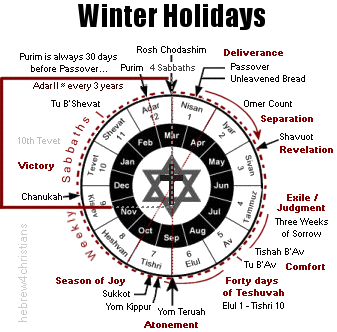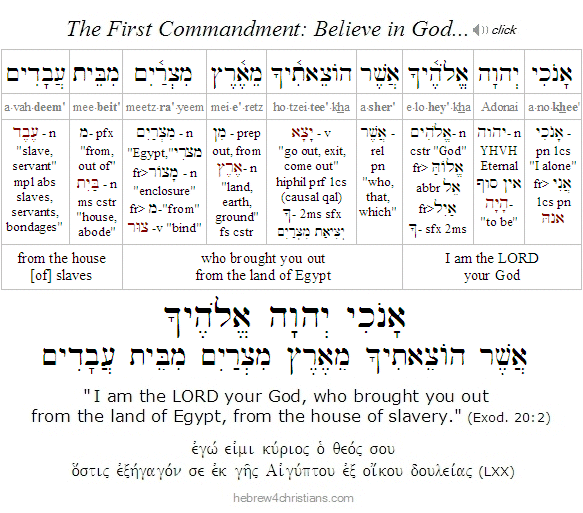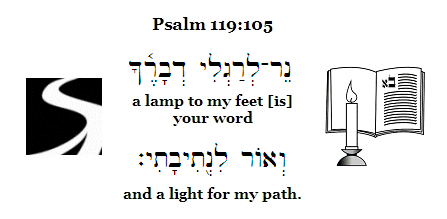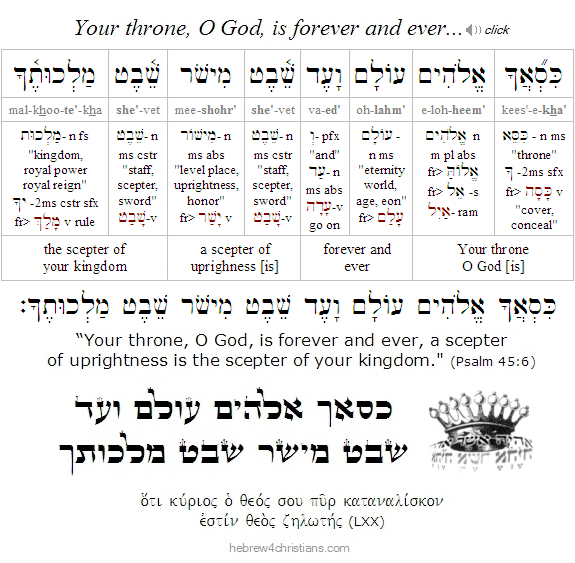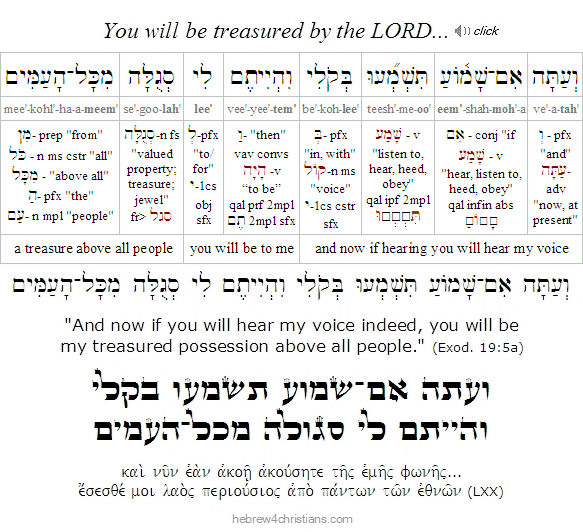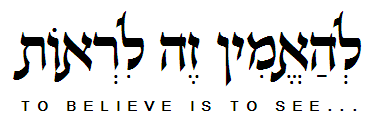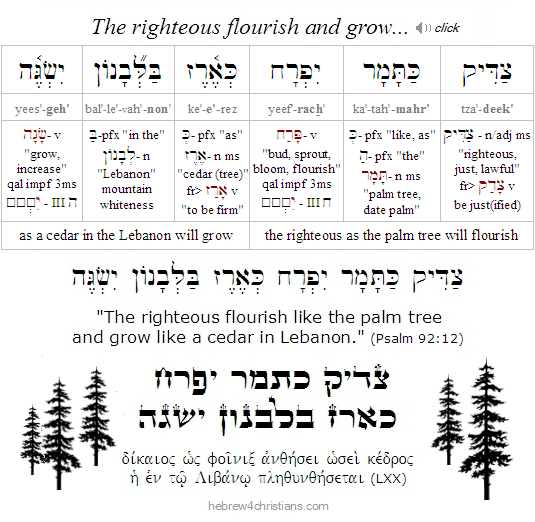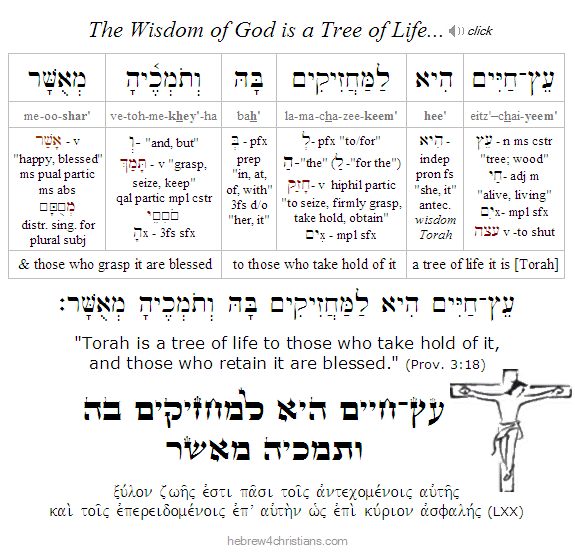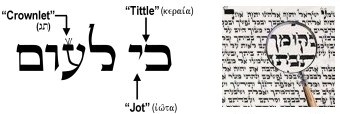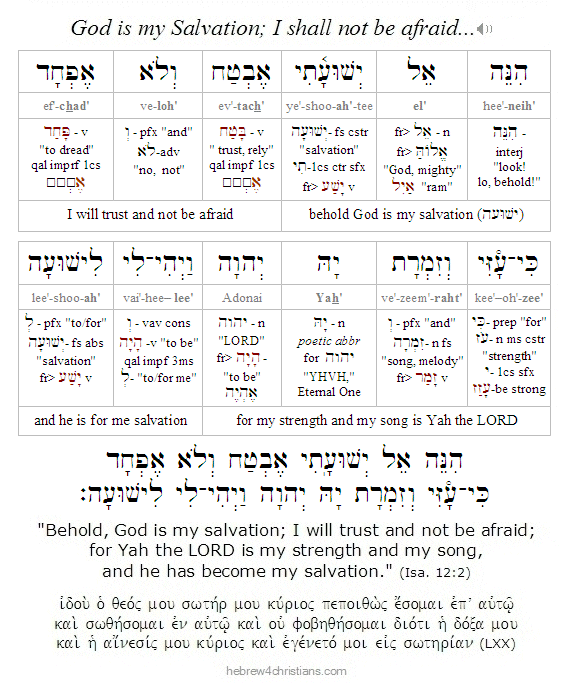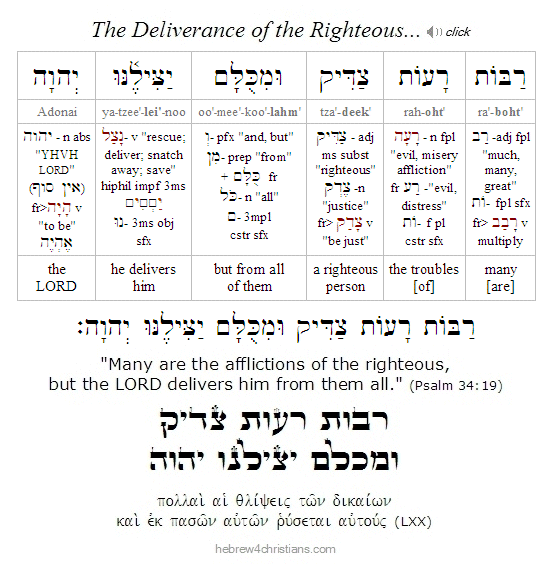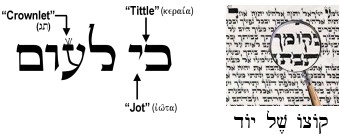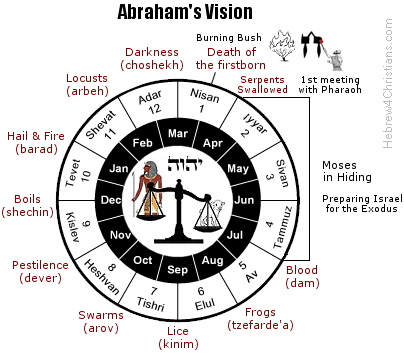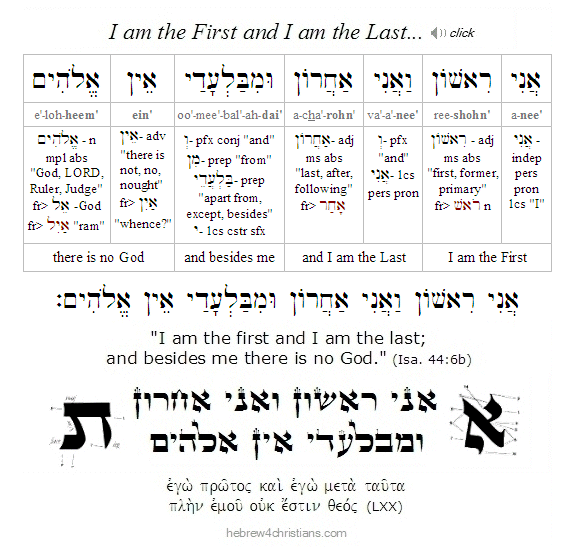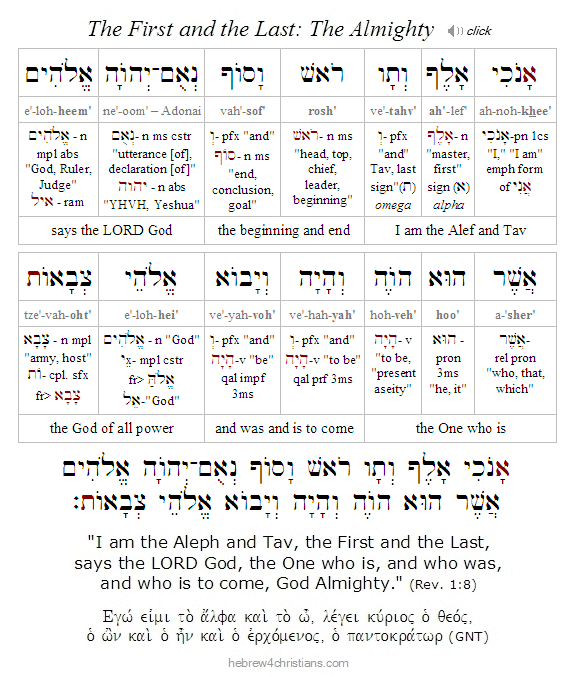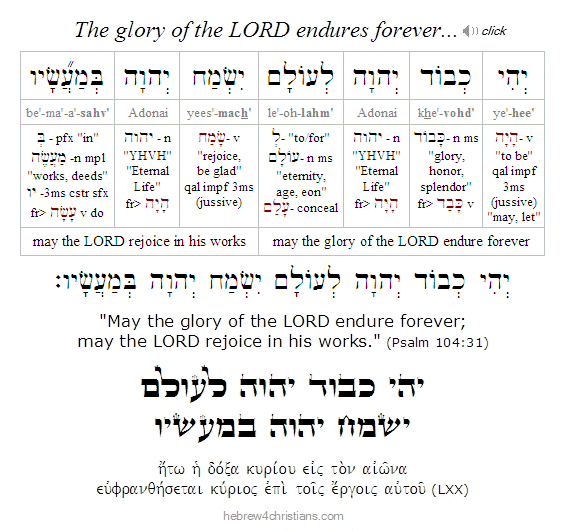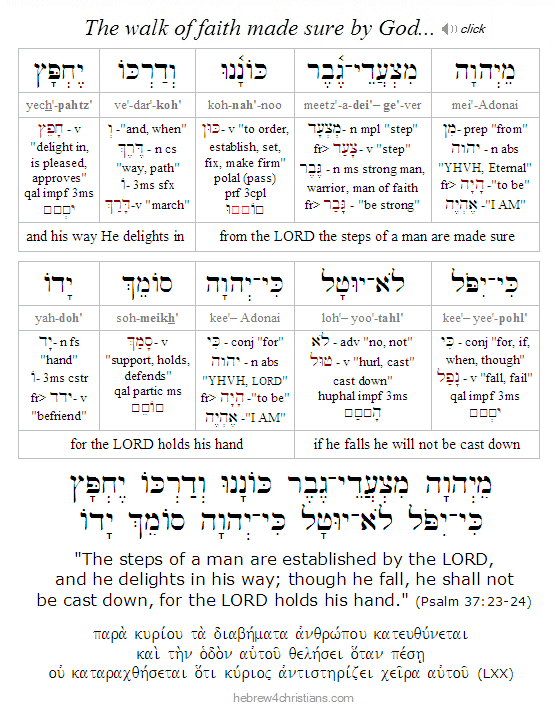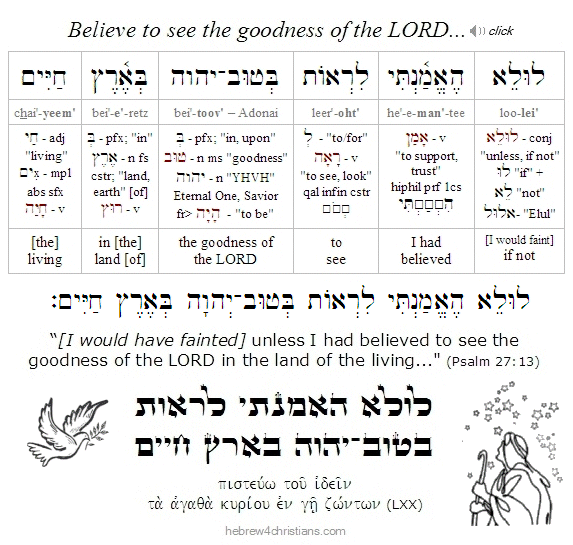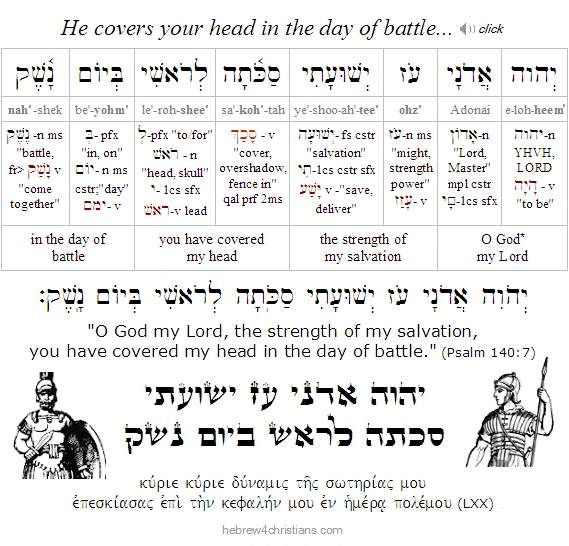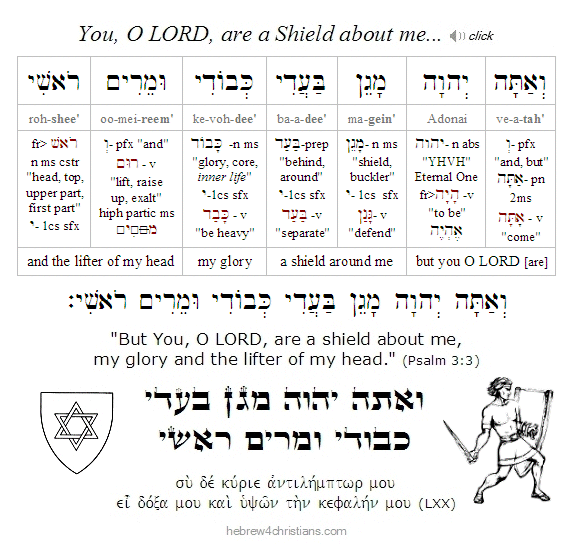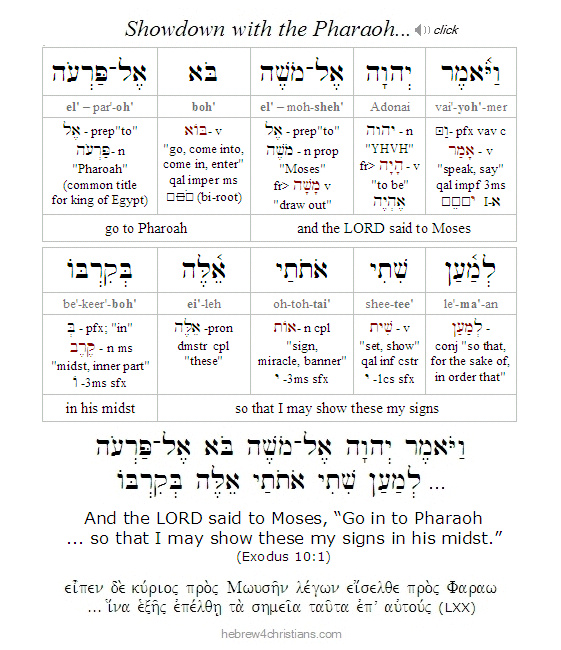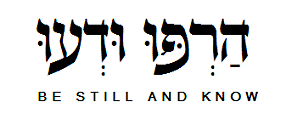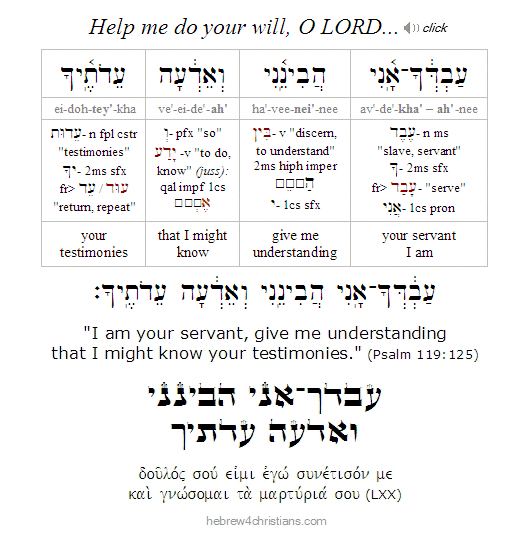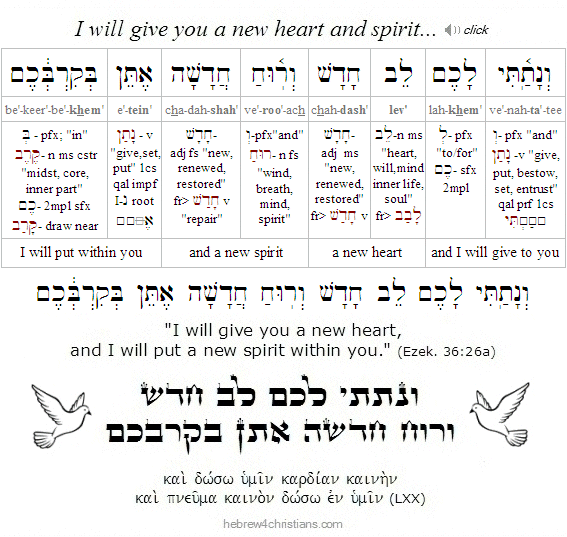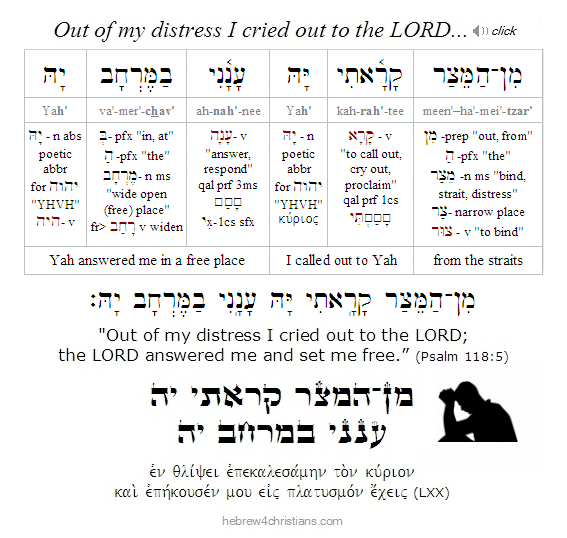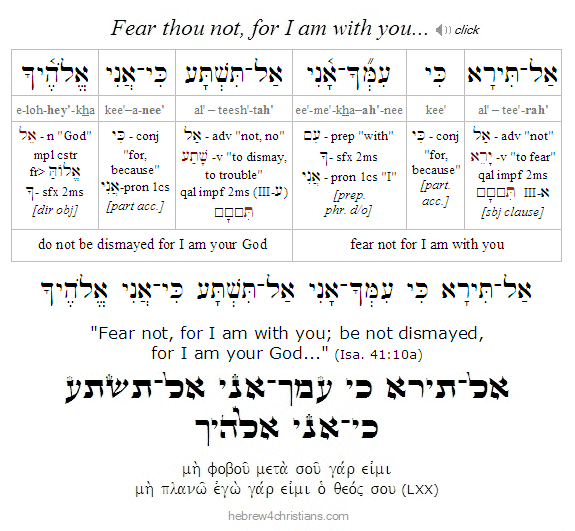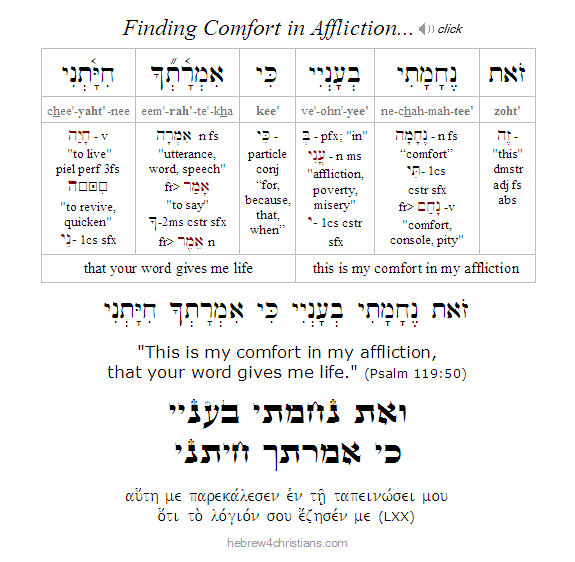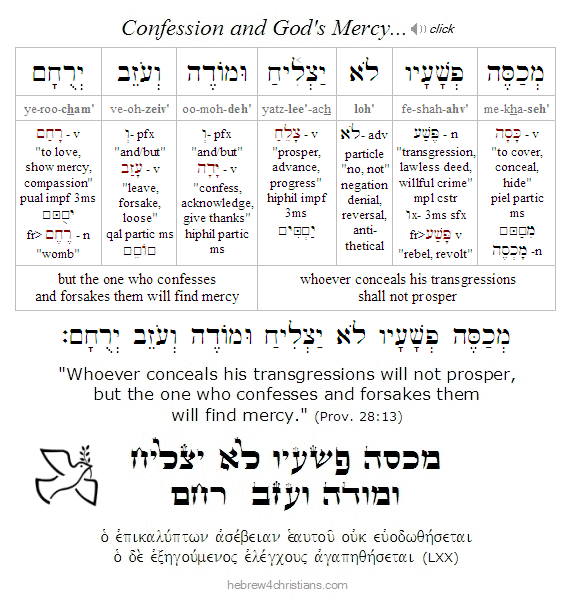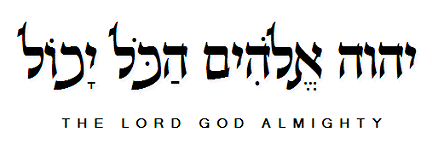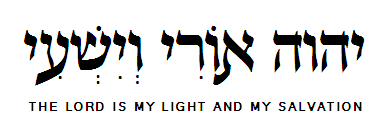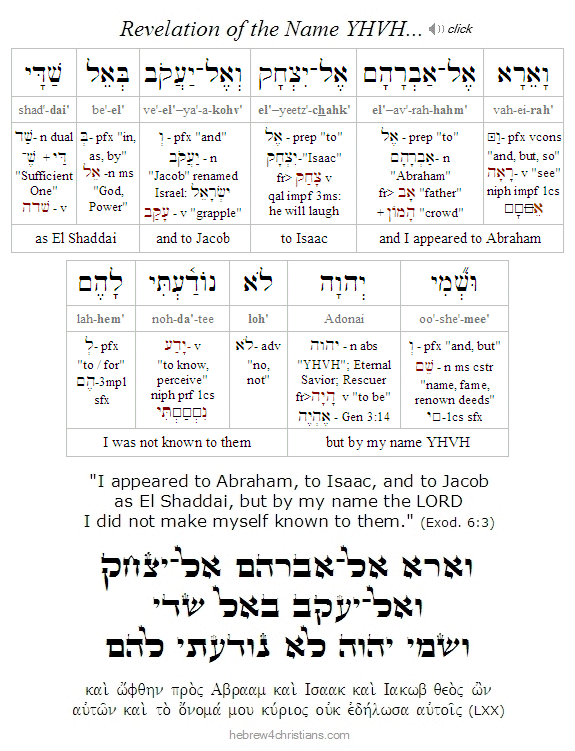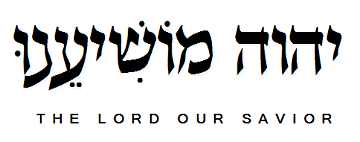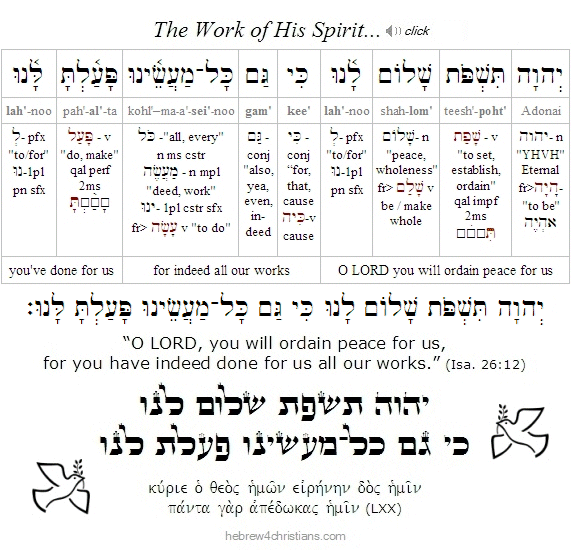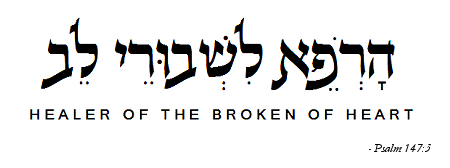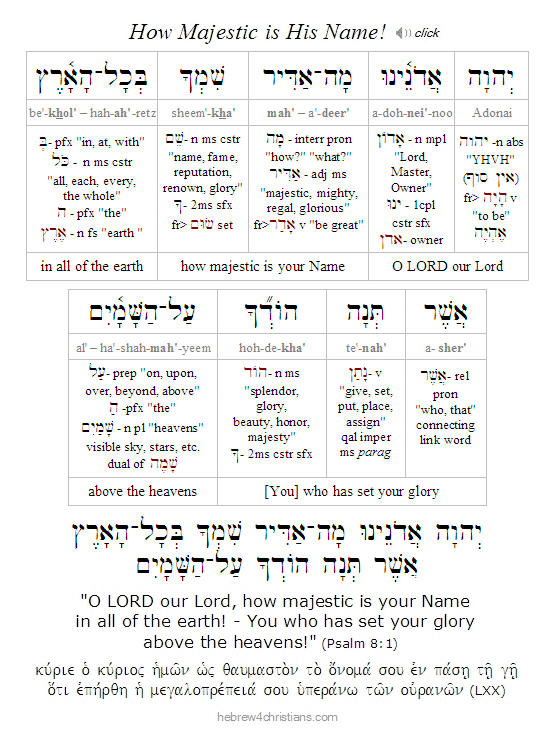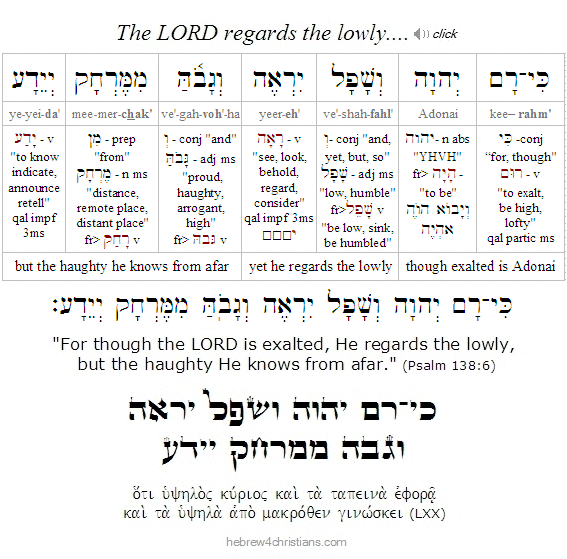|
Jewish Holiday Calendar
For January 2024 site updates, please scroll past this entry....
The winter holidays (חגי החורף) remember special times when God acted on behalf of His people so that they would triumph over their enemies, and therefore they prophetically picture the final victory in the world to come.
The Winter Holidays:
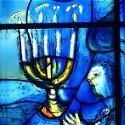
Note that in accordance with tradition, the following holiday dates begin at sundown:
- Month of Tevet (Tues. Dec. 12th [eve] - Wed. Jan. 10th [day])
- Four Sabbaths: Miketz, Vayigash, Vayechi, Shemot
- Dates for Chanukah (continued):
- 6th Chanukah candle: Teus. Dec. 12th [i.e., Kislev 30]
- 7th Chanukah candle: Wed. Dec. 13th [i.e., Tevet 1]
- 8th Chanukah candle: Thurs. Dec. 14th [Tevet 2] Zot Chanukah
- Winter Solstice: Wed. Dec. 21st (Tevet 9)
- Asarah B'Tevet - Thurs. Dec. 22nd (dawn), 2023; fast for Jerusalem
- Christmas - Mon. Dec. 25th (Tevet 13, 5784)
- Secular New Year: Mon. Jan. 1st, 2024 (Tevet 20, 5784)
- Month of Shevat (Wed. Jan. 10th [eve] - Thurs. Feb. 8th [day])
- Month of Adar I (Thurs. Feb. 8th [eve]) - Sat. March 9th [day])
- Month of Adar II (Sat. March 9th [eve]) - Mon. April 8th [day])
 |
Note: Some calendars will list the first day of a holiday without indicating that the holiday actually begins sundown the night before. For more information see the Calendar pages...
January 2024 Updates
Note: If any page content appears to be missing, please refresh the page...
Revelation and the Law...
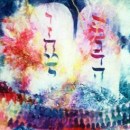
[ The following is related to Parashat Yitro and the giving of the Ten Commandments at Sinai...]
01.31.24 (Shevat 21, 5784) The climactic event of this week's Torah portion (Yitro) is of course the great revelation of God at Mount Sinai - a transformative experience in which the people heard the voice of the LORD (קוֹל יהוה) speaking directly to them. And while this awesome event marked the birth and commissioning of the nation of Israel at the time of the Exodus, it also serves as a parable for each sojourning soul. As it is said in the traditional Passover hagadah, "Dor va'dor: Each person in every generation must regard himself or herself as having been personally redeemed from Egypt" (Pesachim 116b).
For instance, in our "desert wanderings" today we may come upon a time of revelation as we begin to understand the truth of our connection to God who is the Source of our lives and of all that exists (1st Commandment). We then realize that God alone is our ultimate concern and our Deliverer, and our idols of heart and mind - those desires that attach us to vanity and illusions - are suddenly regarded as worthless (2nd Commandment). Like a moment of "satori," the fragments and shattered pieces of our lives come together into a vision of beauty and unity. We understand that the LORD is greater than all our conceptions and imaginations. We confess our limitations as we honor God and thank him for the miracle of life (3rd Commandment).
Continuing with the allegory, we let go of our daily cares and preoccupations to set apart time to reflect on what is sacred, beautiful, and true (4th Commandment). We reconnect with the gift of life and remember that we are all part of one another (5th Commandment), and therefore we cannot hurt others without thereby hurting ourselves (6th-8th Commandments). We realize that we are to respect and honor others, to use the "good eye," and to abhor any temptation to envy them or to say false things about them (9th Commandment). Instead of comparing ourselves to others, we affirm our connectedness before God. This enables us to let go of our inner turmoil that comes from a feeling of lack, since we understand that with God we have everything that really matters, and that we are therefore rich beyond all measure (10th Commandment).
This allegory (or parable) suggests that the commandments are not to be regarded as an external burden imposed upon the soul but rather a by-product or "out flowing" of revelation itself. To know God is to love him, and heartfelt faith in his love reveals the way to live. The pieces and fragments of life are resolved as we find shalom living before God's presence.
Our Torah portion offers guidance about how to prepare for revelation through the advice of Yitro, Moses' father-in-law, who counsels us to "make space" for God by letting go of our busyness and allowing others to help us carry our burdens. That was Yitro's advice concerning the establishing judges and leaders to help Moses fulfill his particular mission (Exod. 18:13-16). Yitro's wisdom is about finding balance and inner peace to become more receptive to God's presence. Moses was overrun and overwhelmed in his service to others, and it was essential for him to quiet his heart and pray. Yeshua did this often by getting alone with the Father (Mark 1:35; Luke 5:15-16; Luke 6:12; Matt. 14:13). Likewise the apostles were harried in their service and needed help from others so they could devote themselves to "prayer and the ministry of the word" (Acts 6:2-4). Each of us has needs for solitude, private prayer, quiet reflection, rest, experiencing nature, and so on.
This way at looking at the revelation at Sinai is helpful, since it discerns God's heart beneath the imperative language of the commandments, but of course the moral imperatives of the law are nevertheless the expression of God's will, and -- as we will see later in both parashat Bechukotai and Ki Tavo -- there are serious consequences for disregarding God's commandments, namely, the "curses of the law" and the "tochachah" judgments that result from disobedience. So we must qualify what has been said by noting that the law reveals both that we are guilty for breaking covenant with God and furthermore that we are powerless not to do so apart from the power of the Holy Spirit. And this is part of what Paul meant when he said that faith "establishes" the law in the book of Romans (Rom. 3:1).
The law reveals our sin and therefore our need for deliverance. It is acknowledgment both of the just verdict for our guilt and God's remedy given in Yeshua which restores us and enables us to fulfill the heart of the law by means of the agency of God's power and Spirit. The law is holy and just and good, but our sinful condition alienates us from God because we are in dread over judgment for our sins. The grace and truth of God, the "righteousness of God," is what saves us, not by nullifying the truth of the law but by reconciling that truth with the mercy and kindness of God embodied in the sacrificial life of Yeshua on our behalf (Psalm 85:10). Amen, the essence of the gospel is that "God made him who had no sin to be sin for us, so that in him we might become the righteousness of God" (2 Cor. 5:21).
Hebrew Lesson
Psalm 19:7 Hebrew reading:
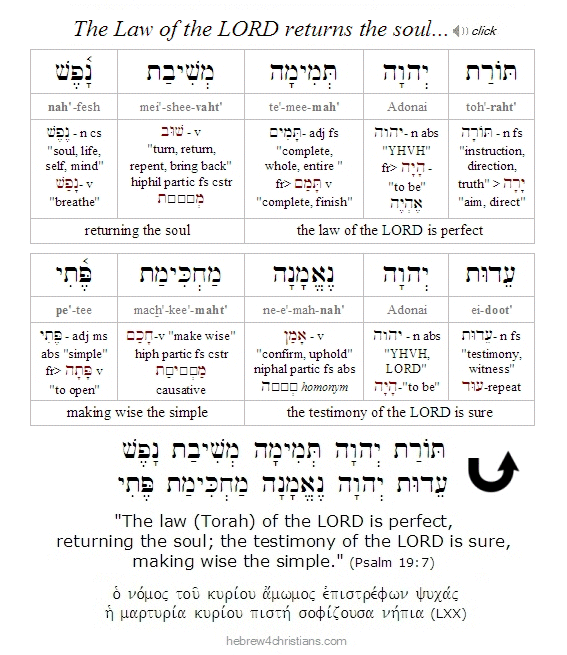 |
Respecting the gift of Life:
The Third Commandment...

[ The following is related to Parashat Yitro and the giving of the Ten Commandments at Sinai...]
01.31.24 (Shevat 21, 5784) The Third Commandment is "You shall not take the Name of the LORD your God in vain" (Exod. 20:7). This commandment implies that it is forbidden to invoke God's name for unholy or profane purposes, for example in jest or as a curse, though it further forbids using the truth of God as a means of harming or degrading other people. "Lifting up" God's name for selfish purposes is a violation of this commandment, and the commandment continues by gravely warning that "the LORD will not hold him guiltless who takes his name in vain." The sages have said that all the words of Torah together form the name of God, and if a single word or letter is missing from a Torah scroll it becomes unfit for use. This teaches that honoring God's word is therefore connected with honoring his Name, and conversely, dishonoring God's name expresses contempt for his word.
Hebrew Lesson
Exodus 20:7a Hebrew reading:
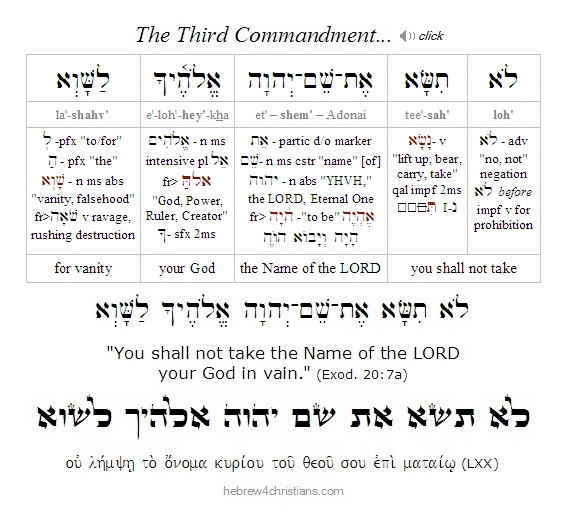 |
Affirmation: "Lord, you are worthy of all my praise; let your Name be magnified in my life."
Focusing on the highest:
The Second Commandment...
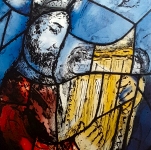
01.31.24 (Shevat 21, 5784) The Second Commandment, "You shall have no other gods before Me" (Exod. 20:3), implies individual accountability for your soul before the Creator of all reality. Pagan religions often believe in a supreme being but regard such as unknowable and distant and therefore they commonly appeal to divine "subordinates" (e.g., angels, other beings with godlike powers, etc.) to intervene on their behalf.
The second commandment teaches that there are no intermediate or subordinate beings to which we may appeal, since there is only one God who holds all power and authority in heaven and earth and we are each accountable directly to him. When we pray, then, we are not to venerate angels or saints or to appeal to God on behalf of intermediaries. We come boldly before the Throne of Grace to make our appeals personally before the Living God (Heb. 4:16). The second commandment implies monotheism with the implication that appealing to other gods (or god-like powers) is actually worship of demonic entities (see Deut. 32:17; 1 Cor. 10:20). We are to know that "the LORD is our God, the LORD alone," as the opening of the Shema proclaims: שׁמע ישׂראל יהוה אלהינו יהוה אחד (Deut. 6:4).
Hebrew Lesson
Exodus 20:3 Hebrew reading (click for audio):
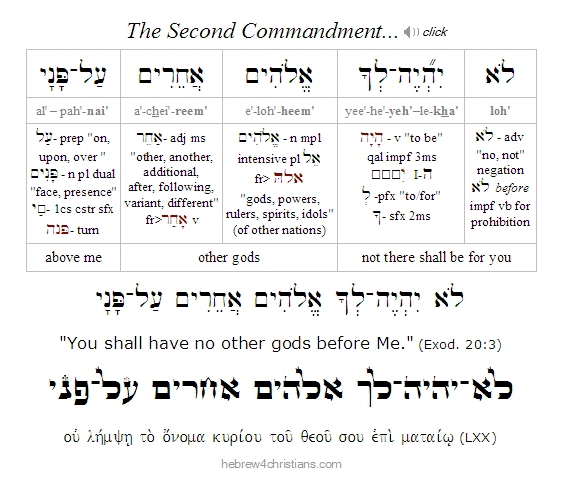 |
Affirmation: "O Lord, you are my greatest blessing and good; the treasure of my life."
Believing in God (emnuah):
The First Commandment...

[ The following is related to Parashat Yitro and the giving of the Ten Commandments at Sinai...]
01.30.24 (Shevat 20, 5784) Historically, Christian tradition has regarded the First Commandment (of the Ten Commandments) to be: "You shall have no other gods before me" (Exod. 20:3), though Jewish tradition regards the opening words, "I am the LORD your God (אנכי יהוה אלהיך) who brought you out of the land of Egypt, out of the house of slavery" (Exod. 20:2) to be the First Commandment -- and the foundation upon which all the other commandments are based.
Though the statement "I am the LORD your God..." is not an imperative, it nevertheless assumes that you will accept the truth of God's revelation, and therefore it might also be understood as the duty or commandment to accept the truth. "I am the LORD your God who brought you out..." refers to the saving acts of God performed on your behalf, and therefore the proper response is one of heartfelt gratitude.
After all, without faith in the truth that the LORD is your Redeemer who loves and chooses you, the subsequent commandments would be devoid of context and significance. Indeed all the subsequent commandments are grounded in the truth of God that is received by faith (Hab. 2:4), and therefore the first commandment is to have emunah, or faith in God. Moses ben Nachman interprets the First Commandment to know that God exists and to believe in him, which implies studying and exploring the greatness of the Creator and Savior.
Finally, note that connection between the First Commandment to accept the truth of God's reality and the Shema: שְׁמַע יִשְׂרָאֵ֑ל יְהוָה אֱלֹהֵינוּ יְהוָה אֶחָד - "Hear O Israel, the LORD is our God, the LORD alone!" (Deut. 6:4). Like the First Commandment, the Shema is a declaration that the LORD is your God alone, and everything follows from that realization.
Hebrew Lesson
Exodus 20:2 Hebrew reading (click for audio):
Affirmation: "You alone are my LORD and my God..."
A "New Covenant" at Sinai?
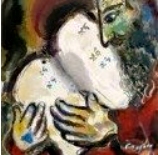
[ The following is related to this week's Torah reading, parashat Yitro... ]
01.30.24 (Shevat 20, 5784) In our Torah portion this week (Yitro), God revealed the Ten Commandments (i.e., עֲשֶׂרֶת הַדִבְּרוֹת, literally, "the ten declarations") to the Israelites at Sinai, a dramatic event that represented the giving of the law, or the "Old Covenant," to Israel. Now while a case can surely be made that the revelation at Sinai represented an "older covenant" (see 2 Cor. 3:14; Heb. 7:18, 8:6,13, and here), when looked at from another perspective, Sinai actually represented a sort of new covenant, since it was given later and served as a proviso to the covenant given earlier to Abraham (Gal. 3:18).
As we will see next week, the culmination of the covenant at Sinai was the revelation of the Altar (i.e., the Tabernacle), which pictured the sacrificial blood "covering" the tablets of God's judgment. This, in turn, recalled Abraham's great sacrifice of his son Isaac (the Akedah), which further recalled the very first sacrifice of the Bible, namely the lamb slain in the orchard of Eden to cover the shame of Adam and Eve's sin (Gen. 3:21; Rev. 13:8). Therefore it was the promise God made to Eve regarding the "Seed to Come" that was the original covenant (Gen. 3:15), and it was this covenant that was later fulfilled by Yeshua, the "Serpent Slayer" of God (Num. 21:9; John 3:14). This is the "Gospel in the Garden" message, the original promise of the lamb of God that was slain from the foundation of the world... In other words, the "new covenant" (בְּרִית חֲדָשָׁה) may better be understood as the fulfillment of the original covenant, the promise to redeem all of humanity from the curse of sin and death. The redemptive plan of God therefore moves in an ascending circle. The "Tree of Life" (עץ החיים) reaches back to the primordial orchard of Eden and extends into the World to Come...
Because there is so much confusion regarding the topic of the role of the law, particularly among certain "Messianic believers," I would like to reiterate a few things mentioned elsewhere on this site. Let me first remind you that the legal aspect of the "Torah" refers to the subset of the written Torah called Sefer Ha-Brit (סֵפֶר הַבְּרִית), a portion that defined various ethical, social, and ritual obligations given at Sinai (Exod. 24:7-8). It is a "category mistake" to simply regard the first five books of the "Torah" as the "law," since the law was given later in sacred history, after the Exodus. Moreover, the Book of Genesis reveals that the very first "priest" (i.e., kohen: כּהֵן) was neither a Jew nor a Levite nor a descendant of Aaron, but rather Someone who is said to have "neither beginning of days nor end of life" but is made like (ἀφωμοιωμένος) the Son of God, a priest continually (Heb. 7:3). This priest, of course, was Malki-Tzedek (מַלְכִּי־צֶדֶק), the King of Salem (מֶלֶךְ שָׁלֵם) to whom Abraham offered tithes after his victory over the kings (Gen. 14:18). The author of the Book of Hebrews makes the point that the priesthood of Malki-Tzedek is greater than the Levitical priesthood and is therefore superior to the rites and services of the Tabernacle (Heb. 7:9-11). It was to Malki-Tzedek that Abram (and by extension, the Levitical system instituted by his descendant Moses) gave tithes and homage -- and rightly so, since Yeshua is the great High Priest of the better covenant based on better promises (Heb. 8:6). As the Scriptures teach, in everything Messiah has preeminence (John 5:39; Luke 24:27; Col. 1:18).
Hebrew Lesson
Genesis 14:19b Hebrew reading:
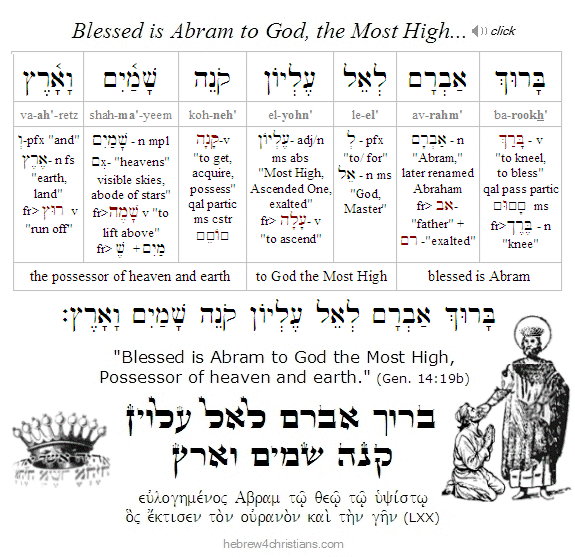 |
The Unchosen Chosen...
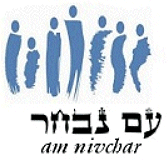
01.30.24 (Shevat 20, 5784) There is an old story (midrash) that says that before God offered the Torah to the children of Israel, He first asked the other nations if they wanted it. God did this so that the nations wouldn't be able to claim that they would have accepted the Torah if only they had been asked. So God first asked the children of Esau. "What's in the Torah?" they asked. "You shall not murder," God replied. "Well, we could never accept that," they admitted. "Isaac's blessing to Esau said that we would live by our swords (Gen. 27:40), so how could we stop doing that?" And so they refused to accept the Torah. God then went to ask the children of Ishmael. "What's in it?" they asked. "You must not steal," God answered. "Well, we could never accept a Torah like that, since we make our living by stealing," they admitted. So God decided to ask each of the 70 nations whether they would accept the Torah, but each refused it for one reason or another. Finally God came to the Israelites. "Do you want my Torah?" He asked them. "Of course we want the Torah," they replied -- without even asking what was required of them. kol asher diber Adonai na'aseh ("all that the LORD has spoken, we shall do"). So God gave the Torah to the children of Israel!
We might wonder if this midrash wasn't developed to defend against the charge by various anti-Semites that the Jewish people are ethnocentric, elitist, etc. After all, from a strictly "egalitarian" point of view it seems somewhat scandalous to suggest that God would exclusively choose one group of people at the expense of others.... And perhaps this would be offensive if, like aristocrats who live with a sense of inborn entitlement, the "chosen ones" believed they were chosen for the sake of their own self-importance....
But this is certainly not what Torah means by "chosenness" at all. On the contrary, being a Jew (i.e., yehudi: יְהוּדִי) means that you have been "chosen" to take on additional responsibilities to live in holiness for the glory of God and for the welfare of the world. Therefore a true Jew (יהודי אמיתי) takes the role of being a both a mediator (i.e., "priest") and an ambassador for the LORD God. The performance of various mitzvot are for the greater purpose of tikkun olam (תיקון עולם), or the "repair of the world." After all, Israel was always meant to be a "light to the nations" (אור לגויים) just as followers of Yeshua, the King of the Jews, are intended to reveal God's light of salvation (Matt. 5:16). God's greater plan was for all the families of the earth to come to know Him and give Him glory, as Abraham was called: Av hamon goyim (אַב הֲמוֹן גּוֹיִם), the father of a multitude of nations (Gen. 17:4; Rom. 4:16). "Jewishness" is therefore not an end in itself but rather a means to bring healing truth to the nations... Indeed, the entire redemptive story of the Scriptures is about the cosmic conflict to deliver humanity from the "curse" of death by means of the "Seed of the woman" who would come. As the Apostle Paul clearly affirmed, any talk of genetics, bloodlines, lineage, and so on are a means to this greater redemptive end (Phil. 3:2-9).
In fact, a chosen person is not selected on the basis of their genetics or family lineage, but solely from the personal call and election of God. "For not all who are descended from Israel belong to Israel, and not all are children of Abraham because they are his offspring, but "through Isaac shall your offspring be named." This means that it is not the children of the flesh who are the children of God, but the children of the promise are counted as offspring" (see Rom. 9:6-8). The idea of "chosenness" therefore is independent of considerations of "flesh" but is directly related to our response to God's promises.... This was true of "Israel at large" in relation to its faithful subset called she'arit Yisrael (i.e., the faithful remnant), just as it is true of those who trust the promise of life in Yeshua the Messiah (John 15:16).
Hebrew Lesson
Isaiah 60:3 Hebrew reading:
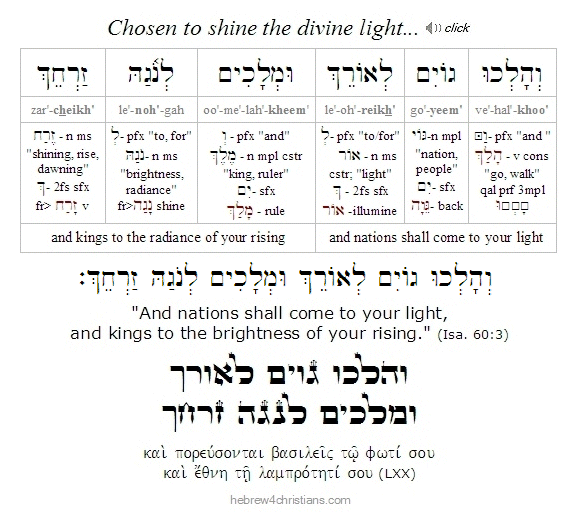 |
Therefore the Apostle Peter refers to followers of Yeshua as "a chosen race (עַם נִבְחָר), a royal priesthood, a holy nation, a people for his own possession" (1 Pet. 2:9, cp. Exod. 19:6, Deut. 7:6). This refers to both Jews and Gentiles who receive Yeshua as their Savior, since he adds: "Once you were not a people (לֹא־עַמִּי אַתֶּם), but now you are children of God (בְּנֵי אֵל־חָי)" (1 Pet. 2:9-10; Hos. 1:10). Likewise the Apostle Paul understands Christians to be "chosen people" (Eph. 1:4; 2 Thess. 2:13). All true Christians are be'kehunat Mashiach - in the priesthood of Messiah Yeshua and therefore have direct access to God. This priestly lineage began with Malki-Tzedek (Melchizedek), culminated in Yeshua, and is passed directly to the believer by means of his or her justification and identification with the Lord, "who gave himself for us, that he might redeem us from all iniquity, and purify unto himself a 'peculiar people' (i.e., am segulah: עַם סְגֻלָּה), zealous of good works" (Titus 2:14).
Within certain (bad) sects of Messianic Judaism, non-Jewish believers are regarded as "second-class" members in the family of God. Such believers often tend to be self-deprecatory, referring to themselves as "wild olive shoots," "Gentile believers," or even "righteous converts" (i.e., zerim tzedakim: זרים צדיקים). This is unfortunate, since it robs these beloved souls of their Messiah-given identity as co-heirs of the Kingdom (Gal. 3:9; Titus 3:7), and it also destroys the unity that Yeshua sought to bring among all of God's people (John 17:20-23; Eph. 2:14-15).
While it is true that ancient Israel was stratified by various classes of people (priests, Levites, Israelites, women, converts, slaves, etc.), it is clear that Yeshua did not come to create a "caste system" among His followers. On the contrary, Yeshua turned the established order upside-down by saying that the "greatest would be the slave of all" (Mark 10:44; Matt. 18:1-4, Matt. 20:25-28). Whoever would be great in the Kingdom must humble himself and walk hatzne'a lechet - in childlike simplicity before the Lord (Micah 6:8). Yeshua transposed the all-too-human view of social relationships by inverting the "natural" order. Do you "seek great things for thyself"? Then take hold of your absolute nothingness before the LORD and serve your fellow man with a pure heart (Jer. 45:5).
וְאַתָּה תְּבַקֶּשׁ־לְךָ גְדלוֹת אַל־תְּבַקֵּשׁ
כִּי הִנְנִי מֵבִיא רָעָה עַל־כָּל־בָּשָׂר נְאֻם־יְהוָה
וְנָתַתִּי לְךָ אֶת־נַפְשְׁךָ לְשָׁלָל
עַל כָּל־הַמְּקמוֹת אֲשֶׁר תֵּלֶךְ־שָׁם
ve·a·tah · te·va·kesh-le·kha · ge·do·loht? · al · te·va·keish!
kee · hee·ne·nee · mei·vee · ra'·ah · al-kol-ba·sar · ne·oom · Adonai
ve·na·ta'·tee · le·kha · et · naf·she·kha · le·sha·lal
al · kol-ha·me·ko·moht · a·sher · tei·lekh'-sham

"Do you seek great things for yourself? Seek them not,
for behold, I will bring distress upon all flesh, says the LORD.
But your life I will give to you as a prize in all places wherever you go." (Jer. 45:5)
The Apostle Paul - the assuredly the greatest Torah sage of the Second Temple period - taught that in the Messiah there "is neither Jew nor Greek, slave nor free, male nor female" since we are all one (echad) in the Messiah (Gal. 3:28). But what does this mean? Despite the egalitarian ideal, don't we use these very distinctions to this day? On a fleshly or carnal level we certainly do. After all, we clearly distinguish between men and women, rich and poor, and various ethnic identities. This is a de facto way people see and understand. We all live with such distinctions in the world of basar - the carnal world that is known through sensuous apprehension. However, "from now on we regard no one according to the flesh" (2 Cor 5:16) but we aim to understand, with the help of God, that a follower of Yeshua is briah chadashah - a "new creation." Together we are ish-echad chadash ("one new man"), ke'ish echad, be'lev echad - "like a single person with a single heart."
Again, God is no "respecter of persons" (Acts 10:34, Rom. 2:11). He is able to make the unclean clean (Acts 10:28) and to regard those who were once called "Not My People" as "My People" (Hosea 2:23, Matt. 3:9). Therefore a true Jew is one who is circumcised inwardly, someone who has undergone spiritual brit millah - "covenant of the word" (Deut 10:16, 30:6; Rom. 2:28-29, 1 Cor. 7:19, Gal. 5:6; 6:15; Phil. 3:3, Col. 2:11, etc.). Indeed, Paul insisted that any merit obtained either through his pedigree or his adherence to the moral law code is accounted as less than nothing (i.e., σκύβαλα) in comparison to the imputed righteousness given by means of his relationship with Yeshua (Phil. 3:3-8).
So, dear Christian, is it correct to call yourself a "Gentile" believer in Yeshua? Is that an adequate label to describe your identity in Him?
Regardless of your ethnic background, then, or your gender, or your social status in this world, know that you are am segulah (עַם סְגֻלָּה), precious and elect, and part of the family of God. You are Kohanim l'El Elyon - priests of the Most High God - "living stones being built up as a spiritual house, to be a holy priesthood, to offer spiritual sacrifices acceptable to God through Yeshua the Messiah" (1 Pet. 2:5). Amen. Your heritage is the God of Israel.
Hebrew Lesson
Deut. 7:6b Hebrew reading:
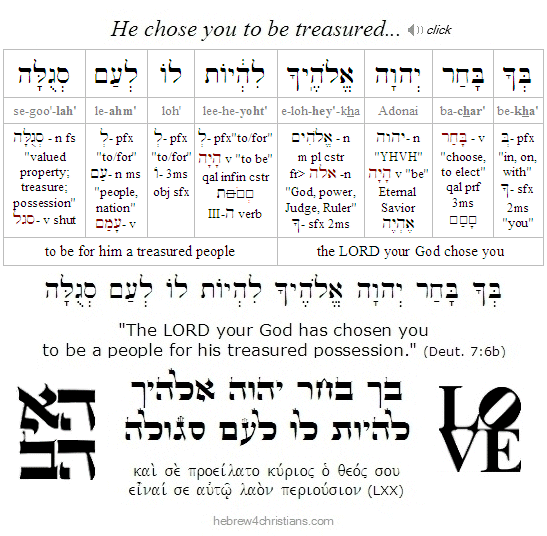 |
Note: I'm trying to get you interested in themes of this week's Torah portion, parashat Yitro, because it is an absolutely essential section of Scripture for us as followers of Yeshua. After all, what would we know of sin and atonement apart from the giving of the law at Sinai? How would we understand the meaning of the cross of Yeshua apart from revelation of the altar and the sacrificial system given to Moses?
I realize some of the parashah topics are a bit "involved," but if we do not take time to study and engage these Scriptures, we are likely to miss the deeper significance of the New Testament as well. As Yeshua said: "Therefore every teacher of the Torah who has been trained for the kingdom of heaven is like the owner of a house who brings out of his treasure what is new and old" (Matt. 13:52).
What is the Torah?

01.29.24 (Shevat 19, 5784) Shalom chaverim. Since this week we read parashat Yitro and the great event of "mattan Torah" (מתן תורה), or the giving of the Torah at Mount Sinai, it is fitting for us to ask once again what the Torah is. Now some people may think Torah refers to the tablets with the Ten Commandments written on them or perhaps to a scroll that contains the collected writings of Moses, and while both of these ideas point to what the Torah physically is, in Jewish thinking the more interesting question is what does Torah mean? What role does it play in our lives and how are we to understand it?
As many of you know, the Hebrew word Torah (תּוֹרָה) comes from the root word yarah (יָרָה) meaning "to shoot an arrow" or "to hit the mark." When used in relation to moral and spiritual truth, the word means "direction" or "instruction" regarding doing the will of God. Practically speaking, however, Torah refers to the apprehension of divine wisdom (חָכְמָה), that is, upright thinking and doing as directed by divine imperatives (mitzvot: מִצְווֹת) revealed in the holy Scriptures and practiced through sanctified discipline (mussar: מוּסָר).
The sages note that are two basic categories of commandments: mitzvot aseh (מִצְוֹת עֲשֵׂה), or positive directives ("thou shalt..."), and mitzvot lo ta'aseh (מִצְוֹת לא תַעֲשֵׂה), or negative directives ("thou shalt not..."). A positive commandment is obligation to do something, whereas a negative commandment is an obligation to refrain from doing something.
The Jewish Scriptures are filled with directives intended to awaken us to the reality of God's immanent Presence. Da lifnei mi attah omed (דַּע לִפְנֵי מִי אַתָּה עוֹמֵד) - "Know before Whom you stand." There are 613 commandments given in the Torah of Moses, hundreds more found in the Writings (הַכְּתוּבִים) and the Prophets (הַנְּבִיאִים), and over a thousand revealed in the New Testament (הַבְּרִית הַחֲדָשָׁה). All of these imperatives are intended to give voice to the concern and love of God by pointing to the blessing of knowing the Divine Presence in the midst of our daily lives. Torah teaches us to make choices according to the divine light revealed in Scripture. Godly wisdom is grounded in the fear (i.e., respect) for the gift of life that will be expressed through the discernment between the sacred and the profane, good and evil, right and wrong, in our daily lives. This is called yirat shamayim (יראת שמים).
Hebrew Lesson
Prov. 9:10 Hebrew reading:
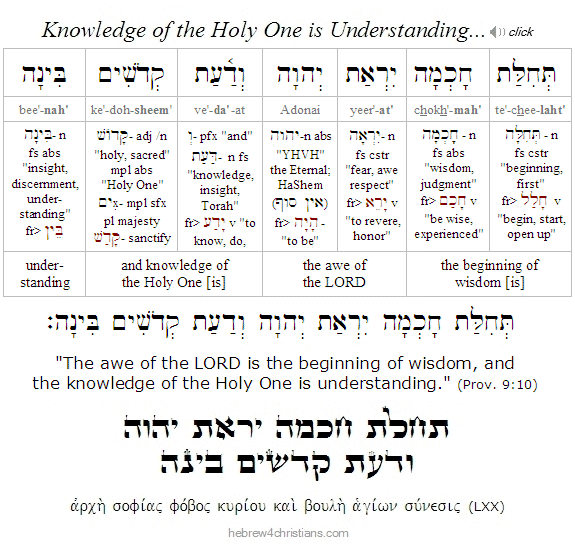 |
In Jewish thought, the word "Torah" (תּוֹרָה) is a general concept that implies a wide range of related ideas and concepts that focus on discerning God's will. A primary distinction is between the written Torah, on the one hand, and the oral Torah on the other. The written Torah, called she'bichtav (שֶׁבִּכְתָב, "that which is written"), refers to the text that has been meticulously transmitted since the time of Moses in the form of a Sefer Torah (i.e., a kosher Torah scroll). The oral Torah, on the other hand, is called shebal peh (שֶׁבְּעַל פֶּה, "that which is oral"), and refers to legal and interpretative traditions handed down by word of mouth until these were codified in the Mishnah and Gemara (i.e., the Talmud). The Oral tradition further includes the Midrash (traditional exegesis), the Responsa (questions and answers given by "poskim," or legal scholars), the Shulchan Aruch (16th century codification of Jewish case law), and various other commentaries handed down over the centuries. Some people also say that Kabbalah (קַבָּלָה), or the text of the Zohar (זֹהַר), is also oral tradition, though strictly speaking it is not regarded as part of the Oral Torah as understood in Jewish tradition.
Jewish thought or "hashkafah" (השקפה) further maintains that the written Torah and the oral Torah are complementary, since Moses himself (inspired by Yitro) established the role of judges and law courts as part of the written Torah from the very beginning (see Exod. 18:13-26; Num. 11:24-29; Deut. 16:18-20; 17:8-12), and ultimately the oral Torah derives its justification and substance from the written revelation. Indeed it is somewhat artificial to distinguish between the two in practice, since the written Torah was preserved through tradition (i.e., the scribal transmission, the books to be included in the canon, etc.), just as the oral Torah was validated by the written words of the Torah scroll itself.
In short, there is a sort of "circular reasoning" involved in the traditional Jewish idea of Torah: The written Torah was passed down (validated) by means of the oral Torah; but the oral Torah derives its authority from the written Torah:
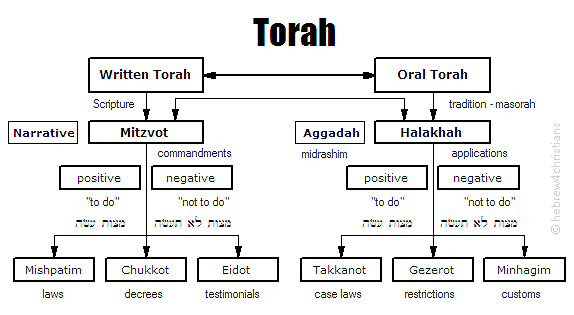 |
Interestingly enough, Jewish tradition seems to go two ways with the idea that Torah can be explicated by means of halakhah. On the one hand, it carefully enumerates every nuance of each of the various commandments of the Torah, creates various takkanot (case laws) and even multiplies the Torah's principles by building "fences" (i.e., gezerot) around the commandments, yet on the other hand it can (and does) distill the various commandments of the written Torah to more general principles that are fewer and fewer in number. For example, in Makkot 23b-24a the discussion goes from an enumeration of the 613 commandments identified in the Torah, to David's reduction of the number to 11 (Psalm 15), to Isaiah's reduction of the number to six (Isaiah 33:15-16); to Micah's reduction to three (Micah 6:8); to Isaiah's further reduction to two (Isaiah 56:1); ultimately leading to the one essential commandment spoken by the prophet Habakkuk ("The righteous shall live by his faith" - Habakkuk 2:4). Obviously the Apostle Paul distilled the various mitzvot to this selfsame principle of faith (see Rom. 1:17, Gal. 3:11, Heb. 10:38).
Now Yeshua was "the Voice of the Living God (קוֹל אֱלהִים חַיִּים) speaking (davar) from the midst of the fire" at Sinai (Deut. 5:26), and therefore He is the Divine Lawgiver (מְחוֹקֵק) of mankind. As the Ruler of Israel (ריבון ישראל), Yeshua reiterated and amplified the axioms of the Ten Commandments in the Sermon on the Mount, emphasizing that they were not merely external rules of conduct but matters of the heart... In this connection is important to make the distinction between the general idea of Torah (תּוֹרָה) with the more specific idea of covenant (בְּרִית), since these are different (though related) things.
While the Hebrew word "Torah" means "instruction" or "teaching," the word "covenant" refers a specific agreement or "contract" made between God and man. In order to avoid potential confusion between the Torah of Moses (תּוֹרַת משֶׁה) and the Torah of Yeshua (תּוֹרַת הַמָּשִׁיחַ), then, we must keep in mind that Torah is always a function of the underlying covenant of which it is part. This implies that if the covenant were to change, so would our responsibility (i.e., Torah). As it is written in the New Testament: "For when there is a change (μετατιθεμένης) in the priesthood, there is necessarily a change in the law as well" (Heb. 7:12). Now the word translated "change" in this verse comes from the verb μετατίθημι (from meta, "after" + tithemi, to "set") which might better be translated as "transposed." The idea is the priesthood reverted to the original Malki-Tzedek priesthood of Zion and therefore required a corresponding "transfer" of authority (μετάθεσις) to the original kingship as well. Yeshua alone is both High Priest and King... The failure to make this distinction leads to exegetical errors and invalid doctrines. We must "rightly divide" (ὀρθοτομέω, lit. "cut straight") the "word of truth" (דְּבַר הָאֱמֶת, see 2 Tim. 2:15).
Note: This article continues here -- or you can visit the H4C Substack page here.
These are the words...
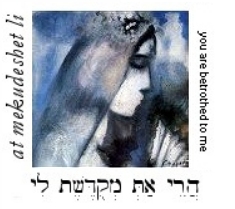
[ The following is related to Parashat Yitro and the giving of the Torah at Sinai...]
01.29.24 (Shevat 19, 5784) From our Torah portion this week (i.e., parashat Yitro) we read words of great promise and comfort as the LORD "proposed" betrothal with his redeemed people: "You shall be for me a treasured people; you shall be children of the King; you shall be priests who will help others draw near to God... these are the words (אֵלֶּה הַדְּבָרִים) that you (Moses) shall speak (to the people)" (Exod. 19:5-6).
These are the words of love God speaks forth and which evoke the antiphon: "And you shall love the LORD your God with all your heart, with all your soul, with all your substance. Set these words (הַדְּבָרִים הָאֵלֶּה), which I command you this day, upon your heart" (Deut. 6:5-6).
We store up these words so that, in a holy moment, they are quickened within us and we are able to hear the Voice of the LORD speaking from the midst of the fire that burns within our hearts. As Simone Weil said, "love is revelation, and revelation comes only with love."
Hebrew Lesson
Exodus 19:6 Hebrew reading:
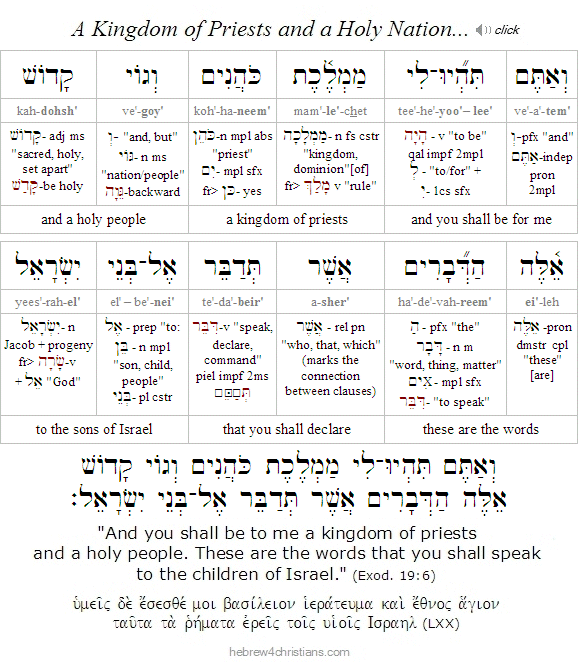 |
The Shortest Psalm...
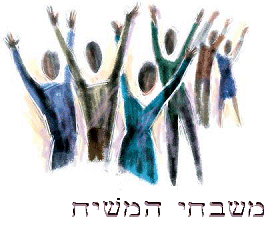
01.29.24 (Shevat 19, 5784) The shortest Psalm in Sefer Tehillim, "the Book of Psalms," is Psalm 117, which is part of the "Hallel" (or "praise") collection of six psalms (113-118) that are traditionally recited in celebration of the Passover and the Exodus from Egypt (for this reason the rabbis sometimes call the collection the "Egyptian Hallel"). They are also often recited on Rosh Chodesh and during morning services on other holidays.
The Apostle Paul referred to Psalm 117 in Romans chapter 15, when he appealed for unity and love between Jewish and Gentile believers: "For I tell you that Messiah became a minister to the circumcised to show God's faithfulness, in order to confirm the promises given to the patriarchs, and that the Gentiles might glorify God for His mercy, as it is written: "For this reason I will confess to You among the Gentiles, and sing to Your name." And again he says: "Rejoice, O Gentiles with His people!" and yet again: "Praise the LORD, all you nations! Extol Him, all you peoples!" (Rom. 15:5-12). Paul wrote this to indicate that while Yeshua is the glory of his people Israel, the called out of the nations are made co-heirs of the covenants and the promises of the LORD (Gal. 3:29; Eph. 3:6). Hallelujah!
I have included the entire Psalm below for those of you studying Hebrew. You can download the PDF file if that's easier for you to read or study. This is an easy Psalm to learn and it has a superlatively good message, too! His merciful kindness is great toward us, and his truth endures forever! Amen.
Hebrew Lesson
Psalm 117 reading (click for audio):
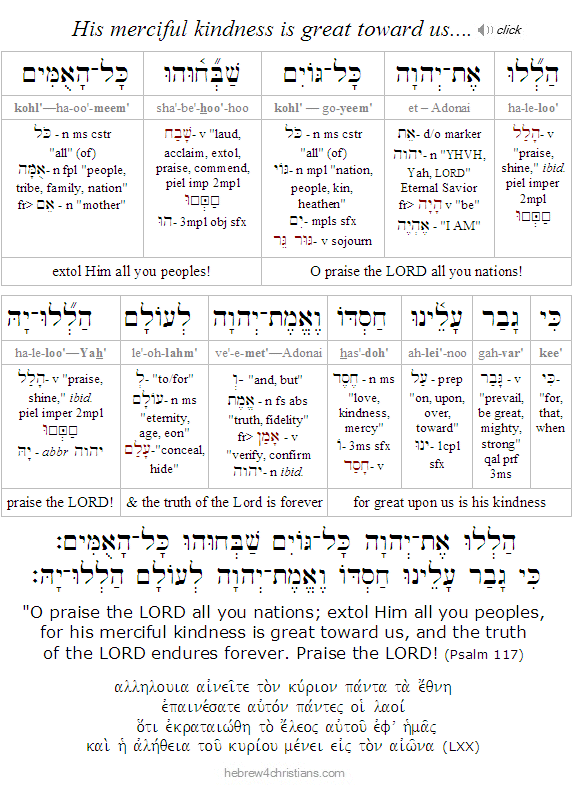 |
The Reign of His Spirit...
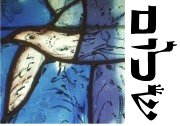
01.29.24 (Shevat 19, 5784) Yeshua told his followers that the Kingdom of God (i.e., mamlekhet Adonai: ממלכת יהוה) is "within you" (Luke 17:21). This teaches us that the reign of the Spirit is not to be found "out there," nor is the kingdom to be regarded as a political structure of this world, but is realized in spiritual relationship - namely, in communion between the LORD God with your heart and your heart with the LORD God...
When we learn to believe clearly, yielding to the rule of God's heart, Yeshua says we experience the divine Presence within and among ourselves. As we turn to God, we understand that who we are is more vital than our outer appearance and contingent circumstances, and even more important still is who we are in relation to the will and blessing of our heavenly Father. Life in the kingdom means having a new identity, being a new creation (בְּרִיָּה חֲדָשָׁה), and that changes everything (2 Cor. 5:16-17).
Hebrew Lesson
Psalm 45:6 Hebrew reading:
Parashat Yitro - יתרו

[ This week's Torah reading (Yitro) includes the account of the giving of the Torah at Sinai... ]
01.28.24 (Shevat 18, 5784) Last week's Torah portion (i.e., Beshalach) recounted how the LORD delivered the children of Israel from Pharaoh's advancing armies by dramatically drowning them in the Sea of Reeds. The Israelites were overjoyed over their new freedom and celebrated by singing the "Song of the Sea." Despite their newfound freedom, however, the people soon began complaining about the hardship of life in the desert. Nonetheless God was gracious and provided fresh water and manna from heaven as he led them by the Pillar of Cloud by day and the Pillar of Fire by night to Mount Sinai (Exod. 13:21-22).
In our Torah portion for this week, parashat Yitro, Moses' remarkable father-in-law Jethro (i.e., "Yitro") heard how God delivered Israel from Egypt and set out from the land of Midian to the desert area of "Rephidim" to meet with Moses. There Moses recounted the great story of the Exodus, telling him all that the LORD had done to Pharaoh and to the Egyptians for Israel's sake. Jethro rejoiced, blessed the LORD, and offered sacrifices which were communally eaten with Moses' brother Aaron and the 70 elders of Israel (Exod. 18:1-12).
After this celebration, Jethro observed how Moses sat every day to judge the people "from morning to evening" and expressed concern that his son-in-law was taking on too much responsibility. Jethro then wisely advised his son-in-law to appoint a hierarchy of magistrates and judges to help him govern the people, thereby freeing Moses to be a more effective prophet and intercessor before the LORD. Jethro's wise counsel helped implement the system of justice that later became the basis of Jewish social law (i.e., the Sanhedrin, etc.).
After the third new moon after leaving Egypt (i.e., the 1st day of the month of Sivan), the Israelites encamped opposite Mount Sinai, the place where Moses was initially commissioned at the "burning thornbush." Moses then ascended the mountain, and there God commanded him to tell the leaders that if they would obey the LORD and keep His covenant, then they would be mamlekhet kohanim ve'goy kadosh -- a "kingdom of priests and a holy nation." After returning down to deliver this message to the elders, the people responded by proclaiming, kol asher diber Adonai na'aseh ("all that the LORD has spoken, we shall do"). Moses then returned to the mountain and was told to command the people to prepare themselves to experience the presence of God upon the mountain in three days.
According to Jewish tradition, on the morning of the "third day" (i.e., the sixth of Sivan, exactly seven weeks (49 days) after the Exodus), all the children of Israel gathered at the foot of Mount Sinai, where the LORD descended amidst thunder, lightning, billowing smoke, fire, and the voluminous blast of the heavenly shofar. The LORD then declared the foundation of moral conduct required of the people, namely, the Ten Commandments, which begins with the words: "I AM" (Exod. 20:2). Because the vision was so overwhelming, the terrified Israelites began beseeching Moses to be their mediator lest they die before the Presence of God. The portion ends as the people stood far off, while Moses alone drew near to the thick darkness where God was (Exod. 20:21).
Hebrew Lesson
Exodus 19:5a Hebrew reading:
יְצִיאַת יֵשׁוּעַ
The Exodus of Yeshua...
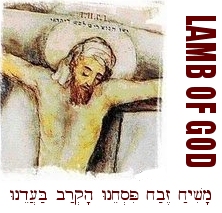
[ The following is related to this week's Torah reading, parashat Beshalach... ]
01.26.24 (Shevat 16, 5784) After Peter had rightly confessed that Yeshua was the "Messiah of God" (מְשִׁיחַ הָאֱלֹהִים), Yeshua explained that his role as the "Son of Man" would require suffering many things, including being rejected by the elders and chief priests and scribes of Israel, and that he would be killed, but raised the third day (Luke 9:18-22). He then asked his followers to soberly count the cost of discipleship: "If anyone desires to come after Me, let him deny himself, and take up his cross daily, and follow Me. For whoever desires to save his life will lose it, but whoever loses his life for My sake will save it. For what profit is it to a man if he gains the whole world, and is himself destroyed or lost? For whoever is ashamed of Me and My words, of him the Son of Man will be ashamed when He comes in His own glory, and in His Father's, and of the holy angels" (Luke 9:23-26). Yeshua then foretold that that were some standing there who would not "taste death" until they had seen the Kingdom of God...
Some eight days later Yeshua called Peter, James, and John to ascend with him upon a mountain to pray. As Yeshua was praying, he was "transfigured" and his face and clothes becoming dazzlingly bright and radiant with Shekhinah glory (תהילת שכינה). The disciples then saw Moses and Elijah in their glorified state talking with Yeshua - a scene right out of the heavenly places! But notice that that the topic of conversation during this amazing meeting was Yeshua's "departure," that is, his death and resurrection -- literally, his "Exodus": τὴν ἔξοδον αὐτοῦ -- which he would accomplish at Jerusalem (Luke 9:31). This is the great connecting point between the revelation of Torah at Sinai (Moses and the prophets) and the revelation of Torah at Zion (Yeshua as Messiah ben Yosef, the Suffering Servant). At Mount Sinai the great vision was given of the Altar upon which a lamb was offered every day and night (קָרְבָּן תָּמִיד) in commemoration of the Passover (Exodus) from Egypt; at Mount Zion the great vision was the cross of Messiah, upon which the blood of the true Lamb of God would be offered as "Messiah our Passover" (1 Cor. 5:7) that delivers us from slavery to sin and spiritual death.
Recall that Yeshua said: "Do not think that I have come to abolish the Law or the Prophets; I have not come to abolish them but to fulfill them. For truly, I say to you, until heaven and earth pass away, not a Yod (י), nor a "thorn" of a Yod (i.e., kotzo shel yod: קוֹצוֹ שֶׁל יוֹד), shall in any way pass from the Law until all is accomplished" (Matt. 5:17-18). Both the Torah of Moses (תורת משה) and the words of the Hebrew prophets (דברי הנביאים) foretold of the coming of Messiah who would purge Israel from her sins and establish the glory of God before the nations. Yeshua is the central meaning of all true Torah....
The Exodus from Egypt is the central miracle of the Torah because it prophetically tells the story of the redemption of God's people throughout the dispensations. Israel's deliverance from bondage to Pharaoh serves as an allegory of both the salvation promised to Adam and Eve after losing their freedom to Satan as well as the fulfillment of the promises to the Jewish people of the ccoming Savior of Israel (מושיע ישראל) who would establish God's kingdom on the earth. Yeshua is both the Savior of the world (מושיע העולם) as well as Israel's true King and Deliverer. The true Exodus, however, is the one accomplished by the sacrifice of Yeshua as the great Lamb of God who takes away the sins of the world. The death, burial, and resurrection of Yeshua is the central miracle of the Scriptures, fulfilling the original promise given to Adam and Eve of the coming deliverer who would remedy the curse of death and restore the glory of Eden.
The great story of God's redemption is revealed on two levels in Scripture - one that concerns the restoration of Eden (the universal level), and the other that concerns the restoration of Israel (the particular level). Therefore Yeshua is both rightly called the "Lamb of God who takes away the sins of the world" (John 1:29) and "the Messiah our Passover Lamb who has been sacrificed for us" (1 Cor. 5:7). Likewise he is both called the "Seed of the woman," and "the Son of David"; he is called the "Second Adam," and the "King of the Jews," and so on.
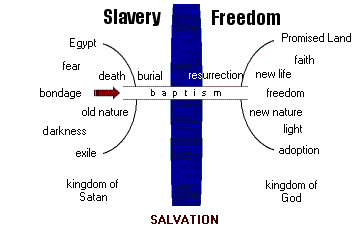 |
God's redeeming love was present from the very beginning (Psalm 90:3). He is the Lamb slain from the foundation of the world. The midrash states that Adam was created from the "dust of the Temple." After Adam's transgression, the Tree of Life was "removed from reach" and guarded by cherubim until the blood that spoke a "better thing than the blood of Abel" was offered for the redemption of mankind (Heb. 12:24). This "better thing" was prefigured in many ways in Scripture: through the martyrdom of Abel, through the Akedah of Isaac, through the blood of the lamb that delivered Israel from the angel of death, through the blood sprinkled upon the kapporet ("mercy seat") of the Ark of the Covenant, through the sacrifice of the Red Heifer, and most especially through the sacrificial death of Yeshua upon the Cross at Moriah.... Those who trust in the sacrifice and victorious resurrection of the Messiah are given access to eat of the Tree of Life in the Paradise of God (Rev. 2:7; 22:14).
Yeshua "lifted up" is the antidote to the venom delivered through the serpent's bite (John 3:14-15). "For as in Adam all die, so also in Messiah shall all be made alive" (1 Cor. 15:22). The "new seed" of life given to us in Yeshua makes us into a "new creation" (בְּרִיאָה חֲדָשָׁה) that fully restores the disfigured image of God within us: "Just as we have borne the image of the man of dust, we shall bear the image of the man of heaven" (1 Cor. 15:49).
Hebrew Lesson
Isa. 53:5 Hebrew reading (click):
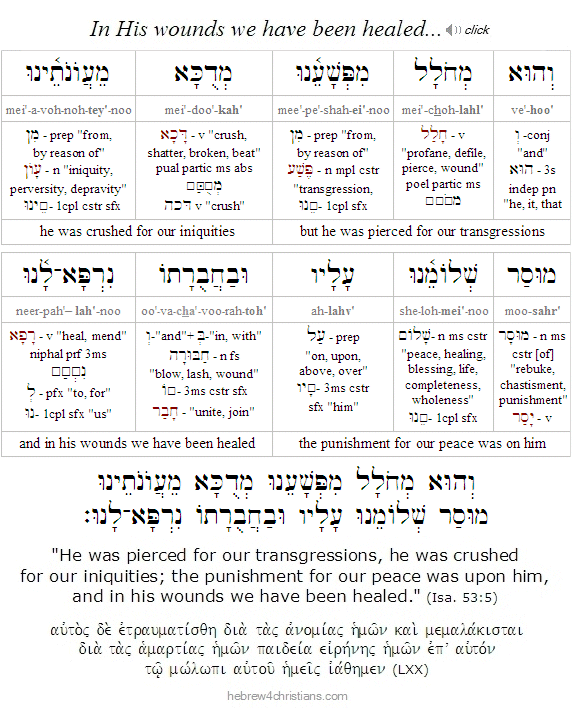 |
Bitterness for Shalom...

01.26.24 (Shevat 16, 5784) From our Torah portion this week (i.e., parashat Beshalach) we read that when the Israelites came to a place called Marah, "they could not drink the water because it was bitter" (Exod. 15:23). Note that the Hebrew text allows us to read that it was the Israelites themselves who were bitter – ki marim hem (כִּי מָרִים הֵם) – "for they (i.e., the Israelites) were bitter," and their bitterness made the water seem so as well.... After the people complained, God showed Moses a tree and threw it into the water, making it drinkable. Interestingly the Hebrew text literally reads, "the LORD taught him a tree" (וַיּוֹרֵהוּ יְהוָה עֵץ), suggesting elon moreh (אֵלוֹן מוֹרֶה), the "teaching tree of Abraham" (Gen. 12:6). The sages say this tree symbolized Torah, the tree of life (etz chaim), which brings happiness to those who take hold of it (Prov. 3:18), though we see Yeshua, the fallen tree that yields mayim chayim - living water - to revive the hearts of mankind...
Hebrew Lesson
Isaiah 38:17 reading (click):
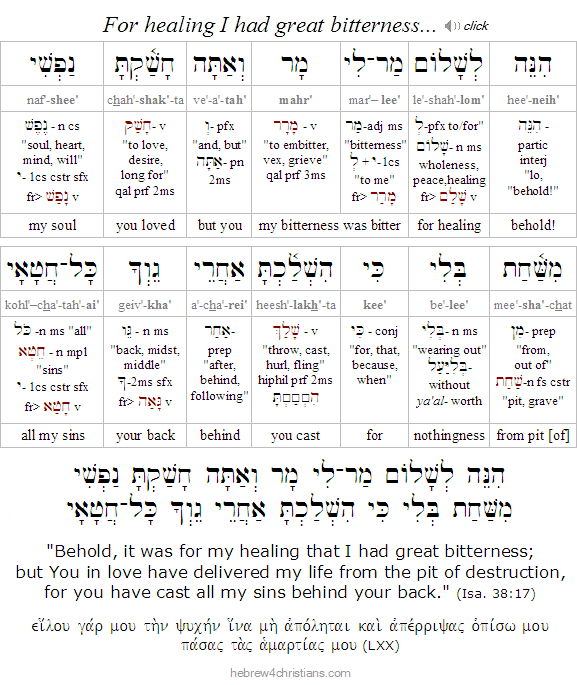 |
Believing and Seeing...
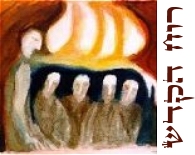
01.26.24 (Shevat 16, 5784) This week's Torah portion (i.e., parashat Beshalach) contains some of the most dramatic episodes recorded in all of the Scriptures. Here we read about the great exodus of the Israelites on the day of Passover and Pharaoh's last-ditch pursuit of the Hebrew slaves. We read how the Shekhinah Glory held back Pharaoh's army, how the LORD split the Sea of Reeds so that the Israelites could safely pass through the waters, and how Pharaoh's forces were all drowned in the sea. We further read how God personally led the Israelites into the desert and sustained them by transforming "bitter water" into sweet water, sending manna from heaven, and providing a miraculous water source from the rock that Moses struck. Yet despite all the miracles and wonders performed on behalf of the Israelites, the people inexplicably seemed to "forget" about their miraculous redemption. Indeed, it was just a few days after the awe-inspiring deliverance from Egypt that the people began to murmur, complain, and kvetch. The sorry state of the Israelites was so bad that the Midrash Rabbah plaintively wonders how it was possible that the Israelites could have so quickly forgotten all of God's miracles performed on their behalf...
The story of the disgruntled Israelites teaches us that miracles are never enough to sustain our faith. Seeing isn't believing, but rather the other way around.... This explains why those church groups that emphasize "signs and wonders" often contain so many exhausted people. Miracles are insufficient for faith; people get excited about them while they occur, but they soon forget them and return to a state of desperation and despair. Necessarily the cycle must repeat itself, with ever-increasing claims of the miraculous, in order to keep the illusion alive.... In light of this, it is wise to consider that the passion for "signs and wonders" may be little more than a counterfeit of the real need to surrender and serve God. After all, truly loving the LORD with all your heart, with all your soul, and with all your strength is the goal of faith. A genuine heart of faith, then, is a miracle of a greater kind than that of splitting the Sea of Reeds.
Regarding the case of the redeemed Israelites, what has struck some commentators is not so much the incredible signs and wonders that the LORD performed on behalf of Israel, but rather the people's persistent inability or unwillingness to believe... Some of the Jewish sages have gone so far as to say that the entire Bible may be read as a book about God's apparent inability to teach the Jewish people how to be grateful. The same certainly can be said about many professing Christians today.
Lasting transformation of the heart comes from "following" the LORD God of Israel. As I've mentioned elsewhere, disciples of Yeshua are called talmidim (תַּלְמִידִים) -- a word that comes from lamad (לָמַד) meaning "to learn" (the Hebrew word for teacher is melamad (מְלַמֵּד) from the same root). In the Greek New Testament, the word for "disciple" is μαθητής (the word "math" comes from this), that is, a pupil of a διδάσκαλος, or a teacher. In other words, disciples of Yeshua are automatically "enrolled" in the school of truth, which is also a "school of suffering" (Col. 1:24). In the Torah the "daily sacrifice," or korban tamid (קָרְבַּן תָּמִיד), was offered to the LORD every morning and evening upon the altar, which corresponds to being a "living sacrifice" (i.e., korban chai: קָרְבָּן חַי) to the LORD (Rom. 12:1-2). We must take up our cross daily (Luke 9:23). Yeshua plainly said: "For this purpose I was born and for this purpose I have come into the world -- to bear witness to the truth. All who are of the truth listen to my voice" (John 18:37). It is hard to imagine a follower of Yeshua who does not love, study, and value the truth...
ראשׁית חכמה קנה חכמה
ובכל־קנינך קנה בינה
rei·sheet · chokh·mah · ke·neih · chokh·mah
oo·ve·khol-keen·yah'·ne·kha · ke·neih · vee·nah

"The first matter of wisdom is this: Get wisdom!
and in all your get, acquire understanding." (Prov. 4:7)
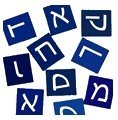
Hebrew Lesson
Proverbs 4:7 Hebrew reading (click):
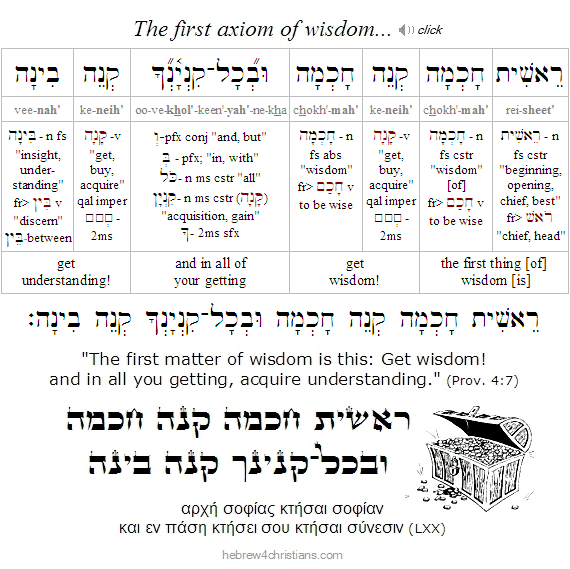 |
The Hebrew word for education is chinukh (חִנּוּךְ), a word that shares the same root as the word for "dedication" (i.e., chanukah: חֲנֻכָּה). True education of the Scriptures is therefore foundational to being a student of the Messiah. We are called to "rightly divide" (ὀρθοτομέω, lit. "cut straight") the "word of truth (2 Tim. 2:15). Among other things, then, following Yeshua means becoming a student of the Jewish Scriptures that He loved and fulfilled (Matt. 5:17-18; Luke 24:44-45). Only after learning from Yeshua as your Teacher will you be equipped to "go to all the nations and teach" others (Matt. 28:19). This is accomplished not merely by explaining (propositional) doctrine but by kiddush HaShem -- sanctifying the LORD in our lives (1 Pet. 1:15-16). As the sages noted long ago: "Upon three things the world does stand: upon the Torah (truth), upon worship, and upon acts of lovingkindness" (Avot 1:2). We are a "living letter" sent to the world to be "read" (2 Cor. 3:2-3).
It has been said that it was easier for the LORD to get Israel out of Egypt than it was for Him to get Egypt out of Israel... The LORD knew the process would be an arduous one, requiring 40 long years of study in the desert under the instruction of Moses, and yet despite all this the people "were unable to enter because of unbelief" (Heb. 3:19; 4:11; Psalm 95:7-11). This is a truly sobering warning, and we are encouraged to open our hearts to the miracle of God's love for us. "Today, if you hear His voice, do not harden your hearts." May it please God to help us make a new commitment to study and to live the truth of the Torah and Scriptures for the glory of His Name. Amen.
 |
The Test of Manna...

[ The following is related to this week's Torah reading, parashat Beshalach... ]
01.25.24 (Shevat 15, 5784) Exactly one month after the Exodus (i.e., Iyyar 15), the LORD led the Israelites from the oasis and palm trees at Elim (אֵילִם) into the deeper part of the desert, to midbar Sin (מִדְבַּר־סִין), a desolate region that was about midway to Sinai going southeast (Exod. 16:1). About this time, the food provisions the people had brought with them ran out, and the Israelites began grumbling against Moses and Aaron, saying: "If only we had died by the hand of God in the land of Egypt, when we sat by the pots of meat (סִיר הַבָּשָׂר), when we ate bread to our fill, for you have brought us out into this desert to starve to death!" (Exod. 16:3). The LORD then said to Moses, "'Behold, I am going to rain down bread from heaven (לֶחֶם מִן־הַשָּׁמָיִם) for you. The people will go out and gather a portion for that day so that I might test whether they will walk in my Torah (תּוֹרָה) or not" (Exod. 16:4).
Note that while God graciously provided the miracle of manna, the people were required to receive it for themselves. Note further that a portion was given for just that day, and storing it up for later use (except for the Sabbath) resulted in rottenness and decay (Exod. 16:20). By being required to collect their daily bread (דְּבַר־יוֹם בְּיוֹמוֹ) the people learned that God's blessing and their efforts worked together. Our sustenance is a gift from heaven, though we must reach out to take hold of it... The sages here note that the Sabbath and the manna both underscore our complete dependency on God as the source of our sustenance. We will see this again regarding agricultural laws of Shemmitah (שְׁמִטָּה) and the Jubilee (יובל).
"I will test them (אֲנַסֶּנּוּ) whether they will walk in my Torah (הֲיֵלֵךְ בְּתוֹרָתִי) or not" (Exod. 16:4). This is the test (נִסָיוֹן) to see whether we will trust God to meet our needs... After all, it is one thing to believe God can help you and yet another to trust that He will actually do so. Peace comes when belief and trust are unified within the heart - when the one who firmly believes completely trusts as well. God gave bread from heaven to test us: "And he humbled you and let you hunger and fed you with manna, which you did not know, nor did your fathers know, that he might make you know that man does not live by bread alone, but man lives by every word that comes from the mouth of the LORD" (Deut. 8:3). God humbles us, which is really one of the greatest of blessings, since we then learn to rely on God's strength and love to meet all our needs.
For more about this topic, see the article "Bread from Heaven."
Hebrew Lesson
Deut. 8:3b Hebrew reading:
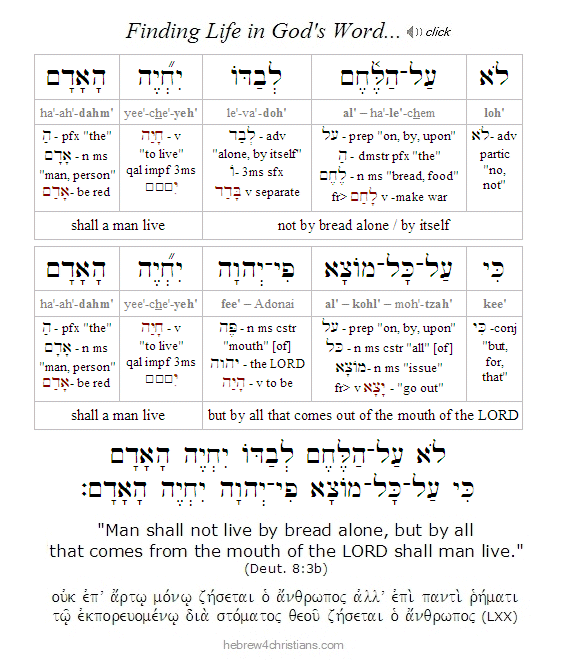 |
The Torah of Trees...

[ Today is Tu B'Shevat, the 15th of Shevat, which marks the "new year" for trees.... ]
01.25.24 (Shevat 15, 5784) The Torah alludes that human life is like "the tree of the field," i.e., כִּי הָאָדָם עֵץ הַשָּׂדֶה, Deut. 20:19), and many people therefore observe Tu B'Shevat as time to assess man's place within creation as well. Since God created the world for a habitation (Isa. 45:18), some have pictured the world itself as a "great tree" with human beings as its fruit. Indeed, Yeshua often used such agricultural images in his parables. For example, he explained that people are known by the "fruits" of their lives (Matt. 7:16-20). He likened the spread of his message in terms of "sowing and reaping" (Matt. 13:3-23) and compared the Kingdom of Heaven to the secret working of a mustard seed (Matt. 13:31-32). Yeshua regarded the world as a "field" for planting with different "types of soil" (Matt. 13:38-43), and warned of the "great harvest" of souls at the end of the age (Luke 10:2; Matt. 13:30). He pointed to signs from a fig tree to indicate the nearness of the prophesied End of Days (Matt. 24:32-33). Yeshua also used the metaphor of a "vine and its branches" to explain how his followers are to be connected to Him (John 15:1-6).
The Scriptures explicitly state various laws regarding the use of trees. In other words, there is a "Torah of Trees." For example, "When you enter the land and plant any tree for food, you shall regard its fruit as "uncircumcised" (i.e., orlah: עָרְלָה) for three years; in the fourth year all its fruit shall be holy, an offering of praise to the LORD; only in the fifth year may you use its fruit, to increase its yield for you: I am the LORD your God" (Lev. 19:23-25; 26:3-4). The Torah also clearly forbids the destruction of fruit trees during times of warfare: "When you besiege a city for a long time, making war against it in order to take it, you shall not destroy its trees by wielding an axe against them. You may eat from them, but you shall not cut them down. Are the trees in the field human, that they should be besieged by you?" (Deut. 20:19-20). Clearly, then, God cares for trees...
The psalmist describes the trees of the forest as singing for joy (Psalm 96:12), just as the prophet Isaiah foretold the day when the trees of the field shall "clap their hands" in praise to the LORD God of Israel (Isa. 55:12). Indeed the wisdom of Torah (chochmat haTorah) is metaphorically called etz chaim, a "Tree of Life," and the ideal righteous man is described as the one who delights in the Torah (תּוֹרָה) and meditates upon it daily. "He is like a tree planted by streams of water that yields fruit in its season."
וְהָיָה כְּעֵץ שָׁתוּל עַל־פַּלְגֵי מָיִם
אֲשֶׁר פִּרְיוֹ יִתֵּן בְּעִתּוֹ וְעָלֵהוּ לא־יִבּוֹל
וְכל אֲשֶׁר־יַעֲשֶׂה יַצְלִיחַ
ve·hah·yah · ke·eitz · shah·tool · al-pal·gei · mah'·yeem
a·sher · peer·yoh · yee·ten · be·ee·to · ve·a·lei'·hoo · loh · yee·bohl
ve·khol · a·sher-ya·a·sei · yatz·lee'·ach

"And he [i.e., the one who loves Torah] is like a tree planted by streams of water
that yields its fruit in its season, and its leaf does not wither.
And all that he does shall prosper."
(Psalm 1:3)
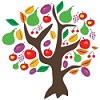
Hebrew Lesson
Psalm 92:12 reading (click for audio):
The Tree of Our Life...
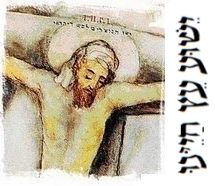
01.25.24 (Shevat 15, 5784) The "Tree of Life," etz ha'chayim (עֵץ הָחַיִּים), is mentioned ten times in the Scriptures. It first appears in the Torah as the center of the paradise of Eden (Gen. 2:9; 3:22-4), but it is soon lost to humanity because of Adam's transgression. In the book of Revelation, it reappears in the center of the Paradise of God (Rev. 2:7, 22:2), resurrected on account of the faithful obedience of Yeshua as mankind's "last Adam" (1 Cor. 15:45). Those who have washed their robes by means of His righteousness are given access to this Tree in the heavenly Jerusalem (Rev. 22:14). The paradise lost by Adam has been regained by the greater ben-adam, Son of man, Yeshua the Messiah.
In the book of Proverbs, the Tree of Life is a metaphor for the life of wisdom (chokhmah), which is the implied subject of our verse above (see Prov. 3:13). Traditional Judaism identifies talmud Torah (the study of Torah) as the Tree of Life, promising wisdom to those who "lay hold of her" (a Torah scroll has wooden rods called atzei chayim – the "trees of life" – used to roll the parchment). According to the Rabbis, the eternal life that was lost in Eden was restored to humanity with the giving of the Torah at Sinai.
A midrash says that in the paradise of olam haba (the world to come) there stands the Tree of Life, with the tree of knowledge forming a hedge around it. Only the wise one who has cleared a path for himself through the tree of knowledge can come close to it (which is said to be so enormous that it would 500 years to walk around it). Beneath the Tree flows forth the water that irrigates the whole earth, parting into four streams, the Ganges, the Nile, the Tigris and the Euphrates rivers. In mystical (i.e., gnostic) Judaism, the Tree of Life is depicted as an elaborate symbol, the meditation of which is said to "clear the path" back to paradise.
Followers of Yeshua understand that He (alone) is the Tree of Life, the Center of the true Paradise of God (Rev. 22:2). He is the Seed, Root, Trunk, Branches, and Fruit that comes from heaven. The first Adam lost access to God by means of his transgression (eating from the tree of the "knowledge of good and evil"), but the "Greater Adam" reclaimed our access by means of His obedience, resisting the power of evil even to the point of death upon the "tree" of the cross (Phil. 2:8). The resurrection of the life of Yeshua is the "firstfruits" of all who put their trust in Him (1 Cor. 15:20; Jas. 1:18). Yeshua is the "Tree of Life in the center of the Paradise of God," and all who retain Him are forever blessed indeed. Say ye Amen.
עֵץ־חַיִּים הִיא לַמַּחֲזִיקִים בָּהּ
וְתמְכֶיהָ מְאֻשָּׁר
eitz-chai·yeem · hee · la·ma·cha·zee·keem · bah
ve·toh·me·khey·ha · me·oo·shar

"A tree of life [is Torah] to those who lay hold of it,
and those who grasp it are blessed."
(Prov. 3:18)

Hebrew Study Card
The Fruit of our Words...
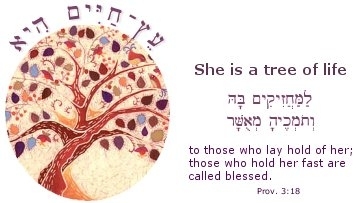
[ The following is related to Tu B'Shevat, or the "new year" for trees, a holiday that provides opportunity for us to reflect on the idea of fruitfulness and the fruit of the Spirit in our lives... ]
01.24.24 (Shevat 14, 5784) Yeshua said that as a tree is to its fruit, so is a person's heart is to his speech. Our words arise from an underlying source and root, and it is vital, therefore, to address the source of our angry, cynical or cruel words, our fearful and deceptive words, our despairing and faithless words: "I tell you, on the Day of Judgment people will give account for every careless word (πᾶν ῥῆμα ἀργὸν) they speak, for by your words you will be justified, and by your words you will be condemned" (Matt. 12:36-37).
First note that the phrase translated "every careless word" can further be understood as "every 'workless' word," that is, every vain or empty word spoken, every broken promise, every insincere utterance, and so on. Second, note that there is a relationship between naming and being in Hebrew thought, and indeed the Hebrew word davar (דּבר), usually translated as "word," can also mean "thing." This suggests that our words define reality - not in an absolute sense, of course - but in terms of our perspective and attitude, and for that we are held responsible before the LORD. Since our words express our thoughts, Yeshua wants us to make up our minds: "Either make the tree good and its fruit good, or make the tree bad and its fruit bad, for the tree is known by its fruit" (Matt. 12:33).
"By your words you will be justified, and by your words you will be condemned..." Our words can be vessels of light, healing, mercy, and grace -- or vessels of darkness, destruction, and blame -- and sometimes both! (James 3:10). "Death and life are in the power of the tongue, and those who love it will eat its fruits" (Prov. 18:21). Therefore let us ask God for help, for "the tongue can no man tame; it is an unruly evil, full of deadly poison" as James the Righteous wrote (James 3:8). May we appeal to God for the power to obey his commandment: "Let no corrupt word proceed out of your mouth, but what is good for necessary edification, that it may impart grace to the hearers" (Eph.4:29; Col. 4:6). Using our words to express appreciation, kindness, encouragement, etc., is analogous to using the "good eye" to see by means of the light of God; it is a form of offering "kaf zechut," the benefit of the doubt and choosing to regard the best, even in difficult circumstances...
Listen to the words of your heart and understand that they are devarim (דְּבָרִים) "things" that are defining the course of your life right now. Our thoughts and words "exhale" the breath of God that was given to each of us. In a very real sense they serve as "prayers" we are constantly offering.... And may it please our gracious and long-suffering LORD to answer the cry of our heart: "Let the words of my mouth and the meditation of my heart be acceptable in your sight, O LORD, my Rock and my Redeemer." Amen.
יהיו לרצון אמרי־פי
והגיון לבי לפניך יהוה צורי וגאלי
yee·yoo · le·rah·tzon · eem·rei - fee
ve·heg·yohn · lee·bee · le·fah·ney'·kha · Adonai · tzoo·ree · ve·go·a·lee

"Let the words of my mouth and the meditation of my heart
be acceptable to You, O LORD, my Rock and my Redeemer."
(Psalm 19:14)

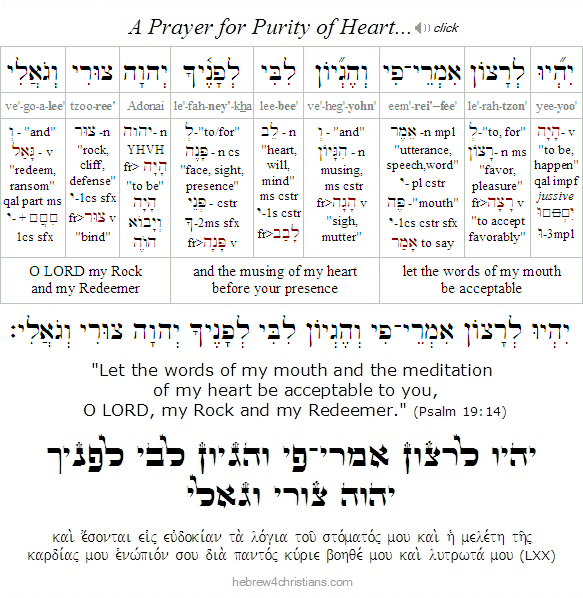
The Word of Guidance...
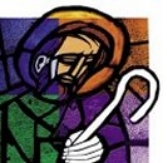
[ The following concerns this week's Torah reading (Beshalach) and the Exodus from Egypt... ]
01.24.24 (Shevat 14, 5784) In our Torah portion for this week (i.e., Beshalach) we learn that the LORD chose to take his redeemed people along the "longer road" to the promised land, just as we find ourselves still awaiting the completion of our redemption in the world to come. And like the Israelites, we must be on guard, since when things get difficult, our tendency is to go back to what is familiar, even if it is painful. Thank God our Good Shepherd Yeshua teaches us and guides us in the way to go: "And though the Lord give you the bread of adversity and the water of affliction, yet your Teacher (מוֹרֶה) will not hide himself anymore, but your eyes shall see your Teacher. Your ears will hear a word behind you, saying: 'This is the way; walk in it,' when you turn to the right or to the left" (Isa. 30:20-21).
וְאָזְנֶיךָ תִּשְׁמַעְנָה דָבָר מֵאַחֲרֶיךָ לֵאמר
זֶה הַדֶּרֶךְ לְכוּ בוֹ
כִּי תַאֲמִינוּ וְכִי תַשְׂמְאִילוּ

"Your ears will hear a word behind you saying:
'This is the way; walk in it,'
when you turn to the right or to the left."
(Isa. 30:21)

Hebrew Lesson
Isaiah 30:21 reading (click):
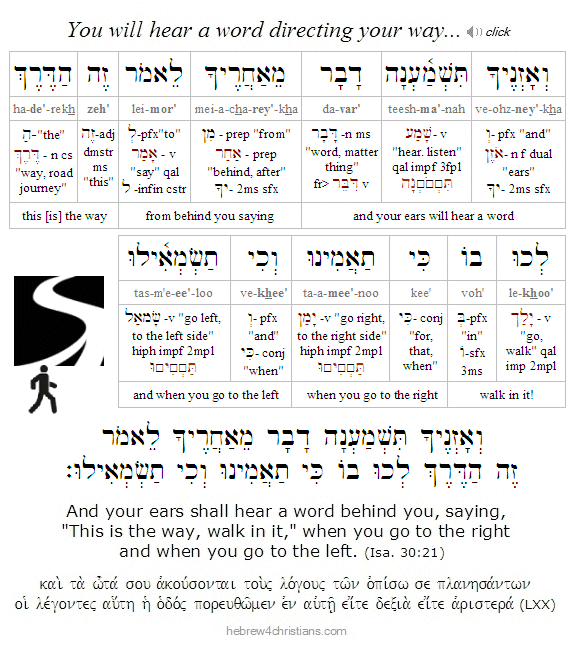 |
What a beautiful image of our LORD as our Teacher and Good Shepherd, who guides us in the paths of life and delivers us from "right-hand and left-hand errors." And may God keep us upon the path of his righteousness, free from the seductions of the tempter who wants to distract our souls and lead us into fruitless byways and trouble. May we receive grace to behold His face, even in the midst of adversity or affliction, learning from Him the way to go...
"Come, my people, enter your chambers, and shut your doors behind you" (Isa. 26:20). The LORD beckons: "Call to me and I will answer you, and will tell you great and hidden things that you have not known" (Jer. 33:3). And I looked, and behold, a door standing open in heaven. And the first voice, which I had heard speaking to me like a trumpet, said, "Come up here, and I will show you what must take place" (Rev 4:1).
Personal Note: Please remember me in your prayers, friends. I have been undergoing a host of tests recently, many of them overwhelming, and I am hurting. I also have been physically sick the last few days and unable to sleep. Shalom and thank you. -- John
 |
Heavenly ABC's...
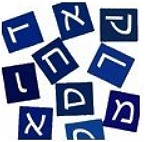
[ The following is related to this week's Torah reading, parashat Beshalach... ]
01.24.24 (Shevat 14, 5784) A verse from our Torah portion this week (i.e., Beshalach) contains all the letters of the Hebrew alphabet (i.e., aleph (א), bet (בּ), gimmel (ג), etc.). The special verse reads, "This is what the LORD has commanded: 'Gather of it, each one of you, as much as he can eat. You shall each take an omer (עמֶר), according to the number of the persons that each of you has in his tent'" (Exod. 16:16). Since this refers to the manna the Israelites were to collect for their daily bread, and this verse contains all the letters of the alphabet, we may "poetically" infer that if we immerse ourselves in the Scriptures, "from Aleph (א) to Tav (ת)," God will provide us with the "daily bread" (לֶחֶם חֻקֵּנוּ) we need, just as He did when the bread from heaven (לֶחֶם מִן־הַשָּׁמָיִם) was miraculously given to feed the Israelites in the desert. Therefore Yeshua, who is the Aleph and Tav, taught us to pray, "Give us this day our daily bread," which surely refers to the spiritual food (i.e., encouragement, hope, life) that we receive from the Word of Life (Deut. 8:3; Matt. 4:4).
Yeshua taught us: "Don't be anxious about tomorrow, for tomorrow has its own troubles. Live one day at a time" (Matt. 6:34). It makes no sense to worry about the future if the LORD is the Good Shepherd who tenderly watches over your way (Psalm 23:1). Every day we are given daily bread, but we must remember that manna could not be stored up without becoming rotten (Exod. 16:20). God's provision is "sufficient unto the day...."
Hebrew Lesson
Matt. 6:11 Hebrew reading (click):
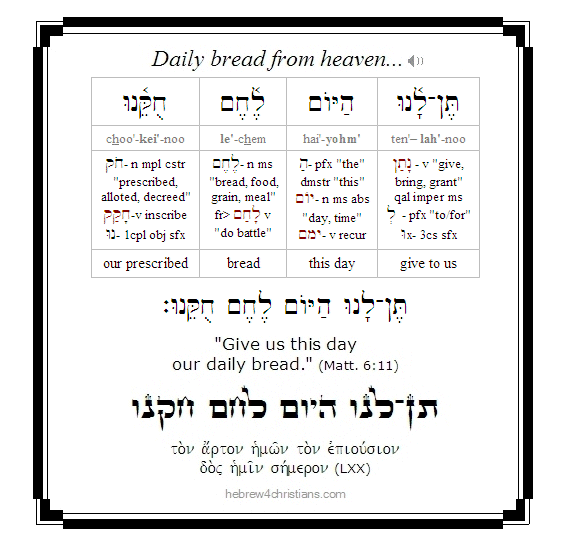 |
Isn't it amazing how studying the Hebrew text reveals further insights into the Scriptures? Kotzo shel yod... And may you rest in the promise: "My God will supply every need of yours - "from A to Z" - according to his riches in glory in Yeshua the Messiah" (Phil. 4:19). He is lechem ha'chaim - the Living Bread from heaven (John 6:51)!
Tu B'Shevat New Year...
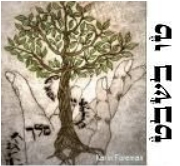
[ Wednesday January 24th at sundown begins "Tu B'Shevat" (ט"ו בשבט), or the 15th of the month of Shevat, which marks the traditional date celebrating the "New Year" for Trees... ]
01.24.24 (Shevat 14, 5784) The Bible begins and ends with the great Tree of Life -- first in the orchard of Eden, and later in the midst of the paradise of heaven. "The Tree of Life (i.e., etz ha' chayim: עֵץ הַחַיִּים) was in the midst of the garden..." (Gen. 2:9). "Then the angel showed me the river of the water of life, bright as crystal, flowing from the throne of God and of the Lamb through the middle of the street of the city; also, on either side of the river, the Tree of Life (etz ha-chayim) with its twelve kinds of fruit, yielding its fruit each month" (Rev. 22:1-2). Notice that the "twelve fruits" (καρποὺς δώδεκα) from the Tree of Life are directly linked to the "twelve months" of the Jewish year (κατὰ μῆνα ἕκαστον ἀποδιδοῦν τὸν καρπὸν αὐτοῦ: "each month rendering its fruit"). Twelve months; twelve fruits.... This teaches us that the sequence of the biblical holidays (mo'edim) was intended to teach us revelation about God. That is why God created the Sun and the Moon for signs and for "appointed times" (Gen. 1:14), as it also says: "He made the moon to mark the appointed times (לְמוֹעֲדִים); the sun knows its time for setting" (Psalm 104:19).
Hebrew Lesson
Psalm 104:19 Hebrew reading (click):
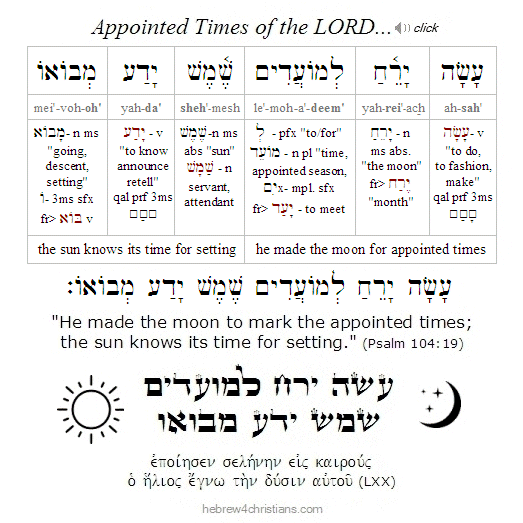 |
The Scriptures state twice: "Take root downward and bear fruit upward" (2 Kings 19:30; Isa. 37:31). As Yeshua said, "unless a grain of wheat falls to the ground and dies, it abides alone; but if it dies, it brings forth much fruit (John 12:24). We pray we might surrender ourselves to the Lord fully, being immersed in His passion, "bearing fruit in every good work (ἐν παντὶ ἔργῳ ἀγαθῷ καρποφοροῦντες) and growing in da'at HaShem (דַעַת אֱלהִים) - the knowledge of God" (Col. 1:10). The "fruit of the righteous is a Tree of Life" lit., etz chayim (עֵץ חַיִּים), literally, "the Tree of lives" (Prov. 11:30). It is the fruit of Yeshua, the Tzaddik of God, the Righteous One, who bears fruits of healing in the lives of those trust in Him...
The "Tree of Life" is mentioned ten times in Scripture, corresponding to the "ten words of God" (i.e., the Ten Commandments). In the Torah it first appears in the center of the paradise of Eden (Gen. 2:9; 3:22-4), but it is soon lost to humanity because of Adam's transgression. In the book of Revelation, it reappears in the center of the Paradise of God (Rev. 2:7, 22:2), resurrected on account of the faithful obedience of Yeshua as mankind's "last Adam" (1 Cor. 15:45). Those who have washed their robes by means of His righteousness are given access to this Tree in the heavenly Jerusalem (Rev. 22:14). The paradise lost by Adam has been regained by the greater "Son of Man," Yeshua the Messiah, the Savior of us all. Amen.
Hebrew Lesson
Prov. 11:30 Hebrew reading (click):
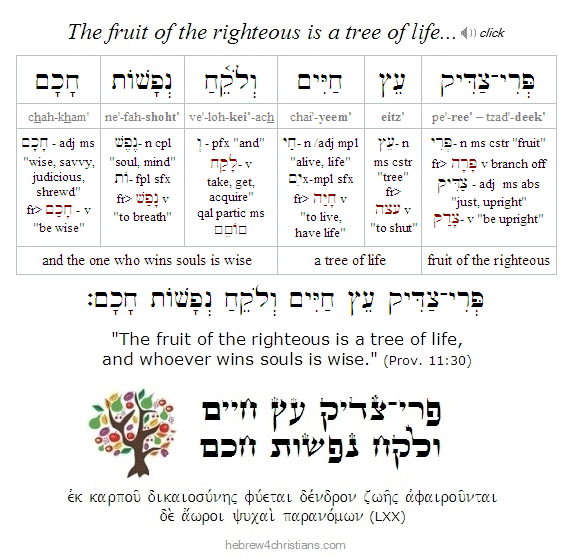 |
טבילת משה
Baptism into Moses...
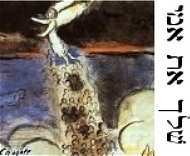
[ The following concerns this week's Torah reading (Beshalach) and the Exodus from Egypt... ]
01.24.24 (Shevat 14, 5784) Egypt symbolizes the world system that enslaves people (the Hebrew word for Egypt, "mitzrayim," comes from the word tzur (צוּר), meaning "restriction"). As the ruler of this world, Pharaoh therefore represents Satan, the original serpent who deceived Eve in the orchard. Egypt therefore represents a state of exile (similar to the original exile from Eden), and just as the blood of the lamb applied to the doorposts in Egypt caused the plague of death to pass over, so the blood of Yeshua saves us from the wrath of God and spiritual death. Yeshua said that by nature people were in bondage to the dictates of this world system and its forces and needed to be set free. The Hebrew word for salvation (יְשׁוּעָה) means to be set free from the restrictions of "Egypt" and its forces.
The Apostle Paul likened the crossing of the sea as a metaphor of baptism: "All were baptized into Moses in the cloud and in the sea" (1 Cor. 10:1-2,11). In the New Testament, baptism symbolizes our identification with Yeshua's death, burial, and resurrection (Col. 2:12; Rom. 6:3-5). Some Christian commentators make a strong distinction between these two baptisms (i.e., baptism into Moses and baptism into Messiah), though there are many profound correspondences. For instance, the Israelites were facing death and were therefore at the "end of themselves." They had no other appeal or hope than God's gracious intervention on their behalf (i.e., salvation). Still, they needed to act and move forward. After they took the step of faith, they could see the Shekhinah Glory lighting up the way of deliverance, though this meant being "buried" within the midst of the sea. Their earlier fear of death was replaced with a song of God's great deliverance. The other side of the sea represented new life, the life that comes from above, by the power and agency of the Holy Spirit... The Israelites died to their old life, were symbolically buried in the waters, but rose to new freedom by the grace and power of God... In a way, the crossing of the sea represented a "birth canal" into the realm of true freedom as God's redeemed children.
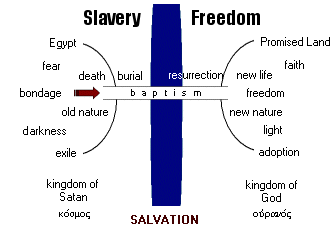 |
Just as the Israelites were made free from the tyranny of Pharaoh when they crossed the Sea - being "baptized into the death of the waters" to be reborn to serve God in freedom – so those who trust in Yeshua are "baptized into His death" and reborn to serve God by the power of the Holy Spirit.
Note that this "baptism into Moses" was not a water baptism, since even though the people went through the water, they crossed over the sea on dry ground... No, it was a baptism or "immersion" into the Shekhinah Cloud, an identification with Moses and his mission (Heb. 11:29). At Sinai Moses would later ascend into the midst of that Cloud to behold the vision of the altar of Messiah (i.e., the Mishkan, or Tabernacle) - a vision that later became a reality during the time of Yeshua's transfiguation before his crucifixion (see Luke 9:28-31). Ultimately baptism is about identifying with the redemptive mission of God through Yeshua our Savior. The meaning of baptism is to be immersed by the Ruach HaKodesh (Holy Spirit) to be made part of the greater redemptive mission of God's people.
Hebrew Lesson
Psalm 34:4 Hebrew reading (click):
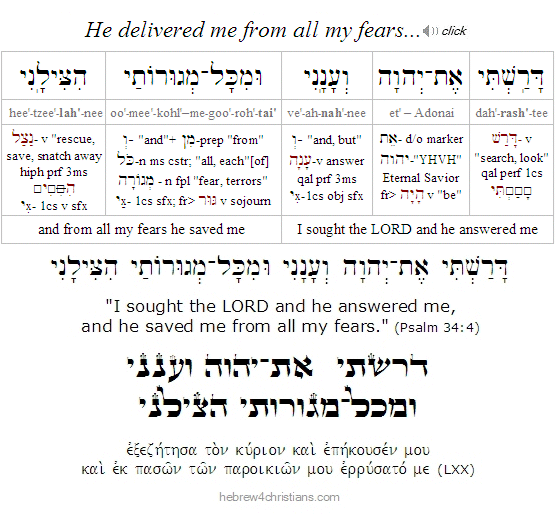 |
Love Story of Exodus...
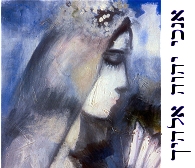
01.23.24 (Shevat 13, 5784) The story of the Exodus from Egypt can be read as a great "Cinderella-like" love story. The beloved is imprisoned in far away castle, made to do the lowliest of labor, but the Lover soon appears and heroically rescues her from her distress. Together they run away to a land of promise, but they must traverse dangerous desert places, where the Lover protects and cares for his beloved. Eventually they pledge their undying love for one another and their married life begins...
Or so goes the story... But practically speaking, how would God - the Creator and LORD of all - "woo" a nation? What would such a courtship be like? How would the betrothed come to understand the Heavenly Bridegroom? For that matter, how would the betrothed come to understand herself?
Recall that after the LORD split the sea and led his people safely across, Israel sang a song of praise to Him. In Jewish tradition this is called Shirat Hayam, "the Song of the Sea," which is an "antiphon," or song of response to their deliverance from Egypt. In the Torah we read "Then Moses and the children of Israel sang this song to the LORD, and spoke, saying: "I will sing to the LORD, For He has triumphed gloriously! The horse and its rider He has thrown into the sea! The LORD is my strength and my song, and he has become my salvation; this is my God, and I will praise him, my father's God, and I will exalt him..." "Who is like you, O LORD, among the gods? Who is like you, majestic in holiness, awesome in glorious deeds, doing wonders? ... You have led in your steadfast love the people whom you have redeemed; you have guided them by your strength to your holy abode... You will bring them in and plant them on your own mountain, the place, O LORD, which you have made for your abode, the sanctuary, O Lord, which your hands have established" (see Exod. 15:1-21).
Note that the opening statement, "Then Moses and the children of Israel sang" is actually in the future tense: "Then they will sing" (אָז יָשִׁיר־מֹשֶׁה וּבְנֵי יִשְׂרָאֵל) which the sages say refers to the coming of Messiah. Indeed, in Revelation 15:3 we read that this song of Moses, as well as the song of the Lamb of God, will be sung in heavenly places: "They sing the song of Moses (שׁירַת מֹשֶׁה), the servant of God, and the song of the Lamb (שִׁירַת הַשֶּׂה), saying: "Great and marvelous are Your works, Lord God Almighty (יהוה אֱלֹהֵי צְבָאוֹת)! Just and true are Your ways, O King over the nations (מֶלֶךְ הַגּוֹיִם)" Note also that in the closing phrase of Shirat Hayam we read: יְהוָה יִמְלֹךְ לְעֹלָם וָעֶד - "the LORD will reign forever" (Exod. 15:18), but the word "will reign" (יִמְלךְ) is spelled with a missing letter Vav (ו), which suggests the Messiah our King Yeshua. The LORD will indeed reign when the rightful heir to the throne of David and the true King of Israel soon appears....
Going back to the "love story" analogy, at this point in their relationship, the betrothed knew the Divine Bridegroom in terms of His heroic deliverance and power, and even held hope of being led to His "holy abode" to dwell with Him... But how well did she know Him? Would she willingly give herself to Him because she truly loved and trusted Him, or would she merely submit because she was overawed or obliged by His power and glory? How could she learn her own heart, and how could God show her who she was meant to be?
In a word - testing... When God delivered Israel from Egypt, He did not take them on the fast track to the Promised Land (though He certainly could have done so). No, there was a circuitous route to take, a divinely appointed wandering, a Divine Stroll of betrothal, if you will. In order to reveal Himself to the Israelites, God had to led them directly into the desert. He embittered waters to make them sweet once again; He let stomachs growl to provide the Bread of life; He parched mouths to give Living Water from the "Rock that was struck" (1 Cor. 10:4). God did all this to reveal to his newly redeemed people that He is the satisfaction of all their longings... He rescued his bride from the house of slavery and now wanted to refine her to receive greater revelation to come. He was "wooing" or "courting" her in order to bring her beneath a canopy of stars at Sinai...
Hebrew Lesson
Song 6:3 Hebrew reading (click):
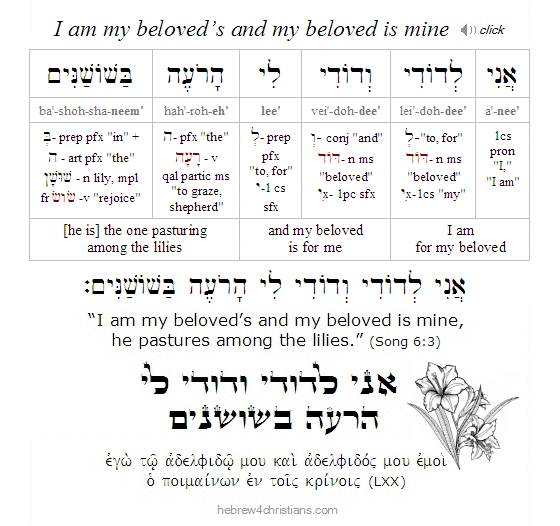 |
Stepping out in Faith...

[ The divine consequence of the exodus from Egypt (יציאת מצרים) is still felt to this day, as indeed is the greater exodus Yeshua attained by the power of the cross (Luke 9:30-31). ]
01.23.24 (Shevat 13, 5784) From our Torah this week (i.e., Beshalach) we read how the children of Israel were trapped before the sea with no way of escape... Moses then cried out to God who told him to march forward -- right into the waters -- as the Pillar of Cloud settled between the people and Pharaoh's advancing army.
According to midrash, when Moses lifted his staff to divide the sea, at first nothing happened. The people waited anxiously at the seashore, wondering what to do. Finally, Nachshon ben Aminadav, a descendant of Judah (Num. 1:7), waded into the water "up to his nose," and the winds then began blowing to divide the waters (Shemot Rabbah). The great miracle of kiryat yam suf (קרית ים סוף)- the splitting of the Sea of Reeds (the word "suf" means "reed,"see Exod. 2:3) therefore happened because someone found courage and took a step of faith: "And the people of Israel went into the midst of the sea on dry ground, the waters being a wall (חוֹמָה) to them on their right hand and on their left" (Exod. 14:22). They marched across the sea all night (i.e., Nisan 21), under the light of the Shekhinah Glory...
The Talmud says "kasheh le'zavgom ke'kriat yam suf," which means it is more difficult for God to create a marriage than to split the sea. They reason this way because each person needs to take individual action to trust the other. Likewise with God. It is more difficult for God to get us to be in a trusting relationship with Him than it is for Him to split a sea. Of course the problem is not with God, who is the perfect "husband," but with our adulterous inner nature. It took the LORD a year to deliver Israel from Egypt, but it took Him 40 years to teach Israel to trust in His promises of love. God always awaits our teshuvah - our "answer" - to His invitation before He reveals more to us. As Yeshua once said to his followers, "I still have many things to say to you, but you cannot bear them now" (John 16:12). Some things about God can only be known by stepping out in faith and surrendering ourselves to Him.
Hebrew Lesson
Psalm 37:5 Hebrew reading (click):
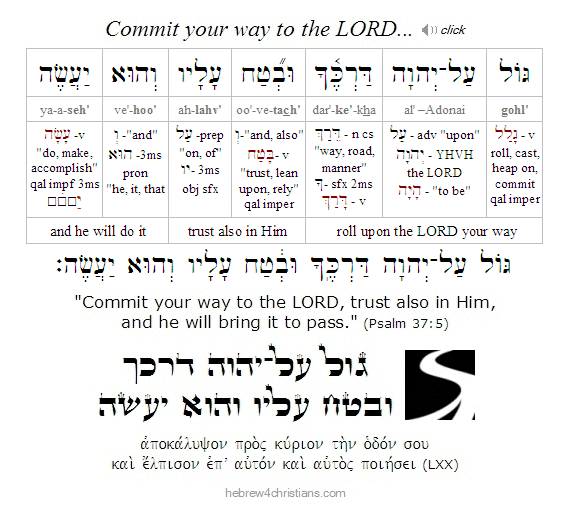 |
Note: For more on this subject, see "Stepping out in Faith..."
The "Sabbath of the Song"
About Shabbat Shirah...
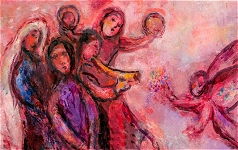
[ The following is related to this week's Torah reading, parashat Beshalach... ]
01.22.24 (Shevat 12, 5784) Our Torah reading for this week (Beshlach: Exod. 13:17-17:16) includes the famous Shirat Hayam (שִׁירַת הַיָּם), the "Song the Sea," a hymn of praise the Israelites sang to the LORD after they miraculously crossed the Sea of Reeds (i.e., Yam Suf: יָם סּוּף). Shirat Hayam is also traditionally sung on the 7th day of Passover (i.e., on Nisan 21) since it was first sung seven days after the people left Egypt during the time of the Exodus. When the Temple stood in Jerusalem, Shirat Hayam was sung every day by the Levites during the minchah (afternoon) offering. After the Temple was destroyed, however, the song was incorporated into the shacharit (morning) service of synagogues (i.e., "Mi Chamocha," etc.) to fulfill the Torah's commandment to "remember the day of your departure from the land of Egypt all the days of your life" (Deut. 16:3).
Today the Sabbath on which parashat Beshalach is recited is called Shabbat Shirah Hayam and the congregation rises when the song is chanted:
אָשִׁירָה לַיהוה כִּי־גָאה גָּאָה
סוּס וְרכְבוֹ רָמָה בַיָּם׃
עָזִּי וְזִמְרָת יָהּ וַיְהִי־לִי לִישׁוּעָה
זֶה אֵלִי וְאַנְוֵהוּ אֱלהֵי אָבִי וַאֲרמְמֶנְהוּ׃
יהוה אִישׁ מִלְחָמָה יהוה שְׁמוֹ׃
ah·shee'·rah · la-Adonai · kee-ga'·oh · ga'·ah
soos · ve·roh·khe·voh · rah·mah · ba·yahm.
oh·zee · ve·zeem·raht · Yah · va·hee-lee · lee·shoo·ah
zeh · ei·lee · ve·an·ve'·hoo · e·loh·hei · ah·vee · va·a·roh·me'·noo.
Adonai · eesh · meel·chah·mah · Adonai she·moh.

"I will sing to Adonai, for he has triumphed gloriously;
the horse and his rider he has thrown into the sea.
Yah is my strength and my song, and he has become my salvation;
this is my God, and I will enshrine Him, my father's God, and I will exalt him.
The LORD is a warrior; the LORD is his Name." (Exod. 15:1-3)
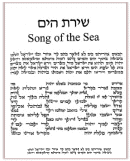
Download Study Card
Notice that the Hebrew text is stylized in a special way according to soferut (scribal) tradition. The Talmud (Megillah 16b) states that Shirat Hayam must be written in the form of "a half brick over a whole brick, and a whole brick over a half brick," that is, with alternating half-lines, to resemble "building a house."
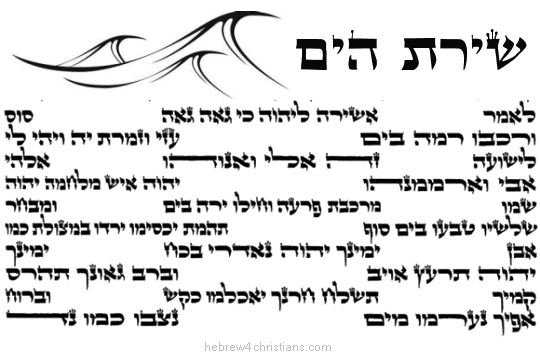 |
According to Yalkut Me'am Lo'ez, the alternating "bricks" are intended to resemble waves of water, while the blank spaces separating these (i.e., text blocks) suggest "blank spaces in our knowledge and praise of God" which we are encouraged to add to the "building." The sages count exactly 198 words in this song, which is the numerical value for the word tzchok (צחק), a word that means "laughter" and is the word used to describe Sarah's response when she finally gave birth to Isaac (Gen. 21:6). According to Rabbi Bachya, the laughter in Isaac's name comes from Abraham's joy (Gen. 17:17). The joy of Isaac's birth, then, is linked with the "birth" of the nation of Israel at the time of the Exodus, just as his symbolic death during the Akedah represents Israel's rebirth...
It is also noteworthy to remember that the Lord Yeshua was the One who saved Israel on that very day. He is the Angel of the LORD and YHVH the Redeemer, as Moses likewise stated: וַיּוֹשַׁע יהוה בַּיּוֹם הַהוּא אֶת־יִשְׂרָאֵל מִיַּד מִצְרָיִם / "On that day, the LORD saved Israel from the hand of the Egyptians" (Exod. 14:30).
It's been said that all the signs and wonders performed during the Exodus served two purposes: 1) to convince the Egyptians of the greatness of God, and 2) to convince the Israelites of the same thing... An even greater blessing, however, is to trust in the LORD without the need for signs and wonders (John 20:29). May the LORD God of Israel help us live by true bittachon (בִּטָּחוֹן) - trusting in Him and rejoicing in His salvation. Amen.
Hebrew Lesson
Exodus 15:11 Hebrew reading (click):
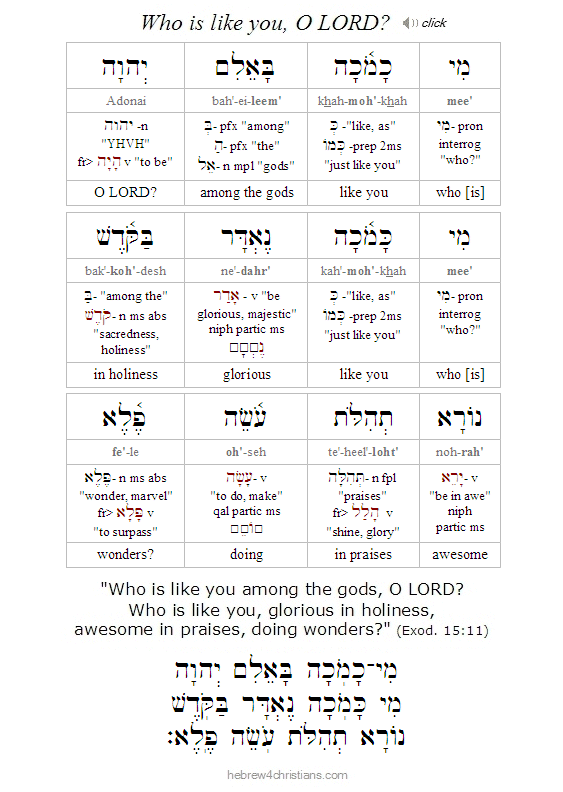 |
Finding the Place of God...
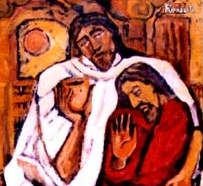
[ Please note that "being home with God's heart" is all that's on my mind recently, and the following post is an attempt to remind myself of the centrality of our heart connection with Yeshua above all else... I hope you find this helpful, but if not, please disregard it. I first talked about this topic with my sons Judah and Manny, and then wrote it down later last night, with tear-stained eyes, fumbling to express myself. It is not a polished piece of writing as much as an earnest meditation of sorts. Shalom. ]
01.22.24 (Shevat 12, 5784) What was it about Yeshua that made him so special? For the moment, put aside your theology or "Christology" and ask what made him so attractive and endearing to people on a human level. What sort of a man was he? What made people want to follow him? Did he have special "charisma" or an aura about him?
We really don't know the answer to these questions, of course, since the New Testament says little about his physical appearance, though the prophet Isaiah foretold that he would be a man of "no reputation," with no regal form or "comeliness" with which we would desire him. Indeed, he would be "despised and rejected of men, a man of sorrows, and acquainted with grief" (Isa. 53:2-3). Indeed Yeshua was born into this world in obscurity, grew to become an unassuming man, a "nobody" in the eyes of the world, without power or political authority. For all the more reason then does this suggest that what made him so attractive to others was his heart, his kindness, and his accessibility, and that's part of the lesson we learn by the invitation he gave to the two disciples of John the Baptist to come to his home.
Recall that the New Testament records how John the Baptist began announcing the imminent coming of the Messiah, calling the people to repentance. One day John saw Yeshua of Nazareth and proclaimed: "Behold the Lamb of God who takes away the sins of the world!" (John 1:29-30). Two of John's disciples (thought to be Andrew and John, author of the fourth gospel) were standing with him at the time and they believed John's testimony that Yeshua was the promised Savior of Israel. Indeed John had explained that the purpose of his ministry was to herald the coming of Messiah, and his preaching was intended to prepare the people for the momentous hour. Therefore when John identified Yeshua as the "Lamb of God who takes away the sins of the world," they understood the implications and immediately decided to follow Yeshua as he walked away. When Yeshua turned to them and asked: "What are you looking for?" they replied, "Rabbi, where do you live?" And Yeshua then graciously invited them to "come and see." So they went to Yeshua's house and stayed with him for the rest of the day (see John 1:35-39). We may wonder, what did they see? What did they do? What did they discuss with Yeshua? We are not told, though it is clear Yeshua was a kind and approachable person, accessible to the seeking heart.
And this presents a sort of "parable" or pattern for anyone who would come to know Yeshua. First there is a deep awareness of the need to repent before God, as John the Baptist had preached, along with the realization that true repentance, or personal salvation, is impossible apart from divine intervention that would free the soul from its bondage to sin. Second there is revelation that points to Yeshua alone as our healer and deliverer. Third there is sincere desire to learn more about him and the nature of his character, and there is an "inner sense" that you are called to "come and see" where Yeshua lives...
This invitation is for all people who are burdened by their sins and who hunger and thirst for deliverance. Yeshua's message finds it place in the heart of the broken: "Come to me, all who labor and are heavy laden, and I will give you rest. Take my yoke upon you, and learn from me, for I am gentle and lowly in heart, and you will find rest for your souls. For my yoke is easy, and my burden is light" (Matt. 11:28-30).
It is this your willingness to accept the invitation to know his heart that marks the first step from which all others follow. Yeshua asks you to feel welcome and safe in his presence, as if you have belonged to him all along, to realize that you are accepted, respected, and dearly valuable to him. This is the "place" of God, the "where" of his presence and the "who" of his character. And indeed, God's Presence is liked to a "house," a "miskhan" or dwelling place, a refuge and sanctuary for the soul, a secret garden, a strong habitation, the everlasting arms of a loving Father, Abba, the one who makes a place for us, an everlasting domicile that will enshrine us in the comfort and blessing of eternal love.
Some people wrestle with shame and feel unworthy of love and blessing. It is hard for them to believe that God bears their sins because they do not believe they matter enough for God to do so. But God affirms and demands that we take his love seriously, that we esteem ourselves as people he loves and cares for despite our sins and failings... His heart extends to the "poor in spirit," to those who mourn over their lives, to the humble, the broken, the wandering outcast, the despised and rejected of men. Yeshua is the "friend of sinners" who calls out to their weariness: "Come to me, and I will give you rest..."
So what do you want? What do you truly desire of the Lord? Yeshua encourages us to come and see who he is and to repose in the place of his dwelling, the habitation of his heart. "Live in me - in the truth of my heart - and let my heart live in you" (John 15:4). This "house" of the Lord is found in heart connection with him, where you accept yourself as beloved in him. It is found in God's presence as Father, Son and Holy Spirit as we are made part of his family, members of his household, and partakers of the blessing of his love.
We start "following" the Lord by first trusting that he really desires us, for assuredly we will cannot do so unless we believe his heart for us, after all. We begin by praying, "Lord, how am I to be with you? How can my heart know your heart for me? How can I connect with you, finding life in your life? Is this not essential - to know who you really are, to experience your mercy and grace, to rest in your steadfast love and faithfulness? How can I experience your acceptance and kindness in light of my brokenness, shame and disappointment? Will you heal the wounds of my heart - wounds that you yourself bore for me in your suffering? I bow down in hope before the cries of my heart. I wait, O Lord, for your touch, the breath of your Spirit, the true balm of Gilead that forever heals my brokenness.
Recall the story about Elijah, dejected, weary, and feeling abandoned. The Lord instructed him, "Go out, and stand on the mountain before the LORD." And behold, the LORD passed by, and a great and strong wind tore into the mountains and broke the rocks in pieces before the LORD, but the LORD was not in the wind; and after the wind an earthquake, but the LORD was not in the earthquake; and after the earthquake a fire, but the LORD was not in the fire; and after the fire a still small voice... And, suddenly there came a Voice to him that asked, "What are you doing here?"
Or consider Job who was described as "a man blameless and upright, one who feared God and shunned evil" who nevertheless was tested and brought to despair and the knife's edge of death. After languishing in dismay, he found himself beneath the whirlwind, beholding the revelation of God's glory, and only afterward was he able to say, "I have heard of thee by the hearing of the ear (לְשֵׁמַע־אֹזֶן שְׁמַעְתִּיךָ): but now mine eye seeth thee (וְעַתָּה עֵינִי רָאָתְךָ). Therefore I forsake myself, and I repent in dust and ashes" (Job 42:5-6).
There is no recipe or formula for following the Lord since it involves turning to God from the depths of your soul, allowing him to be the center of your heart. In a sense it is a matter of losing yourself to find yourself, letting go of your fears and attachments in surrender to God. As we go through the refining fires, we leave behind the old life for the new - crossing over into the realm of the Spirit. Once we take hold of who we are in God's house, the despair that has haunted us fades away and we live in God's provision and abundance.
Faith in the truth of God's love sets us free, though we must be careful not to let our hope wane in quiet desperation. The temptation is to lose sight of God's heart for us or to be dissuaded from our hope because of sadness or fear. God is merciful and will beckon us to return to his love, though if we begin to fall away, he may lead us to confess once again that we are unable to control our lives, that we desperately need him, and to know once again that all that we are or ever shall be is bound up in his presence and love for us.
Yeshua is the answer to our hurting and desperate hearts. It may not be an "easy" answer, but it's the only answer that is real, with love forged in the passion of God's heart, the expense and expanse of which surpasses all of creation, forever and ever. Amen.
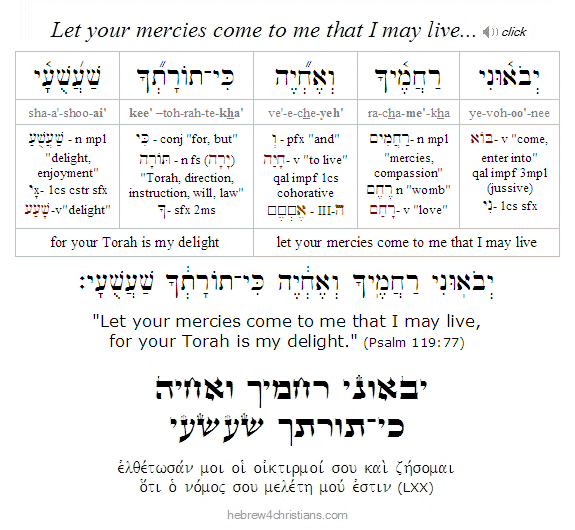 |
This week's Torah:
Parashat Beshalach - בשלח

[ In our Torah portion this week, the Lord divided the waters of the sea to make a path for the Israelites, a miracle that symbolized newness of life as God's liberated people... ]
01.21.24 (Shevat 11, 5784) Last week's Torah portion (i.e., parashat Bo) described how the Israelites were finally released from Egypt after God delivered the final plague during the time of Passover. In this week's portion (parashat Beshalach: Exod. 13:17-17:16), the Israelites begin their journey home, after 430 years of troubled exile. Instead of leading them along a direct route to the Promised Land, however, God directed them south, toward the desert, where the Glory of God appeared as a Pillar of Cloud by day and as a Pillar of Fire by night to lead them on their way. When Pharaoh heard that the Israelites were at the border of the desert, however, he perversely decided to pursue them and bring them back to Egypt. God then redirected the Israelites to camp near the edge of the Sea of Reeds, where the Egyptian army finally caught up with them. Dramatically, the Israelites were caught between the sea on one side, and Pharaoh's formidable army on the other!
The terrified people then began to blame Moses for their predicament. Moses reassured them of God's final deliverance and raised his staff to miraculously divide the waters of the sea. All that night the Shekhinah Glory enshrouded the Egyptian army but gave light to Israel as the people crossed through the sea on dry ground. Just before dawn, the dark pillar of cloud that veiled the Egyptian army lifted, and the soldiers immediately rushed after the Israelites into pathway of the sea. God then told Moses to lift his staff again so that the waters would overwhelm the Egyptians with their chariots and horsemen. By the time dawn arrived, the Israelites saw the dead bodies of Pharaoh's army lining the seashore.
Moses and Miriam then led the people of Israel in a spontaneous hymn of thanks and praise to God for their complete deliverance from Pharaoh, which is often called the "Song of the Sea" (i.e., shirah hayam). The song begins, "The Lord is my strength and song, and he is become my salvation" / עָזִּי וְזִמְרָת יָהּ וַיְהִי־לִי לִישׁוּעָה (Exod. 15:2, cp. Isa. 12:2). For Orthodox Jews, singing Shirat Hayam every day is thought to fulfill the biblical commandment to "remember the day of your departure from the land of Egypt as long as you live" (Deut. 16:3). Note that Shirat Hayam is also sung on the 7th day of Passover, as a memorial of the deliverance by God through the waters of the Sea of Reeds.
 |
The great message of our deliverance resounds throughout Jewish history, and indeed it is regarded as a theme of the faithful love of LORD for His people:
Hebrew Lesson
Isaiah 12:2 Hebrew reading (click):
After their jubilation, the narrative resumes as God led the people away from the sea, into the desert of Sin (מִדְבַּר־סִין), a desolate region about midway to Mount Sinai. After traveling three days without finding any water, however, the people complained and God provided them with fresh water at Marah. Awhile later, the matzah (unleavened bread) the people had brought with them ran out and God tested their obedience by giving them "bread from heaven" (i.e., manna). The portion ends with the Amalekites' surprise attack of Israel at Rephidim, near Mount Sinai, and the selection of Joshua as the leader of the army of Israel.
Testing and Endurance...
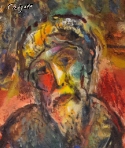
01.19.24 (Shevat 9, 5784) When the Apostle Paul wrote, "in everything give thanks, for this is the will of God" (1 Thess. 5:18), he surely foresaw the prospect of suffering. Indeed, it is through "much tribulation" we enter the kingdom of God (Acts 14:22). We do not ask God to insulate us from all troubles, but rather to be given courage to carry on despite whatever tests he permits in our lives. Hence one of our standard blessings is: בָּרוּךְ אַתָּה יהוה הַנּוֹתֵּן לַיָּעֵף כּחַ / barukh attah Adonai ha'noten lai'ya'ef koach: "Blessed are You, LORD, who gives strength to the weak." The Lord never "breaks" before offering His blessing (Mark 6:41), and personal brokenness is the means of instilling His character within us (Gal. 2:20). Indeed in the Torah we read: "I am the LORD your Healer" (אֲנִי יְהוָה רפְאֶךָ; Exod. 15:26). The sages comment that just as someone who wishes to repair an object will need to take it apart, so it is with God. When we seem to be broken in pieces we cry out for deliverance and healing, but inwardly we are being conformed to the deeper image of Messiah. Like Jacob, we wrestle with God to know our wound as well as our healing.
As it is written in our Scriptures: "So we do not lose heart. Though our outer self is wasting away (διαφθείρεται), our inner self is being renewed day by day. For this light momentary affliction (θλῖψις) is preparing for us an eternal weight of glory beyond all comparison, as we look not to the things that are seen but to the things that are unseen. For the things that are seen are transient, but the things that are unseen are eternal" (2 Cor. 4:16-19). As our Scriptures also affirm, God is "the Father of Mercies and God of all comfort" (אַב הָרַחֲמִים וֵאלהֵי כָּל־נֶחָמָה). The Lord "comforts us" (literally, "calls us to His side," παρακαλέω) in our afflictions so that we may be able to comfort those who are afflicted with the same comfort with which we ourselves are comforted by God (2 Cor. 1:3-4). Amen.
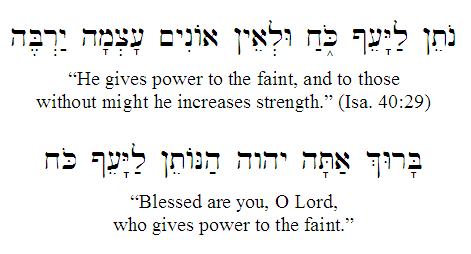 |
Hebrew Lesson
Psalm 34:19 Hebrew reading:
Not losing your mind...
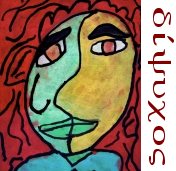
01.19.24 (Shevat 9, 5784) The Apostle Paul wrote that the time before the "End of Days" would be "perilous" and full of unrelenting human depravity and lawlessness (2 Tim. 3:1-5). Yeshua warned that apostasy would abound and that the hearts of many would run cold as ice (Matt. 24:12). In light of the raging spiritual war going on all around us, the following needs to be emphatically restated: "The important thing is to not lose your mind..."
The mind is the "gateway" to your heart, and it is therefore essential to guard your thinking by immersing yourself in the truth... "Not losing your mind" therefore means being grounded in what is real, and it therefore means understanding your identity and provision as a child of God. "God has not given us the spirit of fear, but of power and of love, and of a sound mind" – literally, a "delivered" mind, "healed" from chaos and despair (2 Tim. 1:7). The Greek word "sound mind" (σωφρονισμός) comes from a verb meaning "to be made safe," in the sense of being under restraining influence of the Spirit of God... The closest Hebrew word might be musar (מוסר), or "moral discipline."
With the appearance of "mass formation psychosis" rampant today (i.e., collective insanity), it's now more important than ever to guard your heart and mind. Learn to practice clear thinking; define terms you use without equivocation; take care to avoid biased ways of seeing, and avoid common fallacies such as making appeals to fear, blaming others (tu quoque), and so on... Be on guard because the enemy of your soul wants to lead you astray. Above all ask God for wisdom for this hour, which is full of peace (James 3:17).
Hebrew Lesson
Prov. 28:26 Hebrew reading (click):
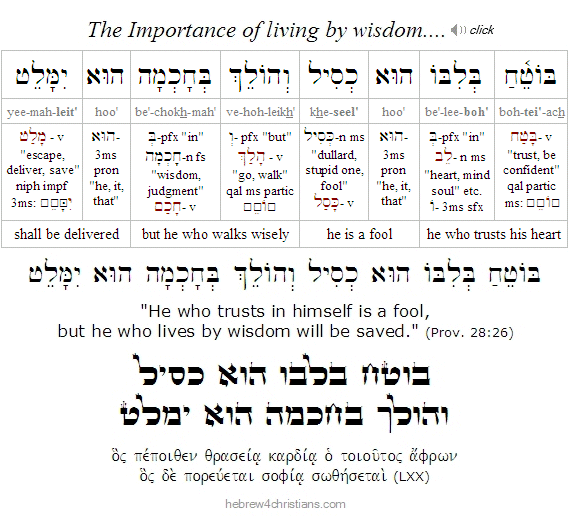 |
Deliver us from Ourselves...

[ Shalom friends. Thank you for your prayers for me (John) and this ministry. Things have been really hard lately, with various issues and challenges. I apologize if any of the struggles I am facing have affected any of you. God is faithful, no matter what, and this is the day He has made, so let us rejoice and be glad in it.... ]
01.19.24 (Shevat 9, 5784) We all struggle with sin in our lives, and each of us needs deliverance from various attachments and fears that keep us from the deeper life... The problem is within ourselves, that is, the contradiction of heart we experience in our double-mindedness, our ambivalence, and our unbelief (Jer. 17:9). We may recite the Shema every day and say that we love God with all our being, but in the ordinary moments of daily life we are drawn to other concerns, alien affections, other "gods." Indeed, whatever matters most to us, whatever consumes our attention, time, resources, and our interest, is something we "worship," that is, something we esteem as worthy and valuable...
People necessarily value things, and therefore every person alive is a "worshiper" (i.e., a person who finds "worth" in something). This applies equally to a devout atheist or pious skeptic as much as it does a deeply religious person... The question that matters, however, is what is your ultimate concern? What do you really want? Only when we begin to understand what draws and attracts us can we begin to discern what we really need. Therefore we must first acknowledge our false worship, our radical selfishness, and our sundry attachments in order to be set free. We must confess the truth that we are slaves.
Pride blinds us to the truth of our sickness, persuading us to deny our problems, to cover them up, and to try harder and harder to "control" ourselves. This is a spiritual dead-end, a vicious circle, the "law of sin and death." We are set free, however, when we die to ourselves, that is, when we surrender to the love of God and receive the miracle of promised deliverance. Since we are powerless to change ourselves, to reform our lower nature, and to be healed by our own best efforts, we must abandon our "religion" and rely entirely upon the God for the power to heal. This is an ongoing venture: We die daily; we take up the cross daily, we walk with a limp from our inner struggle, and we cling to God alone show us the way and to guide our steps. Beloved, we have been crucified with Messiah and the old nature has lost its power over us; we are alive by the miracle of God's power. May God deliver us from ourselves. "If we live by the Spirit, let us also walk in the Spirit" (Gal. 5:25).
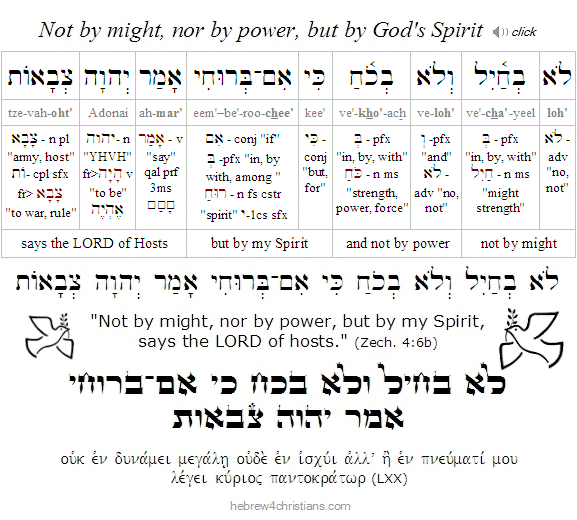 |
Finding True Life...
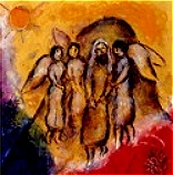
[ You can't die "in him" if you have never lived in him; and if you live in him, nothing can separate you from his love and life... ]
01.18.24 (Shevat 8, 5784) The Hebrew word for "life" is chayim (חַיִּים), which is written in the plural to imply that life cannot be lived alone... Embedded within the word itself are two consecutive Yods (יי), representing unity in plurality (Yod-Yod is also a Name of God). Therefore the LORD is called Elohim Chayim (אֱלהִים חַיִּים), "the Living God," and we only come to life through our union with Him. Chayim may be formed from the word chai (חי), "alive" combined with the particle im (אם), "if," suggesting that being alive is conditional on our union with God in the truth. "Whoever believes in the Son has eternal life (חַיֵּי עוֹלָם); whoever refuses the Son shall not see life, but the separation of God remains" (John 3:36). Life and peace are therefore inextricably connected, and those who refuse Yeshua, the Prince of Peace (שַׂר־שָׁלוֹם), therefore separate themselves from unity with God. Yeshua alone is the means of receiving the divine life: "Whoever has the Son has the life (הַחַיִּים); but whoever does not have the Son of God does not have the life" (1 John 5:12).
God has "made us alive together with Messiah" (Eph. 2:5). The two Yods in the word "life" (חַיִּים) can also be seen as the two outstretched arms of Yeshua, or one Yod can represent our spirit and the other the Spirit of God. God's life is such that it is never diminished as it shared but instead grows in miraculous ways. This is alluded to by the Hebrew word for love (i.e., ahavah: אהבה), the gematria of which is thirteen (1+5+2+5=13), but when shared with another it is multiplied: 13 x 2 = 26 - the same value for the Sacred Name (יהוה), i.e., (10+5+6+5=26). The love of God given in Yeshua is the very life of the universe...
Hebrew Lesson
John 6:63a reading (click):
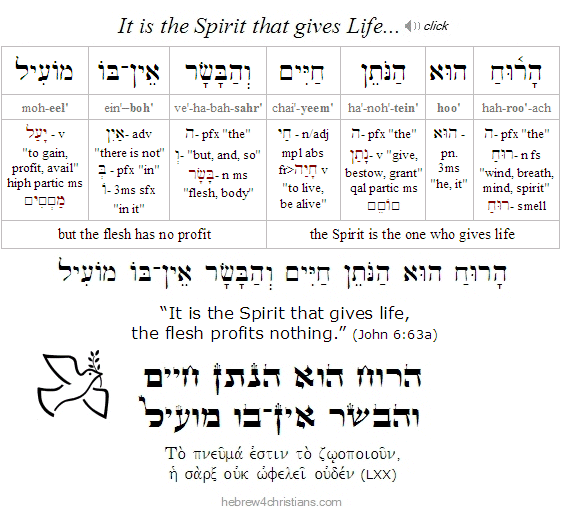 |
Essential Jewishness...
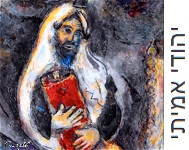
01.18.24 (Shevat 8, 5784) In this week's Torah reading, parashat Bo, we read about the final plague that God would bring upon Pharaoh and the Egyptians. The previous nine plagues were terrible in consequence and clearly demonstrated God's justice and power, but the death of the firstborn (i.e., makkat bechorot: מַכָת בְּכוֹרוֹת) was the final blow that would break Pharaoh's hard heart and cause him to repent of his oppression of the Israelites.
According to some Jewish thinkers, the final plague was intended to impugn the ancient institution of "primogeniture," that is, the special status and privilege given to the firstborn son. Consider, for instance, the Torah's narratives about Cain and Abel, Ishmael and Isaac, Esau and Jacob, Reuben and Judah, Manesseh and Ephraim. Or think about the choice of Moses or King David. In each of these cases the firstborn son was "passed over" by God; in each case devotion to God trumped family "pecking order." In other words, the Torah makes the point (repeatedly) that personal godliness is more important than genealogy or genetics. Unlike ancient Egypt, people are not to be given special treatment because of their birth order or their lineage, certainly not before the Master of the Universe who is "no respecter of persons" (Deut. 10:17, 16:9; Prov. 24:23, Rom. 2:11, etc.). "Freedom from slavery" means more than recreating yet another caste system...
But what about Israel being called the "firstborn son" of God (בְּנִי בְכרִי יִשְׂרָאֵל)? The sages state that this status must be regarded as sacred because of God's promise to the Jewish people, but individually speaking, if a Jew does not keep the Torah or keep faith with the LORD, he will be "passed over" as well... Okay, but what about the selection of the Levites? Were they not "exchanged" for the firstborn sons of Israel because of the sin of the Golden Calf? Yes, but that in itself lends credence to the idea that status as a favored child of God comes through faith and obedience, since it was the Levite tribe that did not lapse in faith by worshipping the golden calf idol (Exod. 32:27-28). Later, of course, the Levites became itinerant teachers in Israel (living in Cities of Refuge), but eventually spiritual leadership was assumed by the Sages who through study and devotion to the Torah became the chosen sons of Israel. By the time of Yeshua personal godliness was recognized as more important than physical lineage or genealogy...
All of this leads to questions about the meaning or essence of "Jewishness." The word "Jew" (יְהוּדִי) comes from the patronym "Judah" (יְהוּדָה), which derives from a root (יָדָה) that means "to confess, to give thanks, to laud, or to praise." Note that every letter of the Divine Name (יהוה) appears in the word Judah. In Jewish tradition, there are two basic views about the essential character of the Jewish people (יַהֲדוּת). First, Rabbi Yehuda Halevi takes an ethnocentric approach by claiming that the Jewish soul is somehow different than the non-Jewish soul, possessing a mystical quality called "segulah" (סגולה). The Jew is therefore ontologically different than the Gentile, possessing a "higher-grade" neshamah (נְשָׁמָה), or soul. This is the "tribalist" mentality that is often embraced in various ultra-Orthodox communities... Maimonides, on the other hand, who was more Greek-minded, stated that there is nothing extraordinary about the Jewish soul in itself, but only if a Jew keeps the Torah is he worthy of the name, and if not, he is just like a non-Jew. It is the Torah - and the Torah alone - that makes a Jew special and holy.
Rabbi Abraham Isaac Kook (1865–1935), the first Ashkenazi Rabbi of the modern State of Israel, attempted to mediate these views by quoting the Talmud (Sanhedrin 59a): "You shall therefore keep my statues and My ordinances, which if a man (adam) does, he shall live by them..." (Lev. 18:5). R' Meir interprets that the Torah's choice of the word "human" (adam) means that even a non-Jew who keeps the Torah and mitzvot is as great as the High Priest.
In other words, personal godliness is the issue, not genealogy. Jews cannot rely on their mere inclusion of ethnic Israel for righteousness (though God has indeed promised a glorious future to ethnic Israel). Indeed, if a Jew is ungodly, then a godly Gentile is considered more righteous than they (Rom. 2:27). Once again, individual godliness is more important than ethnic identity or genetics.
The Apostle Paul, the quondam student of Gamaliel the Elder (רַבַּן גַּמְלִיאֵל הַזָּקֵן) -- who was the grandson of the sage Hillel the Elder (הלל הזקן) -- had argued along these same lines in his epistle to the Romans:
"Circumcision indeed is of value if you obey the law, but if you break the law, your circumcision becomes uncircumcision. So, if a man who is uncircumcised keeps the precepts of the law, will not his uncircumcision be regarded as circumcision? Then he who is physically uncircumcised but keeps the law will condemn you who have the written code and circumcision but break the law. For no one is a Jew who is merely one outwardly, nor is circumcision outward and physical. But a Jew is one inwardly, and circumcision is a matter of the heart, by the Spirit, not by the letter. His praise is not from man but from God." (Rom. 2:25-29)
The very first occurrence of the word Torah (תּוֹרָה) in the Scriptures speaks of Abraham's obedience to God's instruction (Gen. 26:5), and the second occurrence occurs in the verse that says, "There shall be one law for both the native and for the stranger..." / תּוֹרָה אַחַת יִהְיֶה לָאֶזְרָח וְלַגֵּר (Exod. 12:49), referring to the observance of Passover. Torah - in terms of general instruction regarding the will of God - was always meant to be for all people...
Finally, what do we make of the idea that ethnic Israel is called the "first born" of God (Exod. 4:22)? Well, despite the fact that "Jewishness" is a matter of the heart - not of genetics - there are still prophetic promises given to the physical descendants of Abraham, Isaac, and Jacob to inherit the land, to be supernaturally preserved as a people, and to be recipients of the Millennial Kingdom of God on the earth. The LORD has always had a remnant of Israel (i.e., she'arit Yisrael: שארית ישראל) that has believed in Him - and this remnant today includes those Jews who have accepted Yeshua as their Messiah. But the Hebrew prophets are explicit: There awaits a future yet to be fulfilled for ethnic Israel. Yeshua confirmed this when He said He would return to Jerusalem at the end of the "End of Days." As the Apostle Paul said: "And in this way all Israel will be saved, as it is written, 'The Deliverer will come from Zion, he will banish ungodliness from Jacob'" (Rom. 11:26).
So what might all this mean for you? Well, if you are someone who genuinely trusts in Yeshua as your Savior and Israel's Messiah, then you share the heritage and glory of Israel -- regardless of your personal DNA or your particular genealogy. By God's mercy you have been "grafted in" to the covenants, blessings, and promises given to the "commonwealth of Israel." As Paul says, you are no longer an "alien" or "stranger" to God's family but can call upon the LORD God of Israel as your God (Eph. 2:12). As a follower of the Jewish Messiah, you are now made a "Jew inwardly" (i.e., yehudi shebe'lev: יְהוּדִי שֶׁבַּלֵּב) with a circumcised heart (Rom. 2:29, Col. 2:11). You understand that just as the LORD God of Israel will never forsake His covenant promises to the descendants of Abraham, Isaac, and Jacob, neither will He ever forsake His covenant love for you... Bless His glorious Name!
Hebrew Lesson
Genesis 29:25b reading (click for audio commentary):
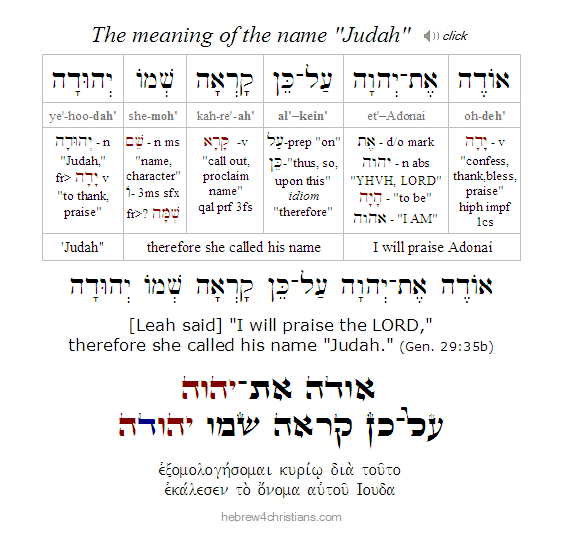 |
The Great Lamb of God...
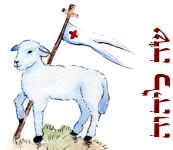
01.18.24 (Shevat 8, 5784) From our Torah portion this week (i.e., parashat Bo) we learn that though God instructed each household to select its own lamb for the Passover, the Torah refers to "the" Lamb of God, as if there was only one: "You shall keep it [i.e., the Passover lamb] until the fourteenth day of this month, when the whole assembly of the congregation of Israel shall slaughter him (אתוֹ) at twilight (Exod. 12:6). Note that the direct object "him" (i.e., oto) can be read as Aleph-Tav (את) combined with the letter Vav (ו), signifying the Son of Man who is First and Last... Indeed there is only one "Lamb of God" that takes away the sins of the world, and that is our Savior, Yeshua the Messiah...
רָאוּי הַשֶּׂה הַטָּבוּחַ לְקַבֵּל גְבוּרָה
עשֶׁר וְחָכְמָה וְכּחַ וִיקַר וְכָבוֹד וּבְרָכָה
rah·oo'·ee · ha·seih · ha·tah·voo'·ach · le·ka·beil · ge·voo·rah
oh'·sher · ve·chokh·mah · ve·koh'·ach · vee·kar · ve·khah·vohd · oov·rah·kha

"Worthy is the Lamb who was slain, to receive power and wealth and wisdom
and might and honor and glory and blessing"
(Rev. 5:12)
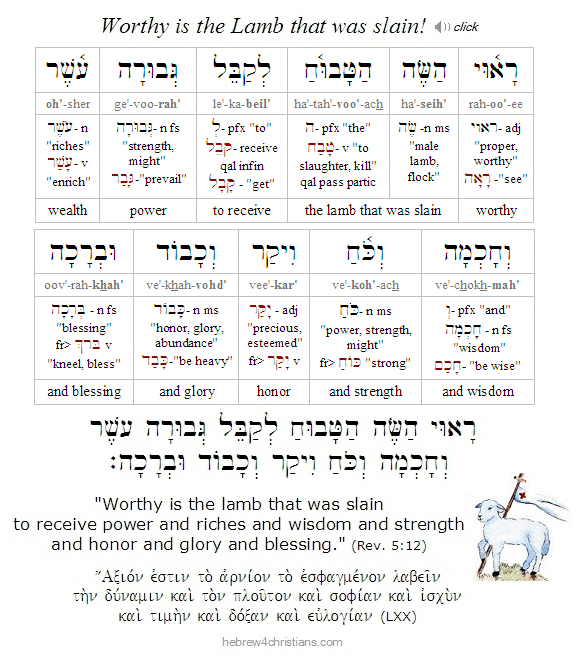
The Sequence of the Plagues...
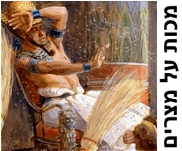
[ The following entry is related to this week's Torah reading, parashat Bo... ]
01.18.24 (Shevat 8, 5784) In parashat Bo we arrive at the successful conclusion of the LORD's campaign to free Israel from bondage in Egypt. Immediately following the description of ninth plague (i.e., the plague of darkness), redemption through the sacrifice of the Passover lamb (קָרְבָּן פֶּסַה) is explained. The Jewish people were saved by offering the blood of the lamb, just as today we call upon Yeshua as the Lamb of God. Notice that the word בּא ("go") and פרעה ("Pharoah") together equal the gematria of משׁיח ("mashiach"), providing a hint of the coming Messianic redemption that was foreshadowed in Egypt. Every jot and tittle, friends...
Regarding the sequence of the plagues (רֶצֶף הַמָּכּוֹת), Rabbi Bechaye (11th century, Spain) wrote that they followed one another over a twelve-month period. On Nisan 15 God spoke to Moses from the burning bush and commissioned him to go to Pharaoh. On Nisan 21, Moses told his father-in-law Yitro (Jethro) of his mission and left for Egypt. Near the end of the month of Nisan, Moses immediately went before Pharaoh and warned him to release the Jews. For the next three months (Iyyar, Sivan, and Tammuz), Moses went into hiding and instructed the elders of Israel regarding their coming deliverance. The plague of blood began on the first of Av and lasted seven days. A respite of three weeks occurred before the next plague (frogs). This was the pattern for all the ten plagues (i.e., roughly a plague a month). The last plague - that of the death of the firstborn - occurred in the month of Nisan, a year after Moses first warned Pharaoh (Exod. 4:22-23). The period of the plagues therefore totaled twelve full months, at least according to Jewish tradition (Tzenah Urenah):
- Av 1 - Blood (i.e., dam: דָם)
- Elul 1 - Frogs (i.e., tzefarde'a: צְּפַרְדֵּעַ)
- Tishri 1 - Lice (i.e., kinim: כִּנִּים)
- Cheshvan 1 - Swarms (i.e., arov: עָרוֹב)
- Kislev 1 - Pestilence (i.e., dever: דֶּבֶר)
- Tevet 1 - Boils (i.e., shechin: שְׁחִין)
- Shevat 1 - Hail and Fire (i.e., barad: בָּרָד)
- Adar 1 - Locusts (i.e., arbeh: אַרְבֶּה)
- Nisan 1 - Darkness (i.e., choshekh: חוֹשֶך)
- Nisan 15 - Death of the firstborn (i.e., makat bechorim: מַכַּת בְּכוֹרוֹת)
Here is a simplified diagram of the sequence given in the midrash:
The story of yetziat mitzraim (the Exodus from Egypt) is to be retold to every generation, and its lessons are to be applied to every age and place. Hence the Passover Seder and its focus on the needs of children. The Hebrew word for "education" is chinukh, a word that shares the same root as the word "chanukah" (חֲנֻכָּה, dedication). We "tell the story so that we may know" that the LORD is God (Exod. 10:2). Education is ultimately devotional. God called the people of Israel to cleave to Him and walk in His ways....
Before the LORD administered the final plague - the dreaded makkat bechorot (death of the firstborn) - he instructed Moses to "please ask the Israelites to borrow from the Egyptians gold and silver..." (Exod. 11:12). According to the sages, this request was made so that God's promise made to Abraham would be fulfilled (i.e., that his descendants would escape from their bondage and afterwards come out with great possessions (Gen. 15:13-14)). According to midrash, when Moses announced the final plague, all the firstborn of Egypt gathered and demanded that the Israelites be set free. "Let the people go, for all that Moses speaks is fulfilled." The firstborn then began striking their fathers and took their jewels, silver, gold, etc. -- which they then entrusted to Moses. On the night they were killed by the plague, Moses was left with their wealth. The booty taken by the Israelites was regarded as uncollected wages for hundreds of years of forced labor.
The blood of the korban Pesach - the Passover lamb - was to be smeared on the two sides and top of the doorway, resembling the shape of the letter Chet. This letter, signifying the number 8, is connected with the word חי (chai), short for chayim (life). The blood of the lamb (דַּם הַשֶּׂה) not only saves from the judgment of death, but also is a symbol of divine life. At the very moment when God "passed over" the houses of the Israelites, all the idols of the Egyptians were destroyed.
The Kingdom of Heaven is assuredly not the same as the kingdom of man. Judgment is coming upon the world, just as it was in the days of Pharaoh. The day draws near. It's just a matter of time... The greater question is whether you are accounted as part of redeemed Israel or as part of the corrupt world system. May God Himself help you choose...
Hebrew Lesson
Proverbs 16:4 reading (click to listen):
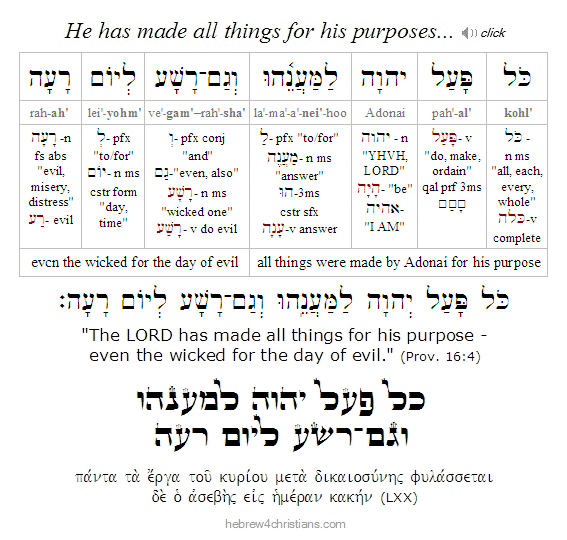 |
Tears in His Bottle...
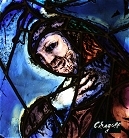
01.17.24 (Shevat 7, 5784) "Godly sorrow works teshuvah (repentance) unto salvation" (2 Cor. 7:10). This deep sorrow is more than just sadness or regret over some sin or wrongdoing of your past. Genuine godly sorrow expresses inner poverty - being "poor in spirit" - wherein the heart realizes that sin is not something "out of character," as if it did not really come from you, but rather that it is a dreadful sickness of your own soul, an inner power or corrupting force from which you need divine intervention and deliverance (Jer. 17:9). We are not sinners because we sin; we sin because we are sinners...
The Puritans prayed for the "gift of tears" by which they meant the healing virtue of experiencing genuine repentance before God. They asked God for help because doing teshuvah - really doing it as opposed to just thinking you did - requires a miracle, a profound change of direction, a new way of seeing. In general our lives are a tangled web of deceit, self-deception, ignorance, folly, and so on, and when we are confronted with a particular sin, we are quick to rationalize and even deny our responsibility. Jean Paul Sartre would call this mauvaise foi, or "bad faith," that is, the habit of denying that our actions have real consequences for which we alone must bear. Often it takes many years to truly understand the depth of our inner corruption, the sickness of our souls, the way we deceive ourselves and make excuses for the sorrows and pains we have caused others and ourselves.
So how long has it been since you have wept over your sinful condition? Not how long has it been since you have revisited some regret from your past - but how long has it been since you have "collapsed in on yourself," confessing the horror and revulsion over your forlorn and desperate soul? Do you feel in your bones the awfulness of your sinful life? Or are you quick to make excuses for your wretchedness? Do you find fault in others to justify your own hardness of heart? Do you harbor secret resentment enabling you to hold on to your sickness? These are "worldly sorrows" that work death (2 Cor. 7:10). We may give lip service that we are sinners, but do we feel the grief and weight of our sin? Do we abhor ourselves and repent in dust and ashes? (Job 42:6). Dear friend, how can God wipe away every tear from our eyes in the next world if we have not wept in this one?
On the other side of our confession of brokenness we discover that God consoles us for the wounds we suffer in this life. It is written in our Scriptures: "You have kept count of my miseries; store my tears in your bottle. Are they not in your book?" (Psalm 56:8). The LORD "numbers" or "recounts" the heartaches and wanderings of your life; He keeps an account or a record of your trouble in His "scroll of remembrance" (Mal. 3:16). God does not overlook the anguish of your heart but carefully numbers each of your tears, storing them "in His flask," which may allude to the ancient custom of putting tears shed for the death of someone into a small container (i.e., "tear bottles"). The picture is one of profound intimacy and comfort, when in the world to come the LORD will personally console you for your sorrows. Not one pain of your life will be overlooked by heaven.
May our hearts be both softened and full of conviction as we ponder these things. Amen.
Hebrew Lesson
Psalm 56:8 Hebrew reading (click):
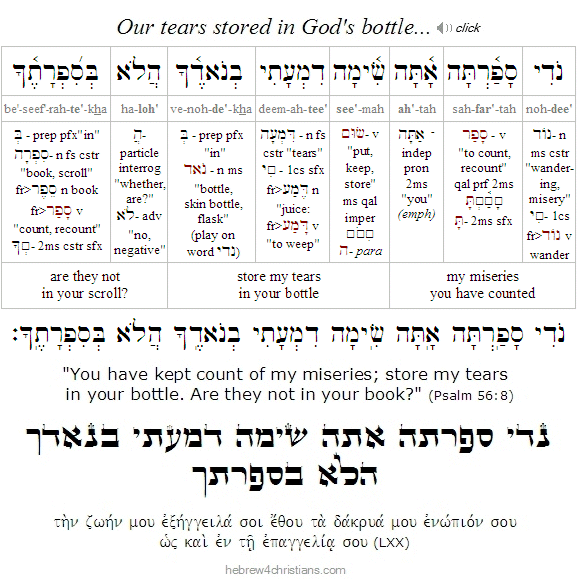 |
Should we live in fear of ourselves? After all, "the heart is deceptive above all things and desperately wicked" (Jer. 17:9), and it is woefully easy to fool ourselves regarding our sins (1 Cor. 8:2; Gal. 6:3; James 1:26). Well on the one hand we should indeed be afraid of our own sinful condition and abhor the sin in our lives, but on the other we must practice hope in God and trust in his healing and deliverance. Moreover, we can experience freedom from dread by receiving the joy that comes from the assurance that we are accepted in the Beloved. We must understand our sin in relationship to the wounds of the Savior, since without that connection, our repentance will be vain indeed.... God has not given us a spirit of slavery to fall back into fear; and there is no fear in His love (Rom. 8:15; 2 Tim. 1:7; 1 John 4:18). Of course we all will fail the test apart from the grace and love of God, and no one can be approved by means of the unaided will. We all need a miracle from God to love Him in the truth and to pass the test -- but God is the One who performs miracles for us. The LORD is Adonai Nissi (יהוה נִסִּי), the God of my miracle...
Retelling the Story...
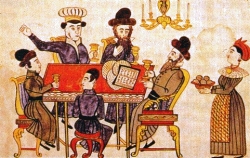
[ We are always re-telling the great story of God's salvation, chaverim... ]
01.17.24 (Shevat 7, 5784) In our Torah reading for this week (i.e., parashat Bo) we are commanded to retell "in the hearing of your son and your grandson" how the LORD overthrew the arrogance of the Egyptians and performed wonders to deliver us" (Exod. 10:2). This commandment is the basis of the Passover haggadah (i.e., הַגָּדָה, "telling"), the "oral tradition" of our faith, when we personally retell the story from generation to generation so that the spirit of the message is not lost. We participate in the Passover seder to make it "our own story," a part of who we are. Therefore b'khol-dor vador: "Every Jew must consider himself to have been personally redeemed from Egypt." Retelling the story of the exodus enables us to "know that I am the LORD" (Exod. 10:2). We recall the words, bishvili nivra ha'olam – "For my sake was this world created," while we also recall the words, anokhi afar ve'efer – "I am but dust and ashes." When we retell the story of the great redemption, we strengthen our faith and better know the LORD God our Savior.
Indeed God admonishes that the story of our redemption should be "as a sign on your hand and as a memorial (זִכָּרוֹן) between your eyes, that the Torah of the LORD may be in your mouth" (Exod. 13:9). We are instructed to "remember" (זָכַר) over and over again because our disease, our sickness of heart, induces us to forget how we were enslaved in the house of bondage. We must consciously remember and never forget that only by means of God's strong hand (בְּיָד חֲזָקָה) are we ever made free (John 8:36). Amen.
וְהָיָה לְךָ לְאוֹת עַל־יָדְךָ
וּלְזִכָּרוֹן בֵּין עֵינֶיךָ
לְמַעַן תִּהְיֶה תּוֹרַת יְהוָה בְּפִיךָ
כִּי בְּיָד חֲזָקָה הוֹצִאֲךָ יְהוָה מִמִּצְרָיִם
ve·ha·yah · le·kha · le·oht · al-yah·de·kha
ool·zee'·kah·rohn · bein · ei·ney'·kha
le·ma'·an · tee·he·yeh · toh·raht · Adonai · be·fee'·kha
kee · be·yahd · cha·zah·kah · ho·tzee·a·kha · Adonai · mee·meetz·rah'·yeem

"And it shall be to you as a sign on your hand
and for a memorial between your eyes,
that the Torah of the LORD may be in your mouth.
For with a strong hand the LORD has brought you out of Egypt."
(Exod. 13:9)

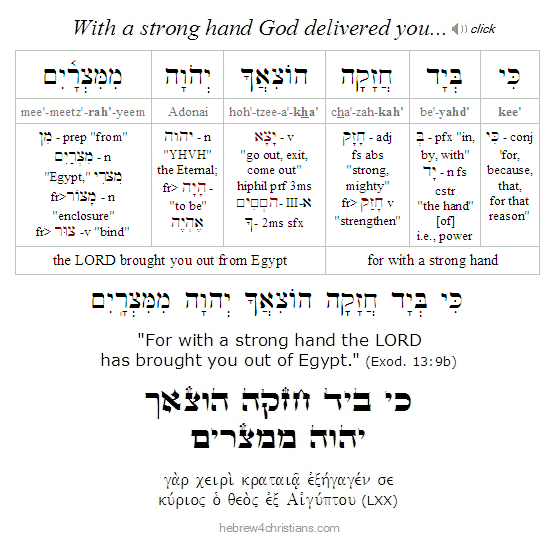
The Exodus Parable...

[ The following entry is related to this week's Torah reading, parashat Bo... ]
01.17.24 (Shevat 7, 5784) The great exodus of Israel from Egypt (יציאת מצרים) is the central parable of the Torah, and indeed of the entire Bible. It provides a picture of our salvation given in Messiah. The bondage of the Israelites to Pharaoh represents humanity's slavery to sin; redemption from this bondage is effected by trusting in the blood of the sacrificial lamb of God; deliverance from death to life is depicted through baptism into the Sea of Reeds; the journey to truth represents the pilgrimage to Sinai, and so on.
It is important to see that the great redemption in Egypt led directly to revelation given at Sinai exactly 49 days later, and when the LORD God there gave his people the Ten Commandments, he did not begin by saying he was their Creator, but rather their Redeemer: "I am the LORD your God (אָנכִי יְהוָה אֱלהֶיךָ), who brought you out of the land of Egypt, out of the house of slavery" (Exod. 20:2). This is because the purpose of the creation itself is to demonstrate God's redemptive love and to be known as our Savior and Redeemer, just as Yeshua is the "Lamb slain from the foundation of the world" (Rev. 13:8; 1 Pet. 1:18-20; Eph. 1:4; 2 Tim. 1:9). "All things were created by Him (i.e., Yeshua), and for Him" and in Him all things consist (συνεστηκεν, lit. "stick together") (Col. 1:16-17).
Creation therefore begins and ends with the redemptive love of God as manifested in the Person of Yeshua our Mashiach, the great Lamb of God and our Savior... He is the Center of Creation - the Aleph and Tav - the Beginning and the End (Isa. 44:6; Rev. 1:8). All the world was created for the Messiah: "For from him and through him and to him are all things. To him be glory forever. Amen" (Rom. 11:36).
Hebrew Lesson
Isa. 44:6b reading (click):
Hebrew Lesson
Compare: Rev. 1:8 reading (click):
The Heart of Reality...
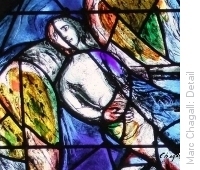
[ "We are all insane. That is what original sin means. Sin is insanity. It is preferring finite joy to infinite joy, creatures to the Creator, an unhappy, Godless self to a happy, God-filled self. Only God can save us from this disease." - Peter Kreeft ]
01.16.24 (Shevat 6, 5784) "I determined not to know any thing ... apart from Yeshua the Messiah and him crucified" (1 Cor. 2:2). This mode of "not knowing apart" bespeaks a radical intimacy that mediates and transforms all other thought within you. It is the axiom of spiritual existence, the matter of "first importance," the heart of everything: to know the healing love of Messiah and the power of his resurrection on your behalf (Phil. 3:10). When you accept the Divine Presence in Yeshua, everything becomes simple, unified, and focused. Choosing to know everything "through" Yeshua moves you to the center of reality - where the present moment is lit up with the glorious light of the eternal... You begin to see past the distractions of this world - "for God is not in the earth, wind or fire" (1 Ki. 19:11-12) - beyond the ups and downs of your life, the hunger and thirst of your heart, past all your fears, desires, and sorrows, to hear the "still small voice" (i.e., kol demamah dakkah: קוֹל דְּמָמָה דַקָּה), to enter wonderful peace, the place of God (i.e., ha'makom: הַמָּקוֹם) which is your true home, the habitation of our all-loving Father who calls you by name...
"To all who overcome I will give a bright stone..." (Rev. 2:17). But what do you overcome if not unbelief, the fear that the miracle is not for you, the terror that you are not welcome in the most significant sense of reality? Many forfeit the highest for the sake of lesser things. We overcome despair by means of faith - by trusting in the One who gives us the victory (1 Cor. 15:57; 1 John 5:4-5). There is no "overcoming" apart from the love of God, who takes us up into his life and gives us his triumph over sin and death. Glory belongs to the Lord...
Hebrew Lesson
Psalm 104:31 Hebrew reading (click):
Forsake me not, O LORD...
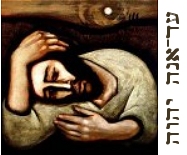
01.15.24 (Shevat 5, 5784) Though it is a great comfort to understand that God will never leave nor forsake us, he nevertheless allows trouble in our lives so that we will learn to call upon him and know his heart in our struggles (1 Pet. 1:5-9; Hos. 6:1-3; Job 5:18; Jer. 3:22). For how else will we receive the truth of our great need for him, and how else will we realize his great provision? This is the intimacy given in affliction. "Blessed are the poor in spirit," describes the poignant awareness of our inner poverty, our bankruptcy of heart, the destitution of our condition (Matt. 5:3). We cry inwardly, "Forsake me not, O LORD: O my God, be not far from me" (Psalm 38:21) because we realize our need for deliverance from ourselves; we understand that we cannot take even a step in his way apart from his upholding. As Kierkegaard said: "We know that if God should put to the test our faithfulness to him, we know well that at the moment of testing, he himself must hold on to us, that is, we know that at bottom we are unfaithful, and that every instant it is he who at bottom holds us." Amen, as the Spirit intercedes: סְעָדֵנִי וְאִוָּשֵׁעָה - "Hold me up, and I shall be made safe, and I shall observe your statutes continually" (Psalm 119:117).
Hebrew Lesson
Psalm 119:117 reading (click):
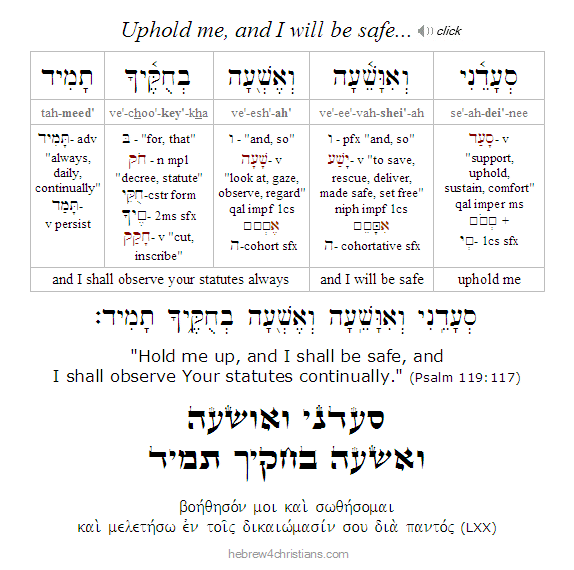 |
"Do not forsake me, O LORD," is the mantra in our darkness, the antiphon of God's promised Presence, despite the devouring gloom; it is the cry of the heart that knows that only God can get us through the next moment and its temptation to despair. "Do not forsake me, O LORD, lest I be swallowed up by my pain, my fear, my sadness, my anguish of heart; do not forsake me, for I am nothing but the anguish of the moment, the sorrow of loneliness, the fear of my own heart as I tremble before you in my desperation; O do not forsake me...."
O LORD, You came to heal the sick; you spoke life to those who are without strength or remedy; you came to seek the lost, to find those who are without a place or sense of belonging in this world. O Lord, you know that without you I can do nothing; you know that I weak, poor, and needy; my path is perilous and I have no hope apart from you. Be not far from me; do not leave me to my own devices nor the counsel of my own soul. Save me, O God, for the glory of your Name; be magnified in your heart of love and faithfulness. Amen.
Hebrew Lesson
Psalm 38:21 reading (click):
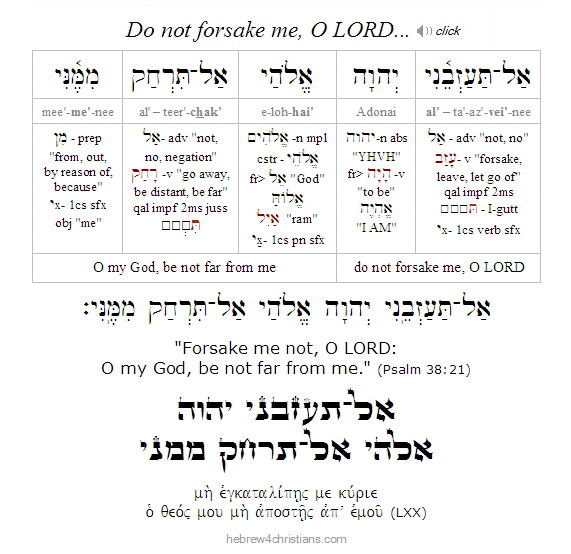 |
Finding the Way of Escape...

01.15.24 (Shevat 5, 5784) Where it is written, "God is faithful, and he will not let you be tempted beyond your ability, but with the temptation he will also provide the way of escape, that you may be able to endure it" (1 Cor. 10:13), we note that the Greek text says that God will actively "make with the temptation the way of escape" (ποιήσει σὺν τῷ πειρασμῷ καὶ τὴν ἔκβασιν) so that you may be able to bear it.... When I was younger, I thought of temptation as the appeal to gratify my flesh, to impulsively seek hedonistic pleasure, and so on, but now I understand "temptation" (πειρασμό) to encompass far more than just that.
For instance, whenever I regard my life in human or "natural" terms, apart from the consciousness of God's all-pervading and sustaining Presence, then I am surely under temptation. Fear, anger, despair, grumbling self-pity, and so on -- all are temptations to unbelief... This encouraging verse, then, assures us of the Divine Presence in every moment, at every turn of our journey, and in every circumstance. God is always present to help you as you turn to him in faith -- even when you are ashamed, fearful, or in dismay over your present circumstances. The sages state in this regard: "God creates the cure before the plague," meaning that His love is the foundation of all things: עוֹלָם חֶסֶד יִבָּנֶה / olam chesed yibaneh: "steadfast love built the world" (Psalm 89:2). Just as God created mankind only after He created the pathway of repentance (i.e., the "Lamb slain from the foundation of the world": Eph. 1:4, Heb. 4:4, Rev 13:8), so the escape from temptation was likewise foreseen and provided. In all things, then, may we humble ourselves and seek God's face, understanding our radical dependence upon Him for our deliverance.
Hebrew Lesson
Psalm 37:23-24 reading (click):
When you become alive to the truth that the LORD is your Rock -- the very ground upon which you live, move, and have your being -- then your steps are made sure. When you are unsure of your way, however, when you walk in uncertainty, you are unsteady in your resolve and are tempted to regard your life as being without any solid foundation or direction.... As you commit your way to the LORD, your steps are made sure, for you are walking before his Presence, and therefore you are upheld by his power...
In all your struggle remember that salvation is found in the power and righteousness of God, and not your own will or resolve (Rom. 1:16). I'm so glad it's not the strength of my grip that keeps me holding on to God, but the strength of his...
Believing to See...
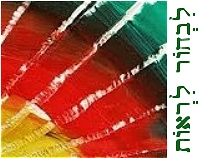
[ We do not understand in order to believe, but believe in order to understand... ]
01.15.24 (Shevat 5, 5784) Faith believes in the invisible light and accepts the truth of love that overcomes all darkness, hate, and fear. "I believe..." "I believe to see...." "I believe to see the goodness of the LORD..." "I believe to see the goodness of the LORD in the land of the living" (Psalm 27:13). I believe; I look upward; my chest aches and I long for relief; I look forward; my heart hopes even in these passing shadows, even in the midst of my fears, my afflictions, my struggles. My heart chooses to see the unseen good, the good limned by God's promise, the substance of his kindness, his blessing whispered over my fears...
The heart of faith testifies that there is "unfinished business," that there is more than meets the eye, that evil will not have the last word, and that our tears will one day forever be wiped away. Despite the ambiguity, faith "hopes against hope" that the LORD God will intervene and bring everlasting healing to us all. As it says, "Let him who walks in darkness and has no light trust in the Name of the LORD (יִבְטַח בְּשֵׁם יְהוָה) and rely on his God."
Bittachon (trust) is a word for this world, which says, "Though he slay me, I will trust in him..." Those who call upon the LORD can trust not only in concealed good behind ambiguous appearances ("all things work together for good") but also in a future, real, substantive good that will one day be clearly manifest for us all. Meanwhile, may the LORD our God keep us from such depth of sorrow that leads to sickness, darkness and despair. Amen.
Hebrew Lesson
Psalm 27:13 Hebrew (click):
Helmet of Salvation...
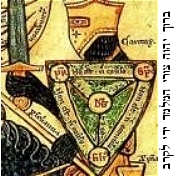
01.15.24 (Shevat 5, 5784) "O God my Lord, the strength of my salvation, you have covered my head in the day of battle" (Psalm 140:7). We are in the midst of a great war for the sanctity of our souls, and the enemy is always fear. Fear amplifies our anxieties and magnifies our problems, since it heeds messages of unbelief and justifies despair. We must understand that fear is a false witness - an emissary that gainsays the truth and denies the power of God. In your struggle with fearful thoughts, take every thought captive and resolutely put your trust in the Lord. He will "cover your head" in the midst of the battle. Amen. "Confidence is the present tense of hope."
Hebrew Lesson
Psalm 140:7 reading (click):
Dealing with the Demonic...
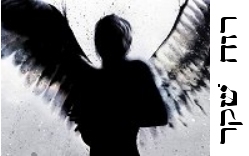
01.14.24 (Shevat 4, 5784) Though the Scriptures teach that the realm of the demonic exists, we encounter its presence most usually in thoughts and feelings that entice the soul to act selfishly and to entertain doing evil. That is where the battle begins. In the mind. The monster that tempted Eve in the Garden got into her head long before she bit into the fruit from the forbidden tree. And unless we are on guard against the variegated insinuations of godless insanity, we are liable to be under its influence as well...
You might think that demonic oppression is something extraordinary that requires the ministrations of an exorcist, but before such intervention may be necessary, the mind has been captivated by evil and deranged thinking. Such thinking may have its origins with a demons named "worry," or "shame," or "unworthiness" or "anger." Or they may come from rationalizations or excuses that attempt to console the ego. But a common strategy of the devil is to supply plausible ideas that are designed to deceive us and lead us astray.
Everyone is a theologian of sorts. The difference, however, is whether you are a good theologian or one who is swamped with muddled thinking about what is real. As C.S. Lewis once said, "Good philosophy must exist, if for no other reason, because bad philosophy needs to be answered. The cool intellect must work not only against cool intellect on the other side, but against the muddy heathen mysticisms which deny intellect altogether. Most of all, perhaps we need intimate knowledge of the past."
The devil doesn't care if it is a "holier-than-thou" theology, or a murky mysticism of "absolute tolerance," or a smarmy disavowal of faith in God altogether --- he is equally pleased with the sensualist as well as the atheist, indeed, he is content with any distortion of the truth, for this enables him to "feed" his deluded ego as the "Prince of Darkness."
In a way, dealing with evil thinking is unremarkable. After all, the airwaves of mass media continually disseminate lies, disinformation, and godless thinking in countless formats and by various diabolical stratagems. Whenever we encounter the demonic affecting us, then, we should not panic or be scandalized, but must instead reaffirm the truth of God and resolutely submit to his will (James 4:7). Sometimes this means contradicting the lie by quoting Scripture, offering praise to the Lord, and asking our Heavenly Father for deliverance. In extreme cases, it may be necessary to command the evil spirits to silence their blasphemies and to cease their intrusions. If we find ourselves going out of control emotionally, we are giving ground to the devil. The best tactic is to stay calm and re-center our focus on the Lord who is always present. There is shalom - that is, healing, wholeness, and soundness of mind - as we regain awareness of the greatness and the beauty and the glory of our God.
Hebrew Lesson
Psalm 3:3 Hebrew reading (click):
Exodus and the Lamb...
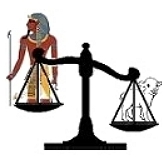
[ Our Torah reading for this week, Parashat Bo, describes the great Passover prophecy and the subsequent exodus from Egypt... ]
01.14.24 (Shevat 4, 5784) Shavuah v'chodesh tov, chaverim. Our Torah reading for this week (i.e., Exod. 10:1-13:16) begins with God commanding Moses "to go" (i.e., bo: בּא) before the Pharaoh to announce further apocalyptic judgments upon Egypt. The purpose of this power encounter was to vindicate God's justice and great glory (deliverance/salvation) by overthrowing the tyranny of unjust human oppression. Pharaoh's nightmare of "one little lamb" outweighing all the firstborn of Egypt was about to be fulfilled....
Hebrew Lesson
Exodus 10:1 Hebrew reading (click):
Recall that last week's Torah (i.e., parashat Va'era) retold how Pharaoh defiantly refused to listen to Moses' pleas for Israel's freedom, despite seven devastating makkot (plagues) that came upon Egypt in God's Name (יהוה). In this week's portion (i.e., parashat Bo), the battle between the LORD and Pharaoh comes to a dramatic conclusion. The last three of the ten plagues are unleashed upon Egypt: a swarm of locusts devoured all the crops and greenery; a palpable darkness enveloped the land for three days and nights; and all the firstborn of Egypt were killed precisely at the stroke of midnight of the 15th of the month of Nisan... In this connection note that the word בּא ("go") and פרעה ("Pharoah") added together equal the gematria of משׁיח ("mashiach"), providing a hint of the Messianic redemption that was foreshadowed in Egypt. Every jot and tittle, chaverim!
Before the final plague, God instructed the Jewish people to establish a new calendar based on the sighting of the new moon of spring. On the tenth day of that month, God told the people to acquire a "Passover offering" to Him, namely an unblemished lamb (or goat), one for each household. On the 14th of that month ("between the evenings") the animal would be slaughtered and its blood sprinkled on the doorposts and lintel of every Israelite home, so that God would "pass over" these dwellings when He came to kill the Egyptian firstborn that night. The roasted meat of the offering was to be eaten that night with unleavened bread (matzah) and bitter herbs (maror). God then commanded the Israelites to observe a seven-day "festival of matzah" to commemorate the Exodus for all subsequent generations.
Because of this, our corporate identity begins with a shared consciousness of time from a Divine perspective. The mo'edim (festivals of the LORD) all are reckoned based on the sacred calendar given to the redeemed Israelite nation. As it is also written in the Book of Psalms: "He made the moon for the appointed times" / עָשָׂה יָרֵחַ לְמוֹעֲדִים (Psalm 104:19). Undoubtedly Yeshua followed this calendar, as did His first followers (Gal. 4:4).
 |
Just before the dreadful final plague befell, God instructed the Israelites to ask their Egyptian neighbors for gold, silver and jewelry, thereby plundering Egypt of its wealth (this was regarded as "uncollected wages" for hundreds of years of forced labor and bondage - not to mention for the services of Joseph, whose ingenuity brought the world's wealth to Egypt in the first place). Moses then instructed the people to prepare the Passover sacrifice, that is, the korban Pesach (קָרְבָּן פֶּסַה) - the Passover lamb - and to smear its blood on the two sides and top of the doorway, resembling the shape of the Hebrew letter Chet (ח). This Hebrew letter, signifying the number eight, is connected with the word חי (chai), short for chayim (חַיִּים), "life." The blood of the lamb (דַּם הַשֶּׂה) not only saves from the judgment of death, but also is a symbol of divine life given for our redemption. The "life is in the blood."
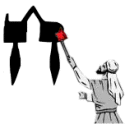
The dreadful final plague - the death of the firstborn - at last broke Pharaoh's resistance and he not only allowed the Israelites to depart without any conditions, he urged them to go. Because they left in great haste there was no time for their dough to rise. The Torah states that there were 600,000 adult men who left Egypt, along with the women, children, and a "mixed multitude" of other Egyptian slaves who tagged along.
The Israelites were commanded to consecrate all the firstborn to God and to commemorate the anniversary of the Exodus each year by celebrating the LORD's Passover in conjunction with the Feast of Unleavened Bread. During this time they were to remove all leaven from their homes for seven days, eat matzah, and retell the story of their redemption to their children. The portion ends with the commandment to wear tefillin (phylacteries) on the arm and head as a reminder of how the LORD saved the Israelites from their bondage in Egypt.
Be Still and Know...
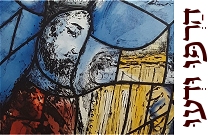
01.12.24 (Shevat 2, 5784) "Be still and know that I am God..." (Psalm 46:10). This is something you must do; you must quiet your heart to know the Divine Presence; you "set the Lord always before you" (Psalm 16:8) and refuse anxious thoughts that weigh in upon you, creating pressure and "dis-ease." Let go of your will. Confess your frustrated desire to control the world; abandon the insanity of your self-rule. Worry is a place of exile and pain. Since God's Name (יהוה) means "Presence" and "Love," being anxious is to practice the absence of God's presence instead of practicing his presence... A divided house cannot stand. Where it is written, "cast all your anxiety on him because he cares for you" (1 Pet. 5:7), the word translated "anxiety" comes from a verb that means to divide into pieces. Bring your brokenness to God – including those distractions that make you ambivalent and afraid – to receive God's healing for your divided heart.
"Be still and know that I am God..." (Psalm 46:10). Note that the Hebrew verb translated "be still" (i.e., rapha: רפה) means to "let go," to stop striving, stop kvetching, and to surrender categorically everything to the care of God (Rom. 8:28). "Being still" means letting go of your supposed "need" to control the world. Relax your hold and rely on God's care for your life instead, without "taking thought" for tomorrow and its concerns (Matt. 6:34). The past is gone, after all, and the future is God's business: all you have is the present moment to call upon our Lord. Be faithful in the present hour, then, asking God for the grace and strength you need to endure yourself and engage the task at hand. In this way you will experience the peace of God "which surpasses all understanding" (Phil. 4:7).
"Be still and know that I am..." Prayer is a type of listening (shema), a turning back to know the message of God's love and hope in Messiah. The word "teshuvah" (תְּשׁוּבָה) means an answer or response to a question. God's love is the question, and the heart's repose is the answer. Some of us may find it difficult to trust, to open our heart to receive grace and kindness. For those wounded by abandonment, it can be a great struggle to hear the voice of God calling you "beloved," "worthy," "valued," and "accepted." When you find faith to receive God's word of love, however, your heart comes alive and you begin to heal... Yeshua speaks of comfort: "Blessed are those who have not seen and yet still believe."
Hebrew Lesson
Psalm 46:10 reading (click):
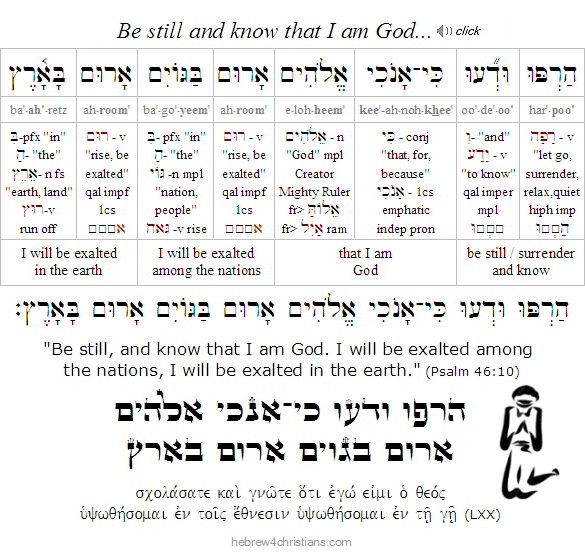 |
Quieting your heart allows you to hear the holy Spirit's whisper: "It is I; do not be afraid..." Once the storm of fear dissipates, you can access the truth of God. The Spirit asks us to do teshuvah: "In returning and rest you shall be saved; in quietness and in trust shall be your strength" (Isa. 30:15).
Danger of Forgetfulness...
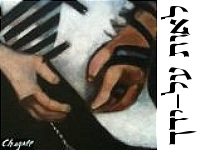
01.12.24 (Shevat 2, 5784) The sages admonish us: "Great is the power of forgetfulness, for it is also capable of causing you to forget the LORD your God, as it is written in the Torah: "Guard yourself lest you forget the LORD your God by not keeping his commandments and his rules and his statutes, which I command you today" (Deut. 8:11).
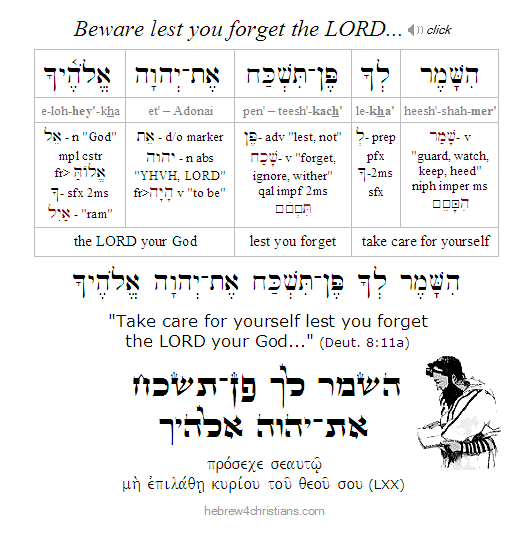 |
Note that the word "forget" in this verse comes from a root (i.e., shakhach: שָׁכַח) that means to ignore or "wither," thus evoking the words of Yeshua: "I am the vine; you are the branches. Whoever abides in me and I in him, he it is that bears much fruit, for apart from me you can do nothing. If anyone does not abide in me he is thrown away like a branch and withers (ξηραίνω); and the branches are gathered, thrown into the fire, and burned" (John 15:5-6). Therefore it is essential to earnestly strive to remember and to retain the truth that has been entrusted to you, as it is written: "Get wisdom; get insight; do not forget, and do not turn away from the words of my mouth" (Prov. 4:5). Amen: El na refa na lanu!
קְנֵה חָכְמָה קְנֵה בִינָה
אַל־תִּשְׁכַּח וְאַל־תֵּט מֵאִמְרֵי־פִי
ke·neih · chokh·mah ke·neih · vee-nah
ahl-teesh-kach · ve·ahl-teit · mei·eem·rey·fee

"Get wisdom; gain insight; do not forget
and do not turn away from the words of my mouth.
(Prov. 4:5)

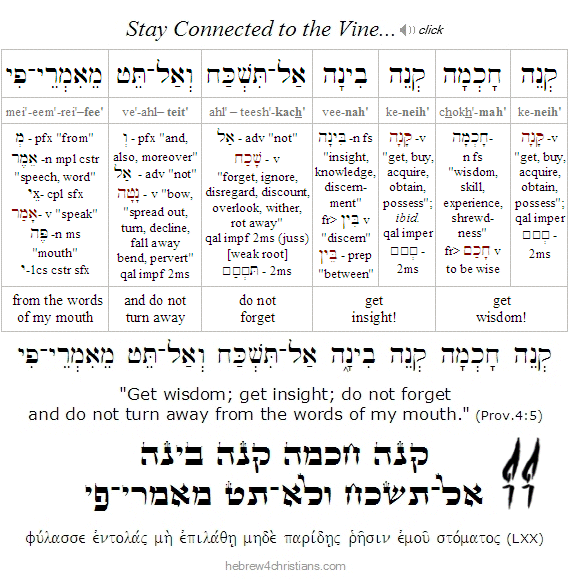 |
"If a man possessed a letter which he knew, or believed, contained information bearing upon what he must regard as his life's happiness, but the writing was pale and fine, almost illegible - then he would read it with restless anxiety and with all possible passion, in on moment getting one meaning, in the next another, depending on his belief that, having made out one word with certainty he could interpret the rest thereby; but he would never arrive at anything except the same uncertainty with which he began. He would stare more and more anxiously, but the more he stared, less he would see. His eyes would sometimes fill with tears; but the oftener this happened the less he would see. In the course of time, the writing would become fainter and more illegible, until at last the paper itself would crumble away, and nothing would be left to him except the tears in his eyes." - Soren Kierkegaard, Either/Or (from Parables of Kierkegaard: Thomas Oden, 1978)
Living and Dying in Him...
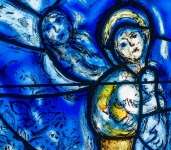
01.12.24 (Shevat 2, 5784) It is written in our Scriptures: "For none of us lives to himself (οὐδεὶς γὰρ ἡμῶν ἑαυτῷ ζη), and no one dies to himself (καὶ οὐδεὶς ἑαυτῷ ἀποθνῄσκει)" (Rom. 14:7). Between these two clauses is all that matters. Do we live for ourselves or for Him? If we don't live for Him, how will we die in Him?
Suffering from a Hard Heart...
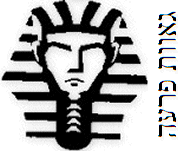
[ The following is related to our Torah reading for this week, Parashat Va'era... ]
01.12.24 (Shevat 2, 5784) Spiritually speaking, a heart that is insensitive, indifferent, unfeeling, and callous toward the needs of others is regarded as "hard" or "difficult." Often such hardness comes as a result of living in a fallen world. Many wounded people live with "scar tissue" that surrounds their heart, making them feel numb and unwilling to open up and trust others. Their affections have become disordered and their ego rationalizes blaming others or seeking various forms of entitlement. "Turning off your heart" can mean suppressing any positive regard for others (empathy) while nurturing anger and self-righteousness, or it may mean withdrawing from others as a lifeless shell (both approaches vainly attempt to defend the heart from hurt). Although Yeshua always showed great compassion, especially to the wounded and broken in spirit (Isa. 42:3), He regularly condemned the "hardness of heart" ("sclero-cardia," σκληροκαρδία) of those who opposed his message of healing and love.
A hard heart is closed off and impermeable to love from others, and especially from God. It is a "difficult" (i.e., kasheh: קָשֶׁה) heart, inflexible and even cruel. Scripture uses various images to picture this condition, including a "heart of stone" (Ezek. 36:26, Zech. 7:12), an "uncircumcised heart" (Jer. 9:26), a "stiff neck" (Deut. 31:27), and so on. Stubbornness is really a form of idolatry, an exaltation of self-will that refuses to surrender to God. If you are wounded and afraid to open your heart in trust to others, ask God for healing...
God wants us to have a "soft" heart (i.e., lev rakh: לֵב רַךְ) that is malleable and subject to His touch and influence. Consider the Biblical analogy of a potter who works with clay (Isa. 64:8, Jer. 18:6). Hard clay is brittle and hard to work with, though soft clay can be molded and adapted for a variety of uses. Applied to our heart attitudes, soft clay represents being open and moveable, whereas hard clay represents being inflexible, intolerant, and so on. A "hard hearted" person is closed-minded, assured of his own righteousness, and unwilling to admit the possibility of being wrong. He is really a "fragile" soul who is often hidebound by traditions, unwilling to be corrected, and usually so driven by fear and suspicion that he is unable to look at other possibilities. When we find ourselves becoming rigid, inflexible, and intolerant, we may be demonstrating hardness of heart.
Hardness of heart is something all of us deal with, even those who trust in Yeshua. After all, New Covenant believers are commanded to "put off the old self with its practices" (Col. 3:9) and are urged not to harden their hearts (μὴ σκληρύνητε τὰς καρδίας) through unbelief (Heb. 3:8,15, 4:7). The flesh dies hard, however, and "putting off" the old self requires divine intervention; however, if we cry out to the LORD for deliverance (especially from ourselves) He has promised to hear us (Rom. 10:13, Joel 2:32). The awareness that we are hardhearted and self-deceived can lead to a (blessed) sense of brokenness and despair -- i.e., to the realization that own self-sufficiency is futile and ultimately self-destructive. Turning to the LORD in despair of ourselves is a mark of humility. When we are emptied of ourselves, we are delivered from pride and self-deception and thereby enabled to truly ask for God's help... This is a miracle, since all of us have "a little Pharaoh inside," clamoring ti be the center of our universe and refusing to submit to the Presence of the LORD...
May God's blessing keep our hearts soft and open toward others... May the LORD give us a new heart, and put a new spirit within us. May He remove the heart of stone (לֵב הָאֶבֶן) from us and give us a heart of flesh (לֵב בָּשָׂר). May we be lev echad - "one heart" - with one another and with the Father (Ezek. 11:19). May we be so sensitized to the Presence of God that we detect the slightest touch from His hand upon us. Amen.
Hebrew Lesson
Ezekiel 36:26a Hebrew reading (click):
Source of our Breath...
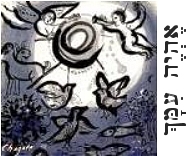
01.12.24 (Shevat 2, 5784) Though the meaning of God's Name (YHVH) was initially revealed to Moses as simply eheyeh (אֶהְיֶה), "I AM," or "I WILL BE" (Exod. 3:14), it is wonderful to realize that His Name was also revealed as eheyeh imakh (אהְיֶה עִמָּךְ), "I WILL BE WITH YOU" (Exod. 3:12; Josh. 1:5,9; Isa. 41:10,13; John 10:28; Matt. 28:20, etc.). Just as the LORD is called Elohei ha-ruchot lekhol basar (אֱלהֵי הָרוּחת לְכָל־בָּשָׂר), "the God of the breath of all flesh" (Num. 16:22), so He is the Source of your breath, the One who exhales to you nishmat chayim (נִשְׁמַת חַיִּים), the "breath of life" that enables you to live (Job 12:10). Indeed the Name YHVH (יהוה) first appears in the Torah in regarding imparting the breath of life to Adam (Gen. 2:7). Note further that each of the letters of the Name YHVH represent vowel sounds (i.e., breath), suggesting again that God's Spirit is as close as your very next breath. Like the wind that cannot be seen, so is the spirit the essential part of your identity. Yeshua breathed on his followers and said, "Receive the Holy Spirit" (John 20:22).
Hebrew Lesson
Job 12:10 Hebrew reading (click):
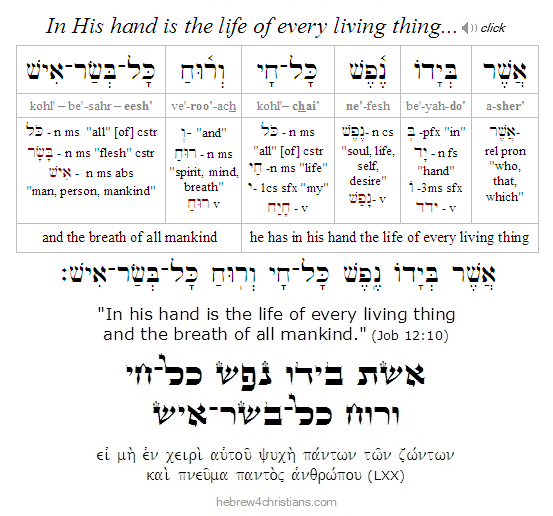 |
The "Torah" of Pharaoh...
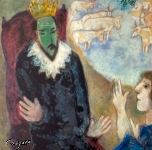
[ The following entry is related to this week's Torah reading, parashat Va'era... ]
01.12.24 (Shevat 2, 5784) Though he sometimes appeared to change his mind in light of the revelation of God, Pharaoh nevertheless reverted to his older thinking after the crisis seemed to pass. Therefore the Torah states that after each of the first five plagues, Pharaoh hardened (lit., "strengthened") his heart. It was only after five successive opportunities to face reality, to give up his claim to be god, to turn to the LORD in humility, however, that God ratified Pharaoh's will by "helping him" become the person he decided to be. Therefore after the sixth plague we read, ve'chazek Adonai et-lev paroh: וַיְחַזֵּק יְהוָה אֶת־לֵב פַּרְעֹה - "And the LORD strengthened Pharaoh's heart" (Exod. 9:12).
"The Torah of Pharaoh" (התורה של פרעה) teaches us that God will never force a sinner to turn away from their sin, but if they willfully continue to sin, they may eventually become unable to turn, trapped in a very difficult place.... The Shemot Rabbah states: "The Holy One, blessed be He, gives someone a chance to repent, and not only one opportunity but several chances: once, twice, three times. But then, if the person still has not repented, God locks the person's heart altogether, cutting off the possibility of repentance in the future." There is a very real risk that those who choose to be at war with God, who flatly refuse repeated appeals to turn to the LORD, will become progressively "strengthened" in their resolution to defy reality... And that, friends, is the "Torah" that Pharaoh teaches....
There are midrashim that Pharaoh eventually did repent, after seeing the destruction of his armies in the sea, so there is still hope for the most hardened of heart, but alas....
Hebrew Lesson
Psalm 95:8 reading (click):
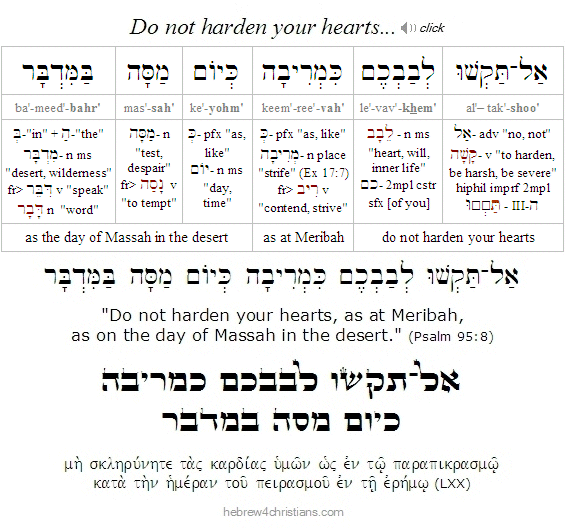 |
The tragic story of Pharaoh reminds us how pride can blind the heart. As Abraham Heschel said, "In a controversy, the instant we feel anger, we have already ceased striving for truth and have begun striving for ourselves." The truth needs no defense. If we find ourselves getting defensive or hostile, we need to take a step back and ask ourselves what we really believe... If we seek to use truth as a weapon, or as a means to rationalize our self-will, then we are not "in the truth," even if our facts in the matter may be correct. We must be careful not to find ourselves using the truth for our own agenda. Yeshua's words haunt the heart: "Without me you can do nothing" (John 15:5).
Kierkegaard notes: "The proud person always wants to do the right thing, the great thing. But because he wants to do it in his own strength, he is fighting not with man, but with God." Indeed, how many people seek visions, dreams, and private prophecies while they forsake the Spirit as it broods over the hearts of those around him or her? How many seek to "know God" as a matter of the pride of heart?
The Koretzer Rebbe was asked for instruction how to avoid sin. He replied, "Were you able to avoid offences, I fear you would fall into a still greater sin - that of pride" (Hasidic). The antidote to pride is the "fall of the soul," that is, those besetting sins and painful failures that (hopefully) bring us back to reality - namely, to the place of brokenness and our need for divine intervention... When we get "sick of our sickness" we enter into holy despair, and then the cry of the heart for lasting deliverance can be truly offered.
Hebrew Lesson
Proverbs 16:18 reading (click for audio):
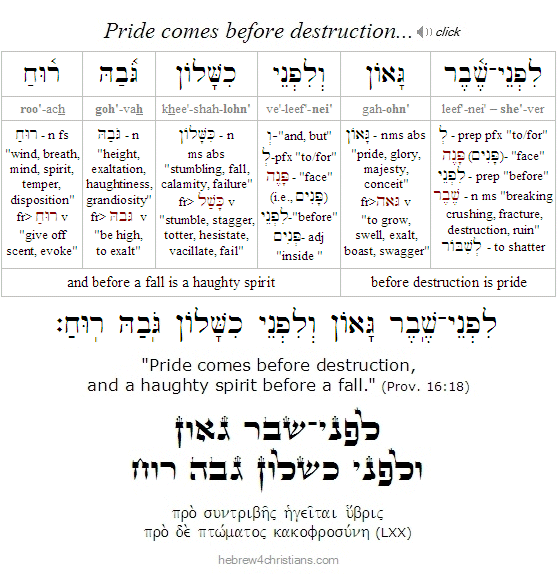 |
Note that the warning of Pharaoh's tragedy is not just for those who defy faith in the LORD God of Israel, for the New Testament warns God's redeemed children not to harden their hearts through unbelief as well:
"For who, having heard, rebelled? Indeed, was it not all who came out of Egypt, led by Moses? And with whom was he provoked for forty years? Was it not with those who sinned, whose bodies fell in the desert? and to whom did he swear that they would not enter his rest, but to those who were disobedient? So we see that they were unable to enter because of unbelief. Therefore, while the promise of entering his rest still stands, let us fear lest any of you should seem to have failed to reach it. For good news came to us just as to them, but the message they heard did not benefit them, because they were not united by faith with those who listened." (Heb. 3:16-4:2)
Amen. Faith is the essence of obedience. "And this is one of the most crucial definitions for the whole of Christianity; that the opposite of sin is not virtue but faith." (Kierkegaard)
Praise in Lamentation...
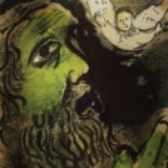
01.12.24 (Shevat 2, 5784) What if we were to come to such brokenness of heart that there would be nothing left to say, nothing but an inward groaning or roar that renders naught our every word, leaving us in muted sorrow, perplexity, sickness of heart, and fear... Will not our silence be heard?
We need to trust God in our darkness and with our darkness, and by that I mean that we need to believe that the Sovereign Lord is allowing trouble for our ultimate good, despite our inexplicable losses, our grief, our sorrow and our pain. It takes great faith to trust God in our anguish, to offer our pain in praise.
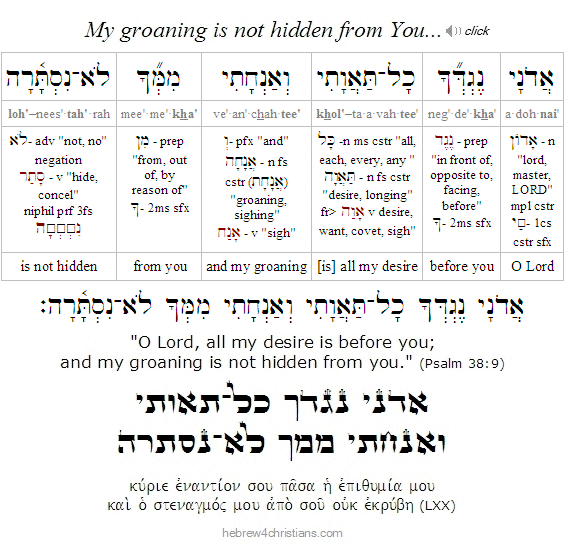 |
God understands the ache of your heart: "O Lord, all my desire is before you; my groaning is not hidden from you" (Psalm 38:9). Be encouraged: If you ask for bread, your Heavenly Father will not give you a stone. God will help us, and he will help us before we even know that he is helping us! Therefore do not be anxious, and do not fear, for "your heavenly Father knows what you need before you ask Him." God will make everything new, in the name and for the sake of his great love...
The word was given for our upbuilding and edification: "Let him who walks in darkness and has no light trust in the Name of the LORD (יִבְטַח בְּשֵׁם יְהוָה) and rely on his God" (Isa. 50:10). Trusting in God (i.e., bittachon - בִּטָּחוֹן) does not mean that we are obligated to affirm that this is "the best of all possible worlds," though it does mean we believe that eventually God will wipe away every tear and make all things right.. O Lord, make everything new, revive the hurting, in the name and for the sake of thy love, Amen...
"So it was, while they conversed and reasoned, that Yeshua himself drew near and went with them. But their eyes were held back so that they did not recognize Him. Then said to them, 'What kind of conversation is this that you have with one another as you walk and are sad?'" (Luke 24:15-17). Note that when the disciples were confused and distraught, Yeshua drew near to them in their anxiety and sadness... It was only later, after he took bread, blessed it, broke it, and then gave it to them were their eyes open, and they rejoiced in the truth of God. The brachah (blessing) was the signature statement of our Lord regarding his role as the Lamb of God. The entire account reminds me somewhat of John 21:3-13.
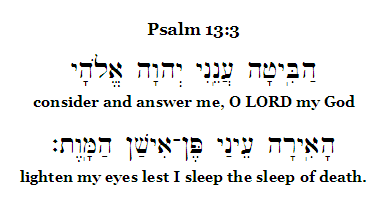 |
Providential Impediments...
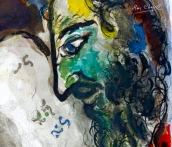
[ "No faith is so precious as that which lives and triumphs through adversity. You would never have believed your own weakness had you not needed to pass through trials. And you would never have known God's strength had His strength not been needed to carry you through." - Charles H. Spurgeon ]
01.11.24 (Shevat 1, 5784) The midrash says Moses had a speech impediment, and that is why he described himself as "heavy of mouth and of tongue" (כְּבַד־פֶּה וּכְבַד לָשׁוֹן), unfit to speak on behalf of God (Exod. 4:10). God reassured him, however, by reminding him that his limitation was by divine providence: "Who has made man's mouth? Who makes him mute, or deaf, or seeing, or blind? Is it not I, the LORD? Now therefore go, and I will be with your mouth and teach you what you shall speak" (Exod. 4:11-12). The sages comment that God did not cure Moses of his stuttering because He wanted the Israelites to know Moses as his chosen messenger. When he spoke in the Name of the LORD, the stuttering disappeared and Moses spoke with fluent ease. This was to teach the people not to trust in human oratory or wisdom, but rather in the power of God (see 1 Cor. 2:1-5). Just as the Apostle Paul, the "Moses of the New Covenant," was given a "thorn in the flesh" (σκόλοψ τῇ σαρκί) to keep him humbly relying upon God for his sufficiency to serve (2 Cor. 12:7-10), so Moses was rendered entirely dependent upon the LORD to speak as his mediator.
But he said to me, "My grace is enough for you" (i.e., dai lekha chasdi: דַּי לךָ חַסְדִּי), "for My power is made perfect in weakness" (i.e., ki ba'chulshah tushlam gevurati: כִּי בַּחֻלְשָׁה תֻּשְׁלַם גְּבוּרָתִי). Therefore I will boast most gladly of my weaknesses, that the power of Messiah may tabernacle (ἐπισκηνόω) within me (2 Cor. 12:9).
Hebrew Lesson
Isaiah 40:29 commentary (click):
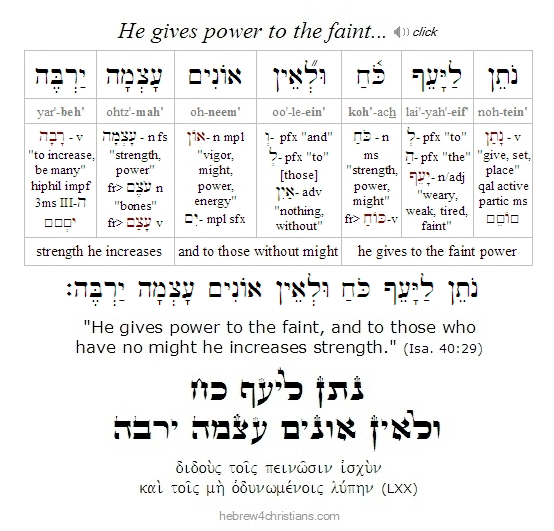 |
Slavery of Passivity...
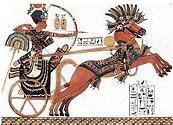
01.11.24 (Shevat 1, 5784) From our Torah portion this week (Va'era) we read, "I will bring you out from under the burdens of the Egyptians" (Exod. 6:6). The sages say the Hebrew word for "burdens" (סִבְלת) can also be read as passivity (סְבִילוּת): "I will deliver you from passivity toward your slavery...." So long as the people regarded their enslavement as tolerable, they could excuse it, rationalize it, and even defend it. Therefore God allowed tribulation to progressively increase so that the people would understand their need.
Likewise we cannot even begin to understand our need for deliverance as long as we are comfortable, numb, and dead inside... The first step toward moral freedom, then, is to be set free from our denial, to wake up, to resist evil, and to find faith that God desires something better for our lives. Passively accepting the values of this evil world means succumbing to its false claims to authority. As Bonhoeffer solemnly reminds us: 'Silence in the face of evil is itself evil: God will not hold us guiltless. Not to speak is to speak. Not to act is to act.'
"What constitutes the bulwark of our own liberty and independence? It is not our frowning battlements, our bristling sea coasts, the guns of our war steamers, or the strength of our gallant and disciplined army. These are not our reliance against tyranny in our fair land. All of them may be turned against our liberties, without making us stronger or weaker for the struggle. Our reliance is in the love of liberty which God has planted within us. Our defense is in the preservation of the spirit which prizes liberty as the heritage of all men, in all lands, everywhere. Destroy this spirit, and you have planted the seeds of despotism at your own doors. Familiarize yourselves with the chains of bondage, and you prepare your own limbs to wear them. Accustomed to trample on the rights of those around you, you have lost the genius of your own independence, and become the fit subjects of the first cunning tyrant who rises." - Abraham Lincoln (Speech at Edwardsville, 1858)
Hebrew Lesson
Psalm 118:5 reading (click):
The Shortest Prayer...
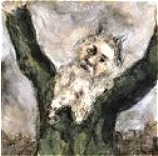
01.11.24 (Shevat 1, 5784) Often the shortest prayers are the best, since God is not impressed with human loquacity or religious talk (Prov. 10:19). Besides, your Heavenly Father knows what you need before you even ask Him, so you neither need to explain things to Him nor resort to flattering appeals or vain repetitions (Matt. 6:7-8).
The shortest prayer in the Torah is only five words long: El na refa na lah (אֵל נָא רְפָא נָא לָהּ), "God please heal her please," spoken by Moses on behalf of his sister Miriam who became metzora (Num. 12:13). Other good prayers are simply "Help Lord," "Thank you, Lord," and "Yes, Lord." What matters in prayer is the earnestness of heart, not the use of fine words. There is no "shibboleth" or "password" required to open the gates of heaven, just as there is no special name for God that must be invoked. The LORD sees beyond our words and heeds the passion of heart that cries out to Him in sincerity... God is likened to a good father who hears his child crying for his or her daddy.
This reminds me of a joke I once read. One Chanukah a rabbi arrived at shul but was surprised to see only one person, an elderly Jewish farmer, who came to the service. "Should I proceed?" asked the rabbi, and the farmer replied: "Sure, why not?" The rabbi then asked, "Well, it is worth having a service for such a small congregation?" The old farmer responded: "Let me tell you, Rabbi, that when I take a bucket of food to the hens, and only one turns up, I don't send it away hungry..." The rabbi, moved by this simply analogy, then went up to the bema and proceeded to lead the single Jew through the entire morning service, including a long and very forceful sermon on Chanukah, its history and tradition, and carefully reviewed the laws of lighting the menorah. When he finally finished, he turned to the farmer and asked:"Was that all right?" "You know rabbi," the farmer dourly replied, "when I take a bucket to the hens and only one turns up, I don't give it the whole bucket!"
The Scriptures teach, "When words are many, transgression is not lacking, but whoever restrains his lips is prudent" (Prov. 10:19). However, the Scriptures also teach that "a word fitly spoken is like apples of gold in a setting of silver" (Prov. 25:11). When we speak with others, it is wise to search for just the right words spoken with the just right tone at just the right time. May God give us all wisdom. Shalom, chaverim.
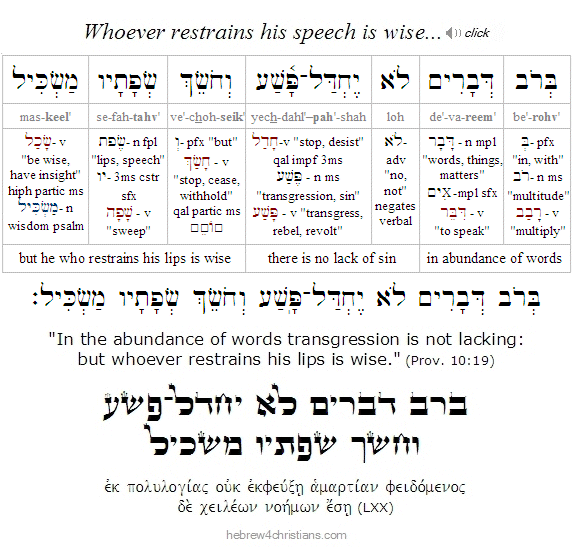 |
- אֵל נָא רְפָא נָא - "O God please heal..."
- אֵל נָא רְפָא נָא לִי - "O God, please heal me."
- אֵל נָא רְפָא נָא לָהּ - "O God, please heal her."
- אֵל נָא רְפָא נָא לוֹ - "O God, please heal him."
- אֵל נָא רְפָא נָא לָנוּ - "O God, please heal us."
- אֵל נָא רְפָא נָא לָכֶן - "O God, please heal them" (fpl)
- אֵל נָא רְפָא נָא לָכֶם - "O God, please heal them." (mpl)
Shepherd in Darkness...

01.11.24 (Shevat 1, 5784) "Yea, though I walk through the valley of the shadow of death, I will fear no evil..." (Psalm 23:4). O God of Light, Light of the world, surely You know my need for light as I look to You, especially when darkness tries to extinguish my hope. Despite my inability to see you now, help me to know that you are with me; let "thy rod and thy staff comfort me" and lead me closer to you. Lord, when I am afraid, quicken the faith you have put within my heart. Be Thou my Shepherd in my darkness, O Lord my God...
Hebrew Lesson
Psalm 23:4a reading (click):
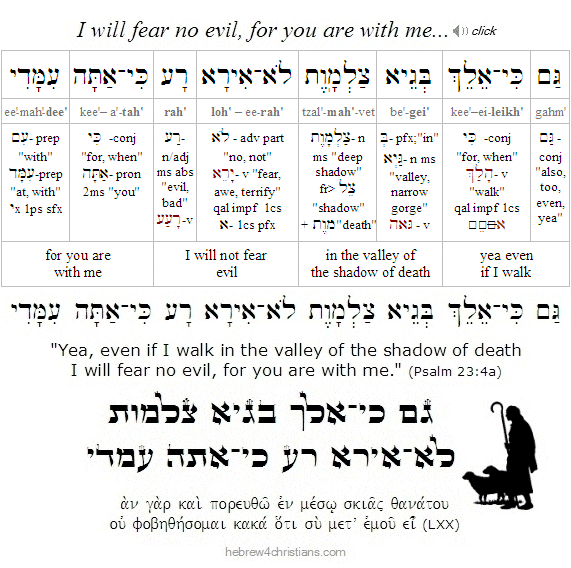 |
"Be not afraid." Over and over again in the Scriptures we hear the LORD saying to those who trust in Him, al-tirah, "be not afraid." Nachman of Breslov is reported to have once said, "All the earth is a very narrow bridge (כָּל־הָעוֹלָם כֻּלּוֹ גֶּשֶׁר צַר מְאד), and the point of life is never to be afraid." Likewise we trust Yeshua to be the Bridge to the Father, the narrow way of passage that leads to everlasting life. He calls out to us in the storms of this world, "Take heart. It is I; be not afraid" (Matt. 14:27). The heart of faith senses the LORD's presence, even in the darkness, and hears the Spirit saying, "I am with you..."
I do not see the road ahead of me, I cannot know for certain where it will end. Nor do I really know myself, and the fact that I think I am following your will does not mean I am actually doing so. But I believe the desire to please you does in fact please you, and I hope I have that desire in all that I am doing. I hope that I will never do anything apart from that desire. And I know that if I do this you will lead me by the right road, though I may know nothing about it. Therefore, I will trust you always, though I may seem to be lost and in the shadow of death. I will not fear, for your are ever with me, and you will never leave me to face my perils alone. - Thomas Merton
In times of testing, how desperately do we need a sense of companionship and intimacy with the Lord! When you feel abandoned, ashamed, or alone; or when you are afraid and unsure of yourself; or when pain distances you from others, nudging you to isolation or loneliness, then may God's Spirit brood over you, whispering your name, reminding you that you are never alone, and that God Himself is forever for you, despite yourself. Therefore "fear no evil," because God is with you in the midst of your present darkness. As it is written: "Surely goodness and love shall pursue you all the days of your life, and you shall dwell in the house of the LORD forever" (Psalm 23:6). Amen, and let us be found in his comfort...
Safe in God's Love...
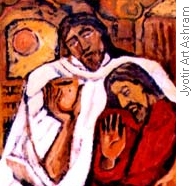
01.11.24 (Shevat 1, 5784) "Fear not, for I am with you..." אַל־תִּירָא כִּי עִמְּךָ־אָנִי. What we need most of all is right here, present in this hour, whether we're conscious of it or not. God is with you, even if you feel alone, lost in darkness, unclean, afraid... "Dear Lord Jesus, I don't know who I am, I don't know where I am, and I don't know what I am, but please love me" (prayer of a sufferer from Alzheimer's disease). That's what we need most, to trust that we are safe in God's love, and that's the ultimate message of our atonement in Messiah.
Hebrew Lesson
Isa. 41:10a Hebrew reading (click):
Hope against Hope...

[ "Against hope Abraham believed in hope with the result that he became the father of many nations according to the promise..." (Rom.4:18) ]
01.10.24 (Tevet 29, 5784) One of the great tests of faith is learning to "endure yourself" as your inner character is being transformed... To do so, you must receive the miracle of Jesus... You must look beyond the realm of appearance, where the "outward man" perishes, to the realm of ultimate healing, where the "inward man" is finally liberated from the ravages of sin and death. This is the comfort we have in our affliction: that God's promise revives our hearts (Psalm 119:50). Even in the "shadow of the valley of death" (i.e., this moribund and broken world), the LORD is with us and comforts us with His Presence (Psalm 23:4). We are given this great promise: "Just as we have borne the image of the man of dust, we shall also bear the image of the man of heaven" (1 Cor. 15:49).
Many people want healing apart from the cure. How many of us settle for half-measures? While you might find respite for your suffering in temporary measures, you cannot have lasting healing apart from the divine remedy... Nonetheless, the Lord our God gives us special graces, especially in light of the passing of days, with thwarted hope, aching bones, and inner keening for lasting deliverance. This "gift of despondency" helps us to awaken and to reach out to find the Real, the True, the Eternal. Let us learn to wait; let us keep asking God for the wisdom of patience. Between acceptance and anxiety, always choose acceptance. Find hope while waiting (Job 14:14).
Of course it's not easy to wait for God, especially when we are in pain or anxiety, but what does ease have to do with it? We must never, ever, give up; we must never ever, abandon our heart's longing for ultimate healing. Faith exercises hope in the Reality, Substance, and Being (ὑπόστασις) of the Invisible and is made captive to undying hope (Heb. 11:1). Therefore the Spirit cries out: come alive and trust in the promise of God!
בָּרוּךְ אַתָּה יהוה אֱלהֵנוּ מֶלֶךְ הָעוֹלָם
אֲשֶׁר עָשָׂנוּ אֲסִירֵי תִּקְוָה
"Blessed are you, LORD our God, King over all,
who makes us captives of hope."

Hebrew Lesson
Psalm 119:150 reading (click):
Witness of the Conscience...

[ "If there were no eternal consciousness in a man, if an unfathomable, insatiable emptiness lay hid beneath everything, what would life be but despair?" - Kierkegaard ]
01.10.24 (Tevet 29, 5784) Chodesh Shevat Tov, chaverim. The voice of conscience serves as a faithful inner witness sent by God to convict men of their evil ways (Rom. 1:20; 2:15). Like a built-in polygraph (i.e., "lie-detector"), the inner voice haunts the soul with the truth. The bravado of those who despise moral authority is therefore a form of self-deception. Who is a coward other than the man who does evil, the man of guilty conscience, who then runs away to hide from himself?
On the other hand, it takes real courage to take responsibility for your life, to confess the truth about who you are, and to acknowledge your need to be corrected and healed. The honest soul realizes its absolute insufficiency to overcome its fear and therefore trusts in God's power alone to be transformed according to the divine promise...
Hebrew Lesson
Proverbs 28:13 reading (click):
A Blessed Mourning...
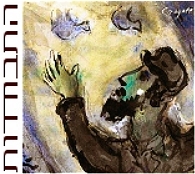
[ "Suffering is part of the divine idea. "God had one son on earth without sin, but never one without suffering." - Augustine ]
01.09.24 (Tevet 28, 5784) "And he opened his mouth and taught them, saying... 'Blessed are those who mourn, for they shall be comforted' (Matt. 5:4). This is a paradoxical statement, since those who genuinely mourn are anything but happy (i.e., me'ushar or μακαριος). Indeed, according worldly wisdom, such a statement seems illogical and perhaps incoherent. The world says, "Enjoy!" but Messiah says, "Grieve!" (Luke 6:21: "Blessed are you that weep now"). But understood in light of "godly sorrow" that results in teshuvah (repentance), such mourning is indeed a necessary step on the way to eternal happiness (2 Cor. 7:10). This is the sorrow that leads to being "educated for eternity" and invests meaning in suffering that the world lacks. Of what do we mourn? Is it not over the losses we experience in our lives? The sickness of sin both in the world and also within our own heart moves us to groan and weep in grievous sorrow. And as we learn of God's great compassion for us, do we not lament that our sins have wounded his heart? Socrates once said, "the unexamined life is not worth living" (Apology), but the world system does not examine and therefore grieve over the sinful condition of humanity. Those who are awake, however, realize God grieves in love over a lost world. God will comfort such mourners-- the Greek word means "to call along side" (παρακαλέω) for encouragement and strength.
Mourning is the expression of care, the voice of pain, the sorrow of a broken heart. Those who mourn care deeply; they feel the weight of loss; they grieve over sin. Such sorrow expresses the longing to be released from inner sickness of evil, as Yeshua said: "from within, out of the heart of man, come evil thoughts..." (Mark 7:21). Our own evil desires convict us of the truth... Here there is no place left to hide, no rationalization, no vain hope for self-reformation - just the raw realization of our fatal condition and the appeal for God's mercy in Yeshua. Mourning over our sins draws us to God, to the Comforter who "comes alongside" to bind up the broken heart. The danger remains, however, for those who deny their sin and refuse to mourn, since they are made blind to their need for forgiveness and comfort (John 9:41). How shall God be able to dry up your tears when you haven't wept?
Hebrew Lesson
Matthew 5:4 Hebrew reading (click):
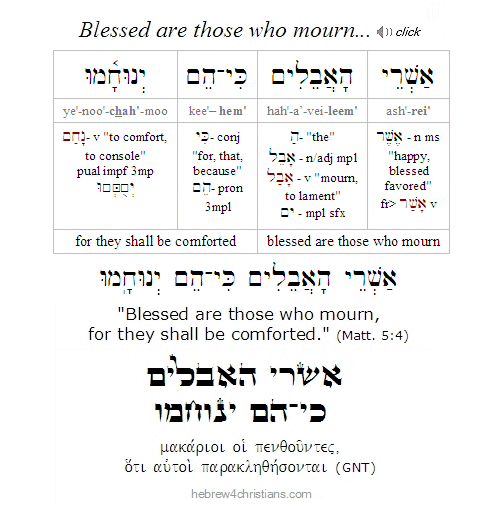 |
The Power of Truth...
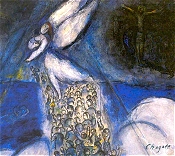
[ The following is related to our Torah reading for this week, Parashat Va'era... ]
01.09.24 (Tevet 28, 5784) In this week's Torah reading (i.e., parashat Va'era), the LORD sent Moses and Aaron to Pharaoh with the timeless message: "shalach et ami" (שׁלַּח אֶת־עַמִּי), "let my people go!" However, because of Pharaoh's pride and hardness of heart, God began a sequence of supernatural plagues that would demonstrate the LORD's sovereignty over all the powers and so-called "gods" of Egypt (Exod. 12:12).
The ten plagues (i.e, eser ha'makot: עֶשֶׂר הַמָּכּוֹת) were given not just to vanquish the hubris of Pharaoh, however, but to awaken the people of Israel. After hundreds of years of slavery, the people had forgotten who they really were and had passively accepted that all real power was vested in humans. Among other things, God's intervention was meant to deliver the people from the fallacy of ascribing greatness to worldly powers. Ultimately the people of Israel - and eventually the entire world itself - would come to understand ein od mil'vado (אֵין עוֹד מִלְבַדּו), "there is no true power apart from Him" (Deut. 4:35).
Hebrew Lesson
Deuteronomy 4:35 reading (click):
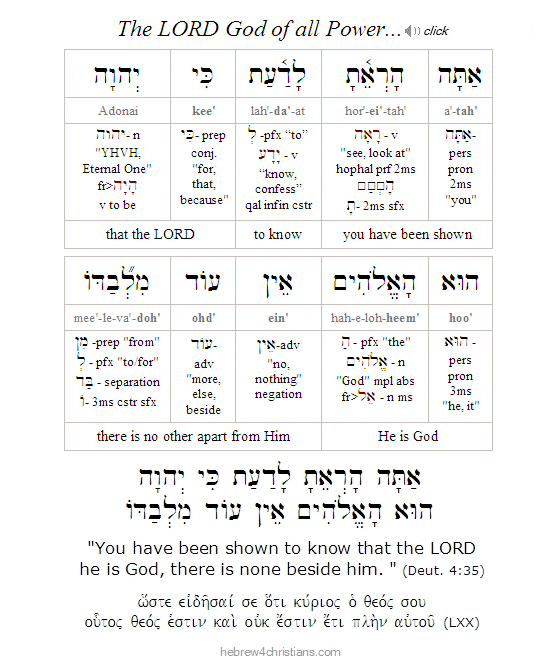 |
Knowing His Name...

The following is related to our Torah reading for this week, Parashat Va'era...
01.08.24 (Tevet 27, 5784) From our Torah portion this week we read that God said to Moses: "I appeared (וָאֵרָא) to Abraham, Isaac, and Jacob as El Shaddai (אֵל שַׁדָּי), but by my name the LORD (יהוה) I did not make myself known to them" (Exod. 6:3). Here we are faced with a puzzle, since the Torah clearly states that God revealed Himself as the LORD YHVH to the patriarchs. For example, to Abraham God said, "I am the LORD (אֲנִי יְהוָה) who brought you out of Ur of Kasdim" (Gen. 15:7), and to Jacob he said: "I am the LORD (אֲנִי יְהוָה), the God of Abraham your father and the God of Isaac (Gen. 28:13). In light of this, how then do we make sense of God's statement that He was not known as YHVH to the patriarchs?
The traditional explanation is that God was stating that the patriarchs had not directly experienced His mastery over creation through the signs and wonders He would perform as Israel's Savior and Redeemer. The patriarchs understood God as El Shaddai (אֵל שַׁדַּי), the all-sufficient One who nurtured the fledgling nation and who foretold Israel's future (Gen. 17:1-2; 28:3; 35:11), but Moses (and the Israelites) would now come to know God's attributes of covenantal faithfulness (chesed) as the "Promise Keeper" by directly witnessing his saving acts. Indeed, the Name YHVH implies that God is the Faithful One, since the name is formed by permutating the letters of the Hebrew root "to be": hayah (was), hoveh (is), and yihey (will be), which implies there is no power that can prevent God from fulfilling His promises. YHVH is Lord of lords and King of kings whose word can never fail (Deut. 10:17; Dan. 2:47). Ein od milvado (אֵין עוֹד מִלְבַדּו): "there is no truth apart from Him" (Deut. 4:35,9).
The name "ehyeh asher ehyeh" (אֶהְיֶה אֲשֶׁר אֶהְיֶה) means "I shall be as I shall be," that is, "I shall be with those who desire that I shall be with them. I reveal myself to those who seek for me, and as I am sought, so I will be found. According to your faith be it done unto you: Blessed are they that hunger and thirst for righteousness, for they shall be filled..."
Note that the question of the Name of God is raised both in last week's Torah portion (Shemot), where Moses asked God's Name to validate his mission to Israel, and again in this week's portion (Va'era), where God made the puzzling statement that the patriarchs did not know his Name as YHVH (יהוה). The entire question of God's name resolves to be a question about our ability to understand the very heart of God more than anything else (it's a matter of Who, not What). This is demonstrated by the fact that the name YHVH (יהוה) was revealed yet again to Israel after the dreadful sin of the Golden Calf, when Moses learned that it meant Compassion, Grace, and Love (see Exod. 34:6-7). This second revelation of the Name foreshadowed the promised New Covenant to come. Indeed the full meaning of God's name was revealed in the last gasp of Yeshua as He died upon the cross for our atonement, when he breathed out the great exhalation of all that he came to be for us... (Mark 15:37).
Hebrew Lesson
Psalm 9:10 podcast (click to listen):
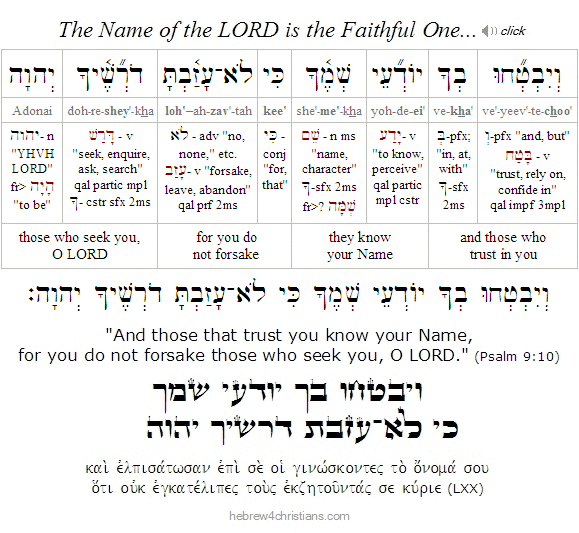 |
For more on this subject, see the article: Yeshua and YHVH.
Seeing God's Light...
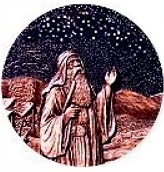
[ "Do not marvel that I say to you, 'You must be born again...'" - Yeshua ]
01.08.24 (Tevet 27, 5784) We find ourselves "thrown" into existence, subject to historical forces and pressures over which we have no control, bound to our DNA and biochemistry, hemmed in on all sides, powerless, full of ignorance and dark impulses. Yet the more we try to disentangle ourselves from what cannot be changed, the more enmeshed we become. The natural order of life seems to be that we come forth out of the darkness of birth and return to the darkness of death - a pilgrimage of the unknown.
We need light to conquer our darkness, but we are blind. We cannot forgive ourselves or make ourselves feel loved. We can't find our way. By ourselves we cannot be delivered from fear, anger, or despair. Aristotle's logic is tragically sound: "All people are mortals; all mortals fear death; therefore all people fear death." We cannot escape ourselves; we cannot heal ourselves; we cannot save ourselves. Therefore all that hope believes can only be graciously given by God, for we are lost and must be found. We cannot find our way to eternal life: we must be brought home by the Good Shepherd who seeks for us.
We are saved by the miracle of divine intervention in our lives, and that alone truly changes us. This is called "regeneration" or spiritual rebirth. Just as we were powerless when we were physically brought into this world, so we are powerless when we are spiritually brought into the realm of the divine. We cannot change ourselves, that is, by our own strength or resources. Salvation is "of the LORD," which means it is God's power and love that sets us free. We become a "new creation" that finds its life in the blessing of the Living God. Before we see this, however, we have to become "sick of our sickness," tired, exhausted, and utterly conscious of our need for deliverance from ourselves. We can only come to know God as our Savior when we turn to Him as our only hope.
"Unless you are born again, you cannot see the kingdom of God." We are blind until God opens our eyes. When Yeshua gave sight to a man born blind, the Pharisees concluded that he could not be a true prophet of God because he healed someone on the Sabbath day (John 9). In response Yeshua said, "For judgment I came into this world, that those who do not see may see, and those who 'see' may become blind." When the Pharisees heard this they asked, "Are we blind then?" and Yeshua replied: "If you were blind, you would not be guilty of sin, but now because you claim that you can see, your guilt remains." Likewise the Apostle Paul was made blind in order to see; he had to lose the blindness of his seeing in order to behold the truth of God's kingdom (Acts 9). As long as Paul thought he could see he remained blind, but as soon as he realized he was blind, he began to be able to see...
The difference between believers and unbelievers does not turn on the problem of sin and the condition of spiritual death - for both are in the same helpless state before God - but rather with the different responses they have toward "the light," that is, the revelation of God manifest in Yeshua. Those who love evil hate the light and turn away from its disclosure, whereas those who "do truth" love the light so that their deeds are revealed as God's power at work within their hearts (John 3:19-21; Eph. 5:13). There is an "exclusive disjunction" in the realm of the spirit: either you will love what is evil and hate the light, or you will love the light and hate what is evil. As Yeshua said: "No one can serve two masters, for either he will hate the one and love the other, or he will be devoted to the one and despise the other" (Matt. 6:24).
Followers of Yeshua are told to "walk as children of light" / ὡς τέκνα φωτὸς περιπατεῖτε (Eph. 5:8). The children of light are called to be "am kadosh" - a holy people - separate from the evil engendered by the fallen world and its forces, just as the very first creative expression of God was the separation of light from darkness (Gen. 1:3-4). The children of light "hate evil and love the good," and conversely, the children of darkness "hate the good and love evil" (Psalm 34:21, Prov. 8:13, Amos 5:15, John 3:20-21). Regarding the heavenly Zion to come, it is written: "nothing ritually unclean will ever enter into it, nor anyone who does what is detestable or practices falsehood (lit. "makes a lie"), but only those whose names are written in the Lamb's book of life" (Rev. 21:27).
This is the question of the gospel, after all: Are you willing to believe in the light of God's love, or not? What is your destiny? Yeshua is the light of the world, and those who follow him will not walk in darkness, but will have the light of life (John 8:12). So, do you have "ohr ha-chayim" (אוֹר הַחַיִּים), "the light of Life," shining within your heart? The light beckons: "wake up, open your eyes, and believe" the good news: darkness and despair will not prevail; your mourning will find comfort, your grief its solace. Your heart's deepest longing shines brightly, even now, if you will but believe... Now may you find courage and remember what is written: "The LORD is my light and my salvation (i.e., my Yeshua); whom shall I fear? The LORD is the refuge of my life; of whom shall I be afraid?" Amen.
Hebrew Lesson
Psalm 27:1 reading (click):
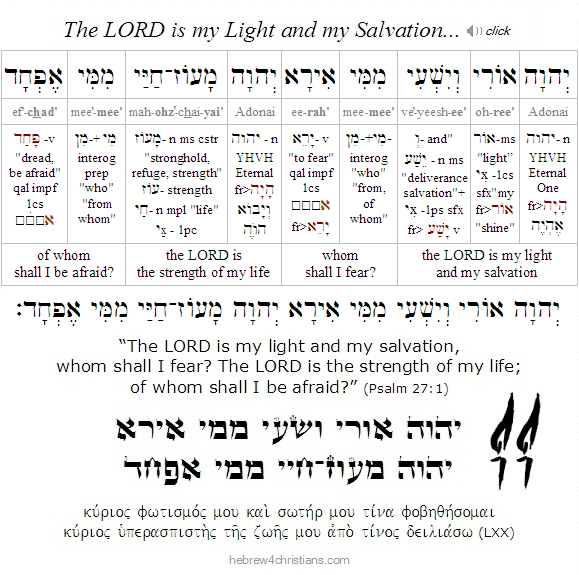 |
Parashat Va'era:
God Reveals Himself as Savior
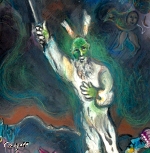
01.07.24 (Tevet 26, 5784) Shavuah tov, chaverim. Recall that last week's Torah portion (i.e., parashat Shemot) explained how Moses and Aaron were commissioned to go before Pharaoh and deliver the message: shalach et-ammi (שַׁלַּח אֶת־עַמִּי), "Let my people go" that they may hold a feast to me in the desert" (Exod. 5:1). Not only did Pharaoh dismiss the request, but he imposed even harsher decrees against the Israelites and caused them to suffer miserably. Moses then appealed to the LORD, who reassured him that Pharaoh would eventually relent because "the greater might" of the LORD's power would deliver His people.
Hebrew Lesson
Exodus 5:1b reading (click):
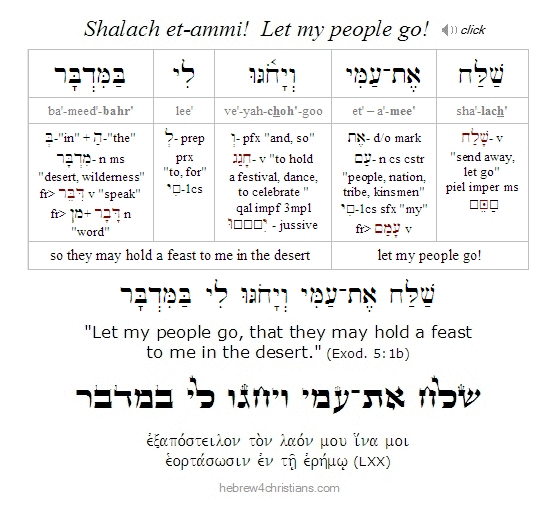 |
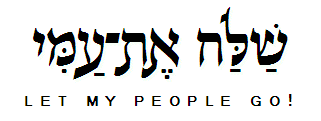 |
In this week's portion, parashat Va'era, (i.e., Exod. 6:2-9:35), the LORD told Moses that He was now going to fulfill His promise to Abraham, Isaac, and Jacob by giving the Israelites the land of Canaan, and that he had heard the "groaning of the people of Israel whom the Egyptians held as slaves" (Exod. 6:5). The LORD (יהוה) was now coming down to earth to fight and save his people! Israel would now know that He alone is their Savior and God! The "showdown" between the LORD and the so-called gods of Egypt was imminent, and God therefore encouraged the people with precious promises: "I AM the LORD (אֲנִי יְהוָה) and I will bring you out from under the burdens of the Egyptians, and I will deliver you from their bondage, and I will redeem you with an outstretched arm and with great judgment; and I will take you to me for a people and I will be to you a God; and I will bring you into the land promised to Abraham, Isaac and to Jacob as an inheritance forever (these are the "expressions of redemption" we recall during the Passover Seder every year).
Despite these wonderful promises, however, the people were unable to listen because of their "shortness of breath" (מִקּצֶר רוּחַ) on account of their harsh slavery. The LORD then told Moses: "Go in, tell Pharaoh king of Egypt to let the people of Israel go out of his land," and the great battle between the LORD and the so-called "gods" of Egypt began. However, even after repeatedly witnessing the series of miraculous plagues issued in the Name of the LORD, the despot remained proud and unmoved, thereby setting the stage for the final devastating plagues upon the land of Egypt and the great Passover redemption of Israel.
Hebrew Lesson
Exodus 6:3 Hebrew reading (with comments):
Moses' Thorn in the Flesh...
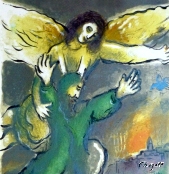
"I believe that God will give us all the strength we need to help us to resist in all time of distress. But he never gives it in advance, lest we should rely on ourselves and not on him alone." - Dietrich Bonhoeffer
01.07.24 (Tevet 26, 5784) According to midrash (Shemot Rabbah), as a very young lad Moses was once seen throwing Pharaoh's gold crown to the ground. Upon learning of this apparent act of insolence, Pharaoh devised a test to see if the child understood what he was doing. He therefore commanded that a platter with a piece of gold and a glowing piece of coal were to be presented before Moses and ordered the little boy to choose one. If Moses chose the gold, it would imply that he understood its value, and therefore he would be killed. On the other hand, if Moses chose the burning coal, he would be spared since he was unable to differentiate between gold and a glowing piece of coal. Moses began to reach out for the gold when an angel pushed his hand aside and he grabbed the coal instead. He then immediately put his hand in his mouth, but that burned his lips and tongue so badly that he had a permanent speech impediment as a result.
Later, when God commissioned Moses to speak to the children of Israel, he protested to the LORD that he was "heavy of mouth and heavy of tongue" (i.e., kevad peh ve'kaved lashon: כְּבַד־פֶּה וּכְבַד לָשׁוֹן) and therefore was unable to eloquently speak on behalf of the LORD to Pharaoh (Exod. 4:10). But the LORD said to him, "Who has made man's mouth? Who makes him mute, or deaf, or seeing, or blind? Is it not I, the LORD? Now therefore go, and I will be with your mouth and teach you what you shall speak" (Exod. 4:11-12).
When the time arrived for Moses to actually go before Pharaoh to declare God's message to let the Israelites go, he again protested to the LORD that he was a man of "uncircumcised lips" (עֲרַל שְׂפָתָיִם), an idiom that meant that he regarded his lips to be of no acceptable use to God. (Ironically the prophet Isaiah later had his lips burned to purify them to speak on behalf of God; Isa. 6:6-7). In this connection it is interesting to ask why God did not simply heal Moses of his impairment. After all, the LORD had earlier told him that He had the power to make the blind to see, the deaf to hear, and the mute to speak...
According to many of the classical Jewish commentators, God did not cure Moses of his stuttering because He wanted the Israelites to know that he was a divine messenger. When he spoke in the Name of the LORD, the stuttering miraculously entirely disappeared and Moses spoke with fluent ease. This was to teach the people not to trust in human oratory or wisdom, but rather in the power of God (see 1 Cor. 2:1-5). Just as the Apostle Paul, the "Moses of the New Covenant," was given a "thorn in the flesh" (σκόλοψ τῇ σαρκί) to keep him humbly relying upon God for his sufficiency to serve (2 Cor. 12:7-10), so Moses was rendered entirely dependent upon the LORD but thereby became a "man of words" who spoke with "circumcised lips."
"O LORD, you will establish peace for us, for You have indeed done for us all our works" (Isa. 26:12). We must always remember that God does the work "for us" (לָּנוּ) and we are His witnesses. Salvation is "of the LORD," and is not the result of our own efforts. Anything of eternal value comes from God alone, who is the beginning and end of grace. "Not by (human) might, nor by (human) power, but by my Spirit, says the LORD of hosts (Zech. 4:6).
יְהוָה תִּשְׁפּת שָׁלוֹם לָנוּ
כִּי גַּם כָּל־מַעֲשֵׂינוּ פָּעַלְתָּ לָּנוּ
Adonai · teesh·poht · shah·lom · lah'·noo
kee · gam · kohl-ma·a·sei'·noo · pah·al'·ta · lah'·noo

"O LORD, you will establish peace for us,
for You have indeed done for us all our works."
(Isa. 26:12)

Hebrew Lesson
Isaiah 26:12 Hebrew reading (click):
Note that God does the work "for us" (לָּנוּ) and we are His witnesses... Salvation is "of the LORD," and is not the result of our own efforts. Anything of eternal value comes from God alone, who is the beginning and end of grace. "Not by (human) might, nor by (human) power, but by my Spirit, says the LORD of hosts (Zech. 4:6). If we lose sight of this truth, we are again made subject to the "law of sin and death" (תּוֹרַת הַחֵטְא וְהַמָּוֶת), that is, the futile principle of self-justification that constitutes the "wheel of suffering." We can escape this cycle only when we accept the truth about our condition and trust God for our deliverance. It is the "law of the Spirit of Life" (תוֹרַת רוּחַ הַחַיִּים), that is, the inner reign of the Holy Spirit, that sets us free from the reign of sin that leads to death...
Healer of the Broken Heart...
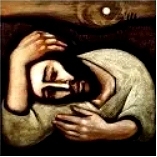
01.05.24 (Tevet 24, 5784) The late Henri Nouwen said that there are two great fears (or wounds) that we all face. The first is the fear that we were not wanted at the time of our birth into this world, and the second is that we will not be wanted at the time of our death. "Not being welcome is your greatest fear. It connects with your birth fear, your fear of not being welcome in this life, and your death fear, your fear of not being welcome in the life after this. It is the deep-seated fear that it would have been better if you had not lived" (Inner Voice of Love). If you carry a wound of abandonment within your heart - if you live in dread over your worth as a human being, seriously wondering whether it would have been better had you never been born, then you know the taste of hell itself - the emotional prison of feeling lost, defective, rejected, shameful - unable to love or to be loved...
Is not the lament of the lonely heart to find a sense of welcome, or acceptance, or peace within? Is it not the heart's cry for connection? Yet even the very gospel message cannot make traction within a heart lost to its own shame... Therefore the miracle of salvation is profoundly connected with faith that you are loved and lovable - despite yourself - and that this love derives from the core of all that truly exists. Is this not "home" in the spiritual sense? Is this not "Zion, the perfection of holiness?" That God prepares a table for you in the presence of your enemies, yea, those enemies of self-rejection, abandonment, fear, and shame? And that there - in the midst of your lost and forlorn condition you are found, treasured, and celebrated? Is not that "place" God's very heart - Jesus dying upon the cross, gasping for each breath - knowing everything about you and loving you anyway?
Moses asks us to "soften our hearts" by remembering that we are beloved of God (see Deut. 10:12-16). He reminds us that the though Lord is "the God of gods" (אֱלהֵי הָאֱלהִים) - the power that transcends the gods of our idolatry (i.e., our fears, our disordered attachments, our shame), and the "Lord of lords" (אֲדנֵי הָאֲדנִים) - the Center and Authority of what is most real, he nevertheless cares for the lowly orphan and the grieving widow - he reaches out to the needy and the abandoned - and he desires to console the "stranger," the one shattered of heart, who has no sense of belonging, no pride of tribe, nor place to lay his head (see Deut. 10:17-18). God cares about those who are lost, hurting, and alone: He came to save all such from their despair...
But how does God reach the bound soul that walks alone among the tombs, cutting himself in his torment? How can he heal the deep trauma, the disassociated and broken of heart? How else but by the miracle of his intervention, quickening an otherwise numb and dead heart to come alive, to breathe in hope, and to begin to believe that - despite everything that has happened - he was wanted all along, from the very beginning, and that the wound of his sorrow was given so that he could find out who he really is and where he really belongs... The wound you were given is part of your story, and healing comes from accepting God's love for you -- and understanding how the Lord goes through the wound with you and for you...
Life in this fallen world is likened to a vapor or a passing shadow (Psalm 144:4). Ha'kol oveir: Nothing abides; good things here never last; and we labor under the unmentionable anxiety that death will separate us from everyone and everything we love. However, death is not the end for the us, for "love is stronger than death, passion fiercer than the grave; its flashes are flashes of fire, the very flame of the LORD" (Song 8:6).
"What will death be like?" they asked the Master. "It will be as if a veil is ripped apart and you will say in wonder, "So it was you all along!" (De Mello). Death is a most poignant homecoming, a place of joyful welcome, wherein all shall be well for ever. The righteous have an everlasting foundation in the faithful heart of God. Faith in the LORD believes that a single supreme, all-knowing, all-powerful and benevolent spiritual Power directs all things, and that Messiah is the beginning, middle, and end of all conscious meaning, truth, and substance, as it is written: כִּי הַכּל מִיָּדוֹ הַכּל בּוֹ וְהַכּל לוֹ הוּא, "For from him and through him and to him are all things" (Rom. 11:36). A life of faith in the one true God imparts the blessing of shalom (inner peace) and assures the heart that all shall be made well by the love of God. So then, "if we live, we live to the Lord, and if we die, we die to the Lord. So then, whether we live or whether we die, we belong to the Lord" (Rom. 14:8). For the believer in Messiah, death does not define us, and indeed, we trust that God will attend to us in the moment of our utmost extremity (John 5:24; 11:25-26). If we desire eternal life with all our hearts and remember our end before the Lord, we will be free of the fear of death. Amen v'amen.
Hebrew Lesson
Psalm 147:3 reading (click):
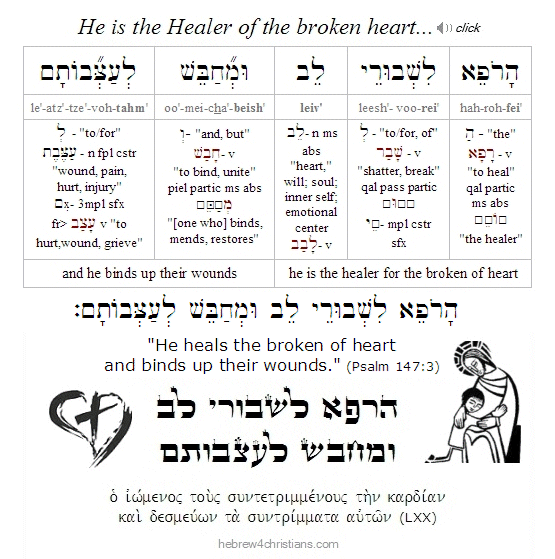 |
My Lord and My God...

01.05.24 (Tevet 24, 5784) God's power is present in all things, in every world, every soul. Yeshua is the Source of all life in the universe, as it says: "All things were made by Him" (John 1:3). God is Light, and Yeshua reveals the Light of God (John 8:12). The "Word made flesh" is the "image of the invisible God" and the "radiance of the glory of God and the exact imprint (χαρακτήρ, 'character') of his nature" (Col. 1:15). All of creation is being constantly upheld by the word of His power (Heb. 1:3): "All things were created by Him (i.e., Yeshua), and for Him" and in Him all things consist (συνεστηκεν, lit. "stick together") (Col. 1:16-17). Creation begins and ends with the redemptive love of God as manifested in the Person of Yeshua our Mashiach... He is the Center of Creation - it's beginning and end. As it says: אָנכִי אָלֶף וְתָו רִאשׁוֹן וְאַחֲרוֹן ראשׁ וָסוֹף / "I am the 'A' and the 'Z,' the First and the Last, the Beginning and the End" (Rev. 22:13). Indeed, Yeshua is the "King of kings of kings" (מֶלֶךְ מַלְכֵי הַמְּלָכִים), the LORD of all possible worlds -- from the highest celestial glory to the shame of bearing our sin and guilt upon a cross... All Reality centers upon Him.
Hebrew Lesson
Psalm 8:1 reading (click):
God's abiding provision for our need is revealed in the "face of Messiah" (בִּפְנֵי הַמָּשִׁיחַ), not in the fading glory of the former covenant (2 Cor 3:4-18). Unlike Moses - who veiled his face to hide the fact that the glory of the former covenant of Sinai was indeed fading away - "we all, with unveiled face, reflecting the glory of the Lord, are being transformed into the same image from one degree of glory to another. This comes from the Lord who is the Spirit" (2 Cor. 3:12-4:1). Each of us, like Moses, must ascend the mountain of Zion to behold the Glory of God: "And when they lifted up their eyes, they saw no one but Yeshua only" (Matt. 17:8). "The face of Yeshua the Messiah" is therefore the radiance and glory of God Himself.
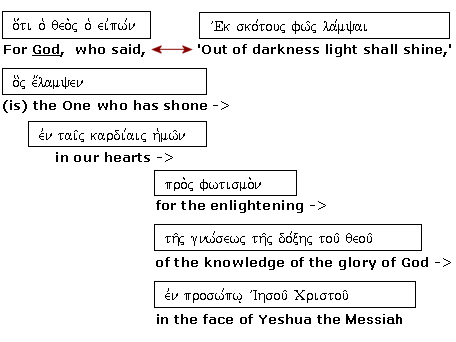 |
"Stand up and bless the LORD your God from everlasting to everlasting. Blessed be His glorious Name, which is exalted above all blessing and praise" (Neh. 9:5; Psalm 138:2; Phil. 2:9-11; Isa. 45:23). We have to stand for the truth, because the truth is what sets us free (John 8:32). As Yeshua said, "For this purpose I was born and for this purpose I have come into the world -- to testify to the truth. Everyone who is of the truth listens to my voice" (John 18:37). The way of life is found in Yeshua: "Whoever has the Son has the life (הַחַיִּים); whoever does not have the Son does not have the life" (1 John 5:12).
Therefore, as Yeshua said: "Walk while you have the light, lest darkness overtake you... As you have the light, believe in the light. Then the light will be within you, and shining through your lives. You'll be children of light (בְּנֵי הָאוֹר). I have come into the world as light, so that whoever believes in me may not remain in darkness" (John 12:35-6, 46).
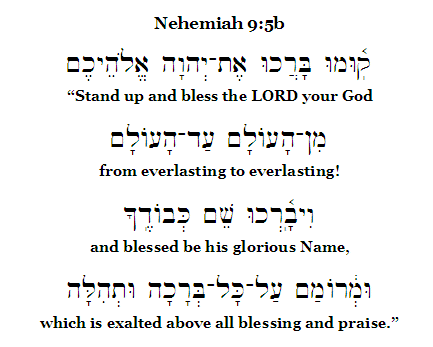 |
 |
Mystery and God's Name...
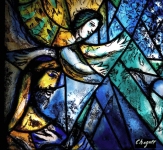
[ The following is related to our Torah for this week, Parashat Shemot... ]
01.05.24 (Tevet 24, 5784) When Moses asked why he (of all people!) was chosen to be God's emissary, the LORD did not explain His decision in natural terms; nor did not appeal to Moses' past experiences, his potential, his family lineage, or even his great humility... Instead God simply said that whatever inadequacies Moses might have, being in relationship "with Him" was entirely sufficient: ki ehyeh imakh (כִּי־אֶהְיֶה עִמָּךְ): "for I will be with you" (Exod. 3:12). That is all that Moses would truly need...
When Moses then sought for some way to justify his role as a prophet sent from God, he sought to know God's secret "name" (see Exod. 3:13). God's response to the request was enigmatic: אֶהְיֶה אֲשֶׁר אֶהְיֶה - ehyeh asher ehyeh: "I will be what I will be" (or I am what I am), which may be understood as, "It doesn't matter what my Name is - I will be what I will be - all that matters is that I will be with you (ehyeh imakh) -- and that is enough! Indeed, God's name is nifla (נִפלָא) - "wonderful and incomprehensible" (Judges 13:18; Psalm 139:6), since the LORD is infinite and beyond comparison to finite things (Psalm 147:5). God is the great "I AM" that pervades all of Reality (אָנכִי), the glorious Eternal Personal Presence (i.e., hayah, hoveh, ve'yihyeh) whose power constantly sustains all things. Most of all, God is declared and expressed as our Savior, the One who reveals the face of God to us all (2 Cor. 4:6).
Hebrew Lesson
Exodus 3:14a reading (click):
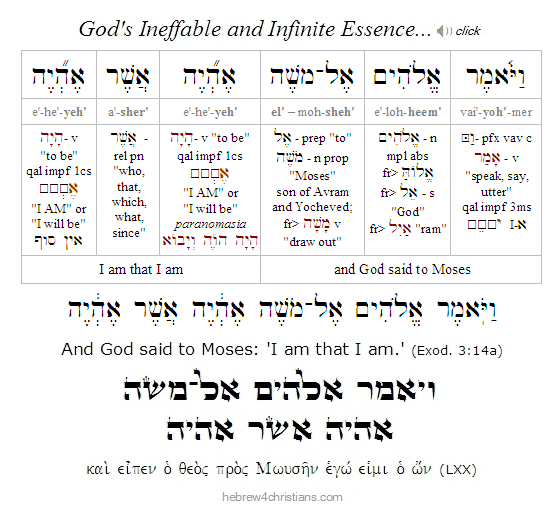 |
Regarding the perennial question of whether we can fully apprehend the inner meaning of the Name of God, we read the following vision from the New Testament: "Then I saw heaven opened, and behold, a white horse! The one sitting on it is called 'Faithful and True' (נֶאֱמָן וְיָשָׁר), and in righteousness he judges and makes war. His eyes are like a flame of fire, and on his head are many diadems, and he has a Name written that no one knows but himself (שֵׁם כָּתוּב אֲשֶׁר לא־יָדַע אִישׁ כִּי אִם־הוּא לְבַדּוֹ). He is clothed in a robe dipped in blood, and the Name by which he is called is 'the Word of God' (דְּבַר הָאֱלהִים). And the armies of heaven, arrayed in fine linen, white and pure, were following him on white horses. From His mouth comes a sharp sword with which to strike down the nations, and He will rule them with a rod of iron. And He will tread the winepress of the fierce fury of the wrath of God, the Ruler over All, the LORD God Almighty (יְהוָה אֱלהֵי צְבָאוֹת). On his robe and on his thigh he has a Name written, the King of kings (מֶלֶךְ הַמְּלָכִים) and the Lord of lords (אֲדנֵי הָאֲדנִים). And with the breath of his lips He will slay the wicked" (Rev. 19:11-16).
Notice that in this passage the LORD both has a Name that no one knows but Himself and also that is He is called 'Faithful and True,' 'the Word of God,' and so on... In other words, within Himself God's Name is something that only He can truly understand, though we can know what He is called based on the revelation and analogical language of the Scriptures.
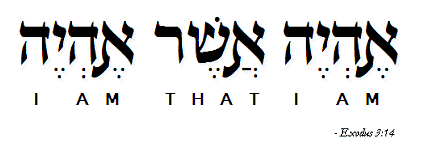 |
 |
From the Midst of Thorns...
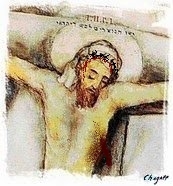
01.05.24 (Tevet 24, 5784) Why did the LORD, the Holy One, reveal Himself to Moses out of the midst of a thorny bush (סְנֶה), and not some grand tree? God lowered himself to speak from within the bush, as it is written: "For though the LORD be high, he regards the lowly" (Psalm 138:6); and "I will be with him in trouble" (Psalm 91:15).
The midrash imagines God saying to Moses: "Don't you feel that I suffer anguish whenever Israel does? Know, therefore, from the character of the place from which I speak, out of the thorn bush, that I, as it were share their suffering" (Shemot Rabbah 2:7).
God speaks to us from the place of thorns – even those about his own head – words of great comfort and deliverance. From the midst of the fire (בְּלַבַּת־אֵשׁ מִתּוֹךְ הַסְּנֶה), within the lowliest of places, covered in the thorns of our sin and shame, Yeshua speaks words of healing love. Bless his name forever!
Hebrew Lesson
Psalm 138:6 reading (click):
|


































